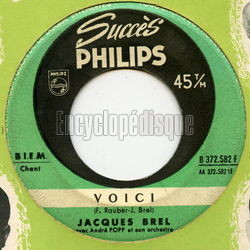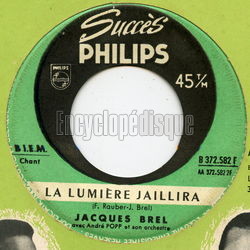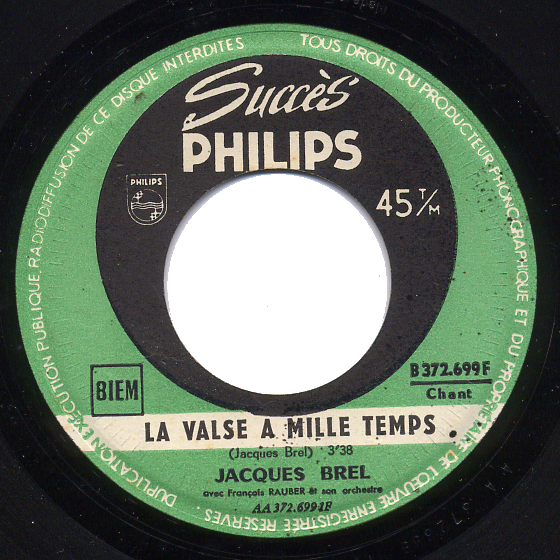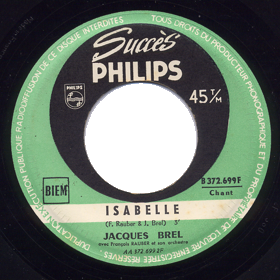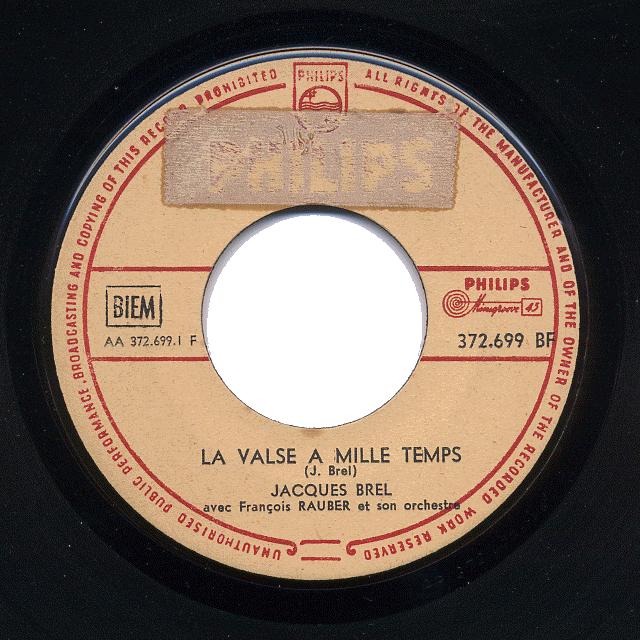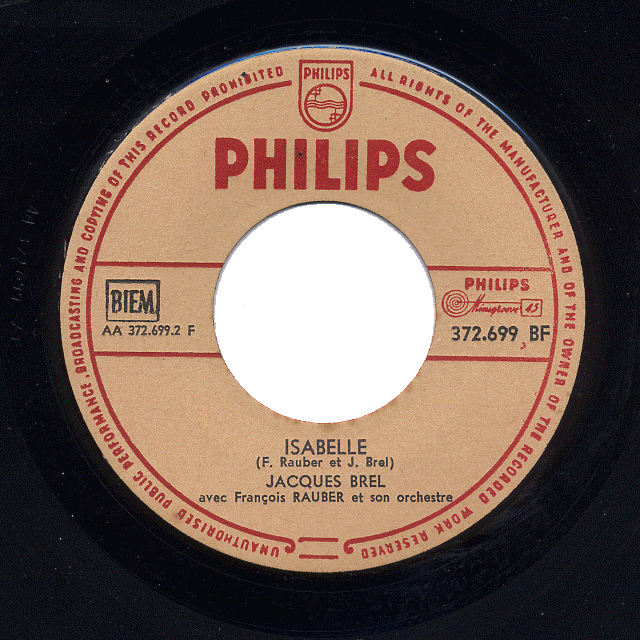1 Philips P 19.055 H, 1955
A. La foire 3:21
|
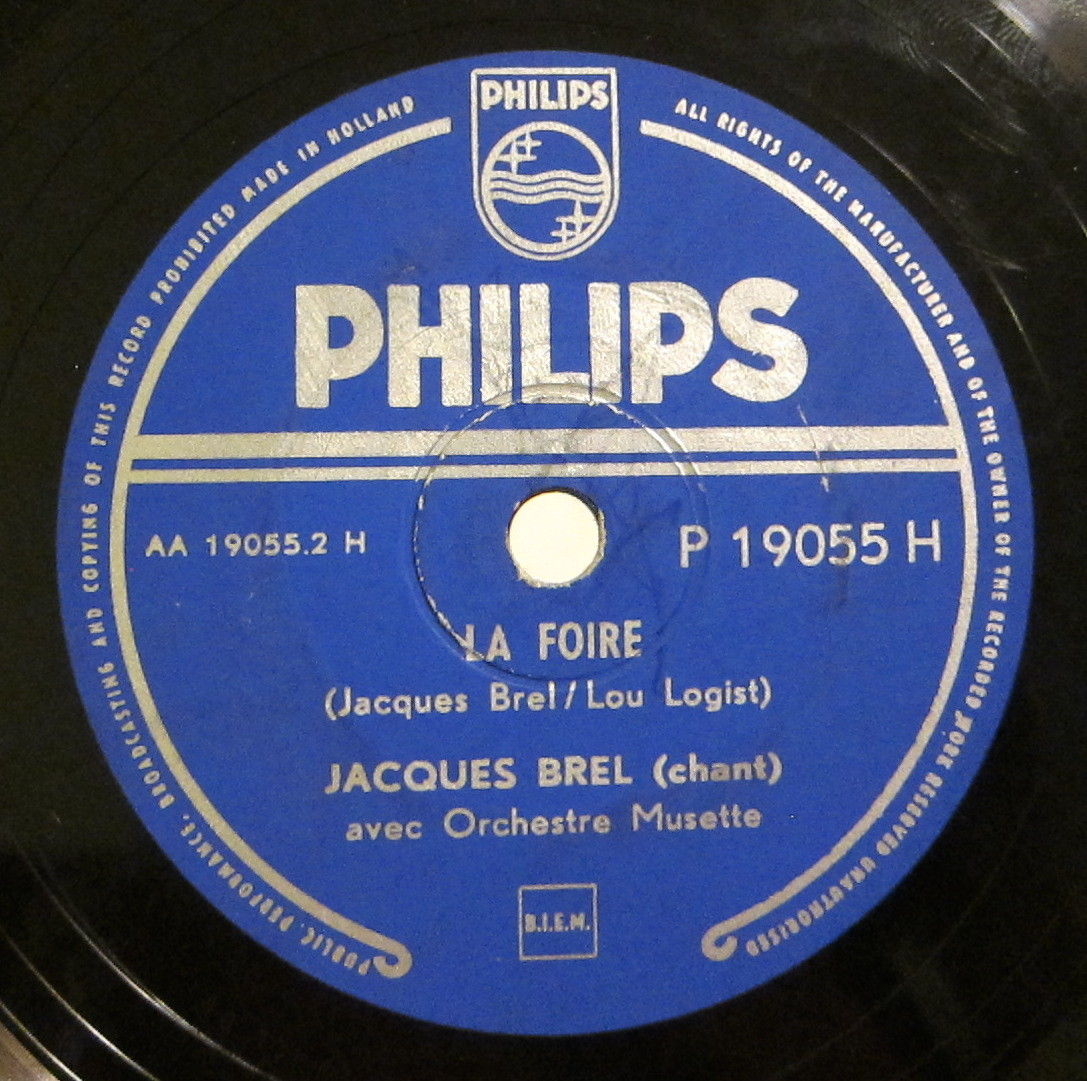 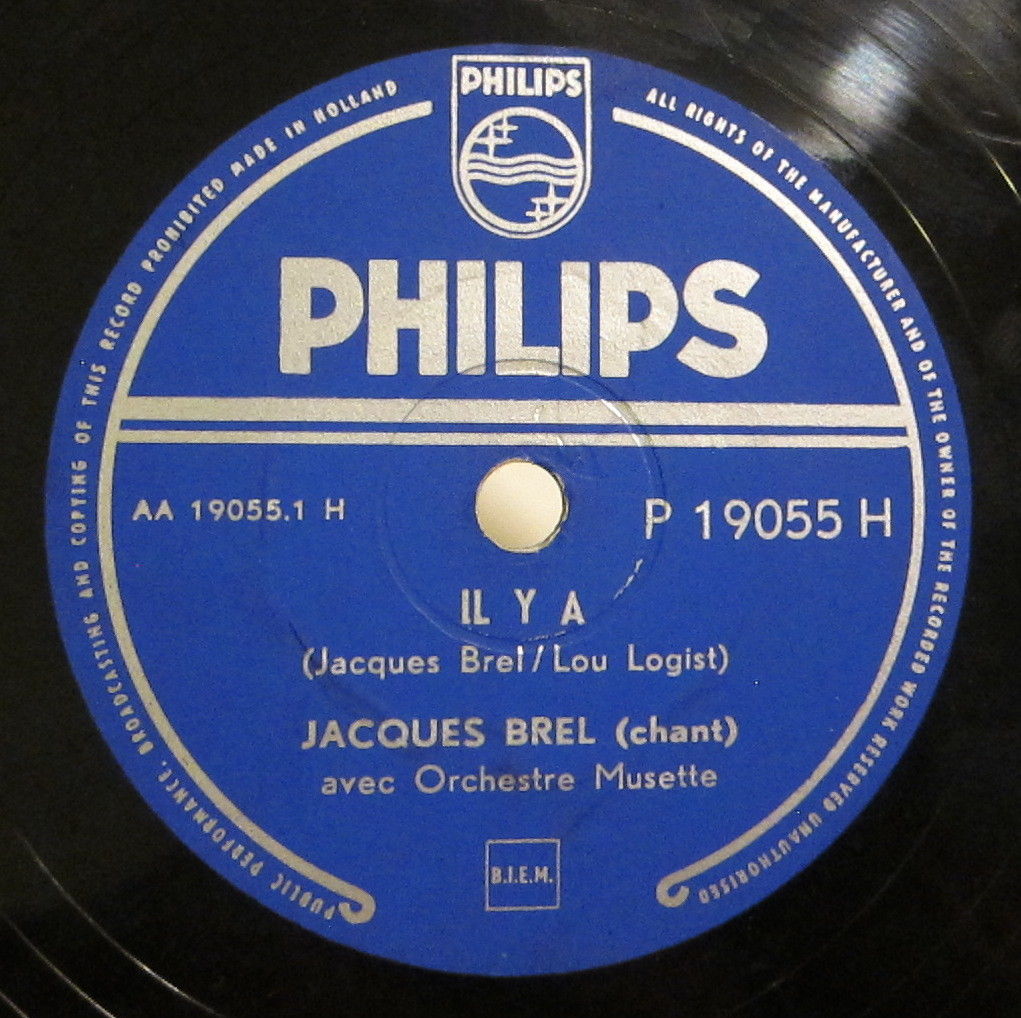
This is the #1 in Jacques Brel records' list because the songs featured were among the first he recorded, on 17 February 1953 in Bruxelles. In that session he recorded also Il pleut and Sur la place, still unpublished. However, this record was marketed in March 1955 and only in Belgium, and sold less than 200 copies. Therefore this is the most looked after and expensive collector's item. On September 4th, 2016 this record was sold at 2.810 euros on the most used website of auctions. I followed that auction, and got only the pictures that you see here. The two songs contained in it were first reprinted only in 1988, in the 10CD Intégrale Jacques Brel. |
2 Philips N 72.207 H, 1954
A. Il peut pleuvoir 1:46 |
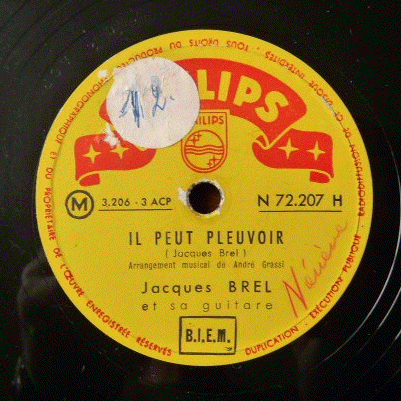 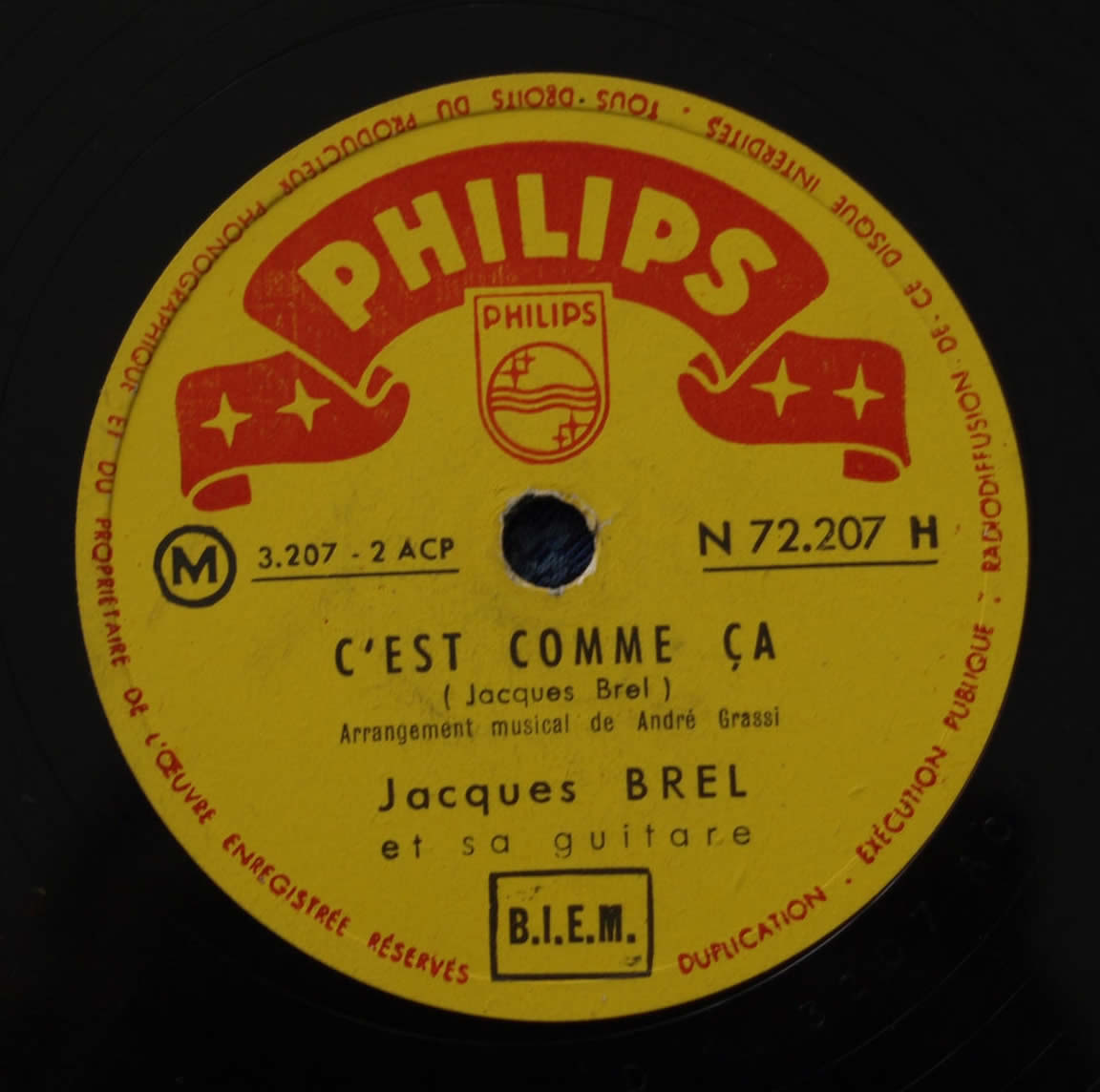 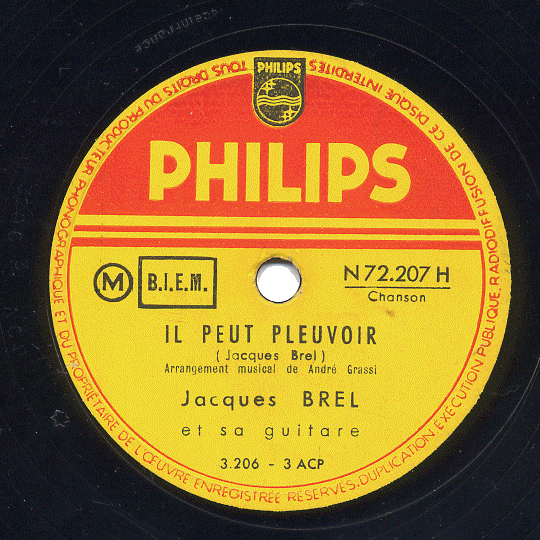 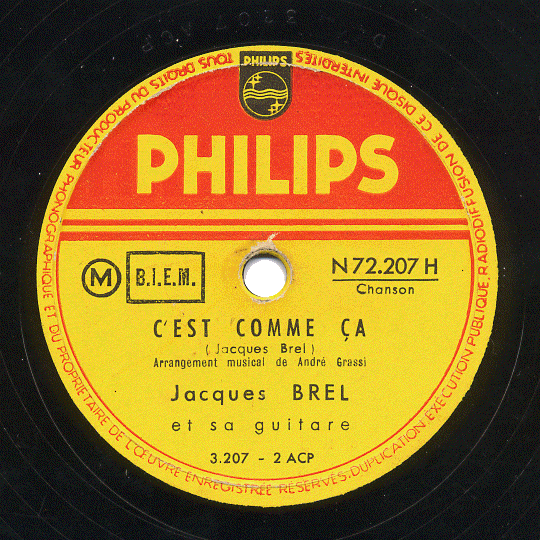 Starting from this second release, singles were printed to complement Jacques Brel's albums. The Philips company, c'est à dire his Parisian boss Jacques Canetti, believed in Jacques Brel and began to publish his songs in every format: single (at the time still on 78rpm), EP and album. Il peut pleuvoir/C'est comme ça was issued in the same year of the 1ére série album. The first two EPs and the third single were issued in the following year. But, as you can see from the pictures that I found on the web and courtesy of H.Hlawa, this single had at least one reissue. The 'ribbon' label should be the oldest, but I have no detailed info about the date of the reissue. |
3 Philips N 72.274 H, 1955
A. Les pieds dans le ruisseau #2 |
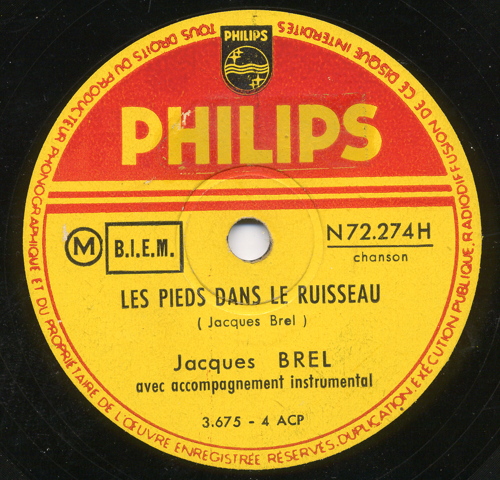 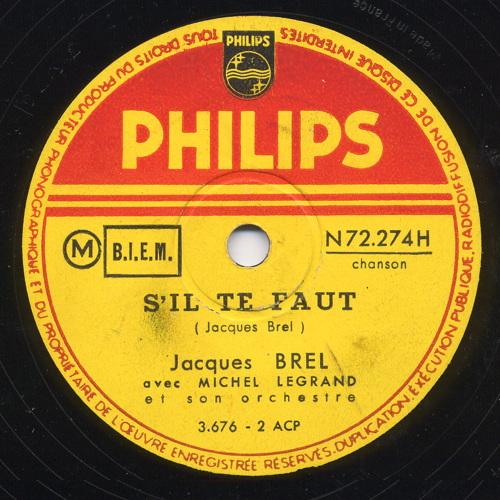 Third single and last 78 tours record for Jacques Brel. The pictures of this single are taken from my own copy.
It is still possible to find the second and third single on sale in the online auction sites for prices around 200€. I got mine at only 50€ and with no contenders because it has a deep scratch on one side. |
4 Philips B 372.366 F, 1956
A. Quand on n'a que l'amour 2:27 #1
|
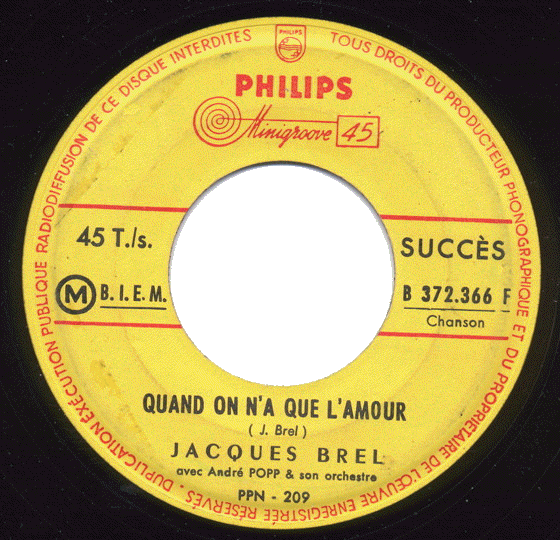 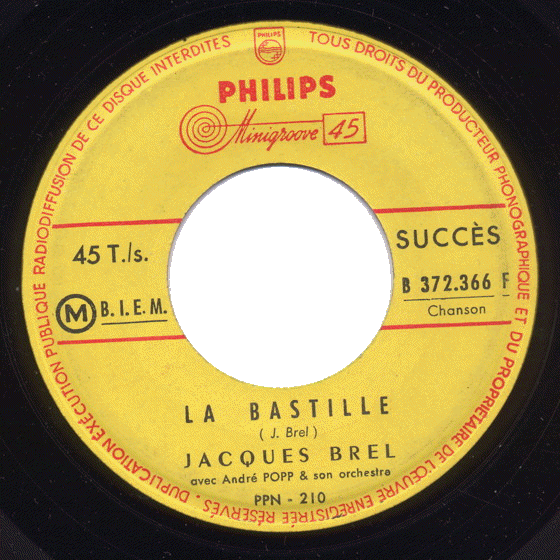 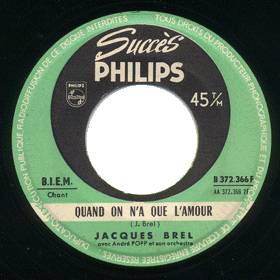 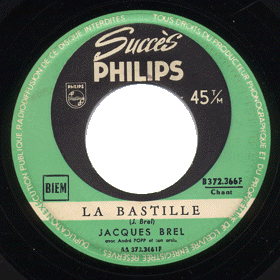
Starting from 1956, all singles were published in the 7" format and on 45rpm. For Brel, this new format started with the song that marked his first success, Quand on n'a que l'amour, the pacifist song that is nowadays too often used to commemorate the victims of terrorism. The single has been reissued some years later in the Succès série, showing the green-white-black label. |
5 Philips N 372.432 F, 1957
A. La bourrée du célibataire 2:25 |
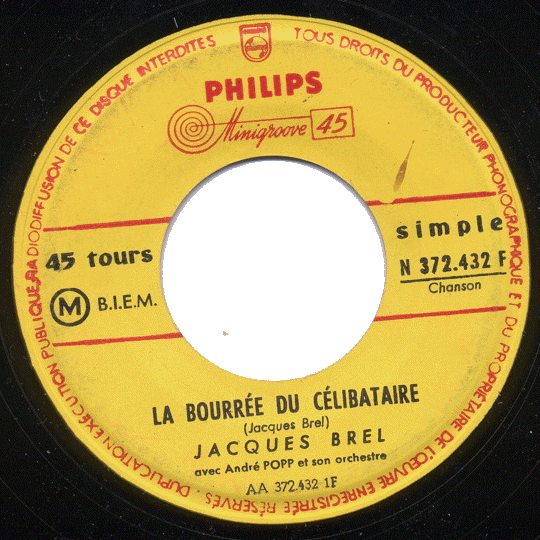 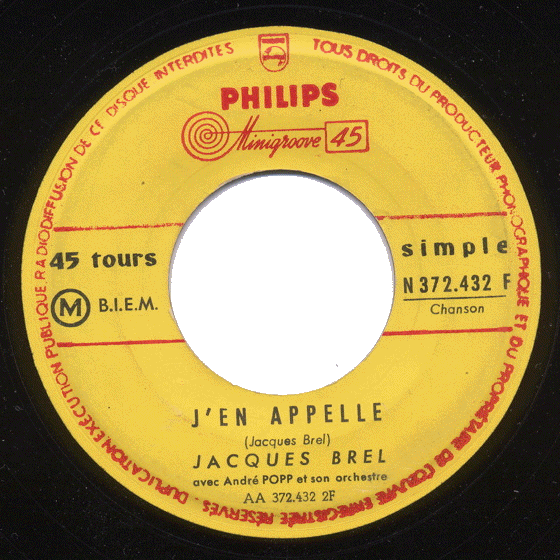
These songs come from the session of 22 March 1957, from which are taken all the songs included in the N°4 EP. L'air de la betise is the leading track of the EP, so clearly La bourrée du célibataire was considered as the second choice. J'en appelle was instead excluded from the EP and got a sort of recovery by the single. Whatever the choice was by Philips, this was the period in which Jacques Brel was still searching for his place, both musically and especially for his lyrics. |
6 Philips B 372.581F, 1958
A. Demain l'on se marie 2:35 |
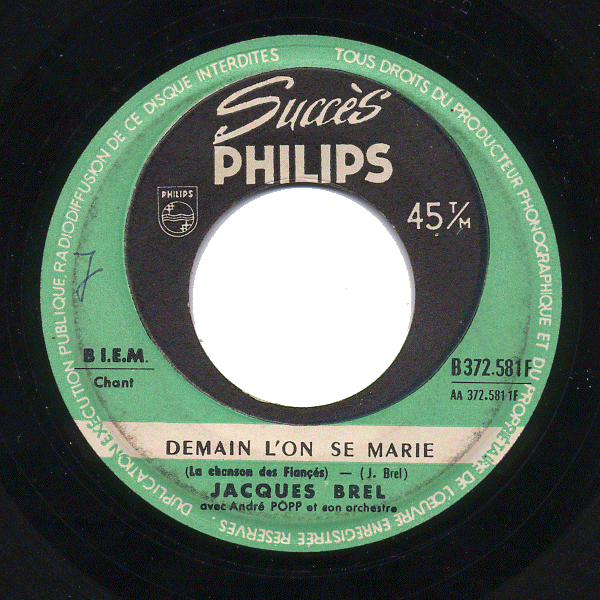 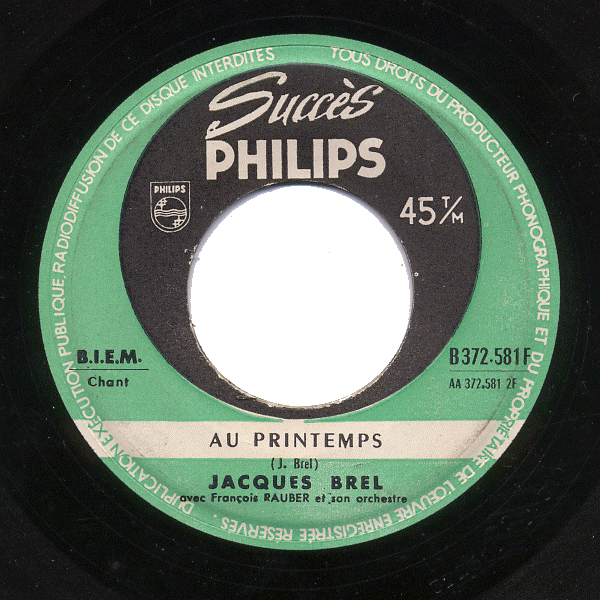
After one year from the previous recordings, a year that was filled with concerts all around France as a supporting artist to more renowned singers in the Philips team, and in which he learned a lot about the job of the chansonnier, in March and April 1958 Brel cranked out a dozen new songs. Although very far from the best of his career, these songs are very important because they witness the meeting between Brel and Francis Rauber, that was bound to be utterly important. Francis Rauber has been the arranger who finally succeeded in giving the right tone to the songs of Jacques Brel, and most importantly he convinced Brel to leave sa guitare and to perform on stage with his hands free. That was the birth of the phenomenal performer that we all know. |
7 Philips B 372.582F, 1958
A. Voici 2:48 |
As you may see by the watermark, I stealed these pictures from the excellent Encyclopedisque |
8 Philips 372.599 BF, March 1959
A. Il peut pleuvoir 1:46 |
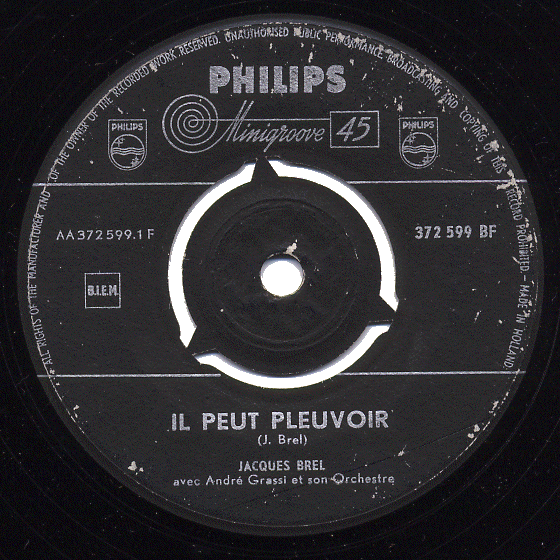 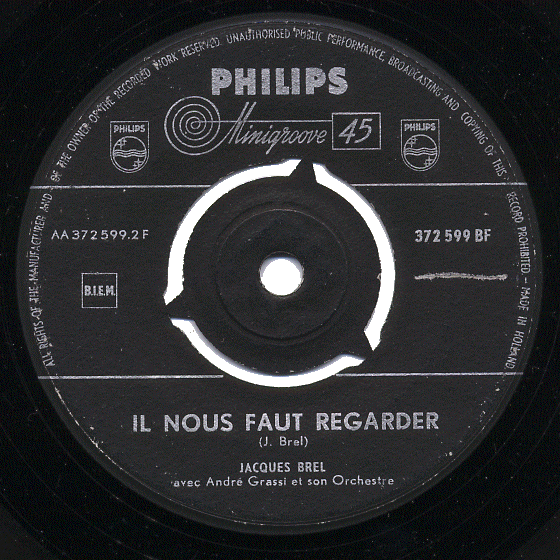
This is (it seems) the first Jacques Brel single ever published in Holland. The two featured songs are the same of the first LP N 76.027 R. So Philips started publishing Brel in her mother country digging out songs that were five years old. This should be the signal of a wider success gained by Brel at that time. |
9 Philips B 372.614F, 1959
A. Voir 2:24 |
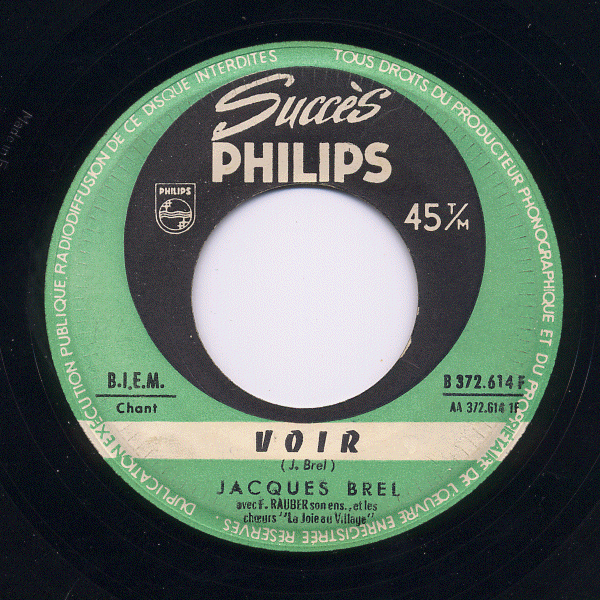 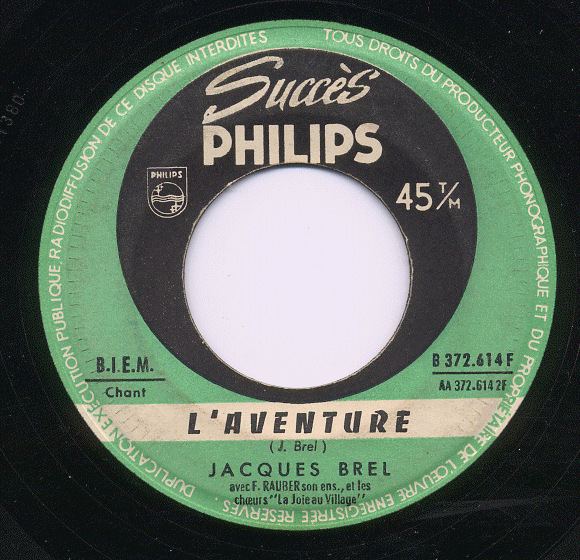
This is the last of the "abbé Brel" singles, marking the first years of his career. Just like those preceding, it is a hard to find record, certainly because its pressing wasn't large. These two songs, and especially L'aventure, were among the boyscouts' favorites: many covers can be found in the French Chorales recordings along all the '60s. As a matter of fact, it is maybe the most harmless song that Brel ever wrote. |
10 Philips B 372.699F, 1959
A. La valse à mille temps 3:38 #1 |
Only recently (November 2016) I discovered that this single was released not only in the Succès series but also with the 'regular' plain Philips label. So it still remains unanswered if all the French singles from #6 onwards were published in both versions. However, the sticker applied on face A may indicate that this was a promo release (see this page for a reference). |
11 Philips B 372.700 F, 1959
A. La colombe 3:00 |
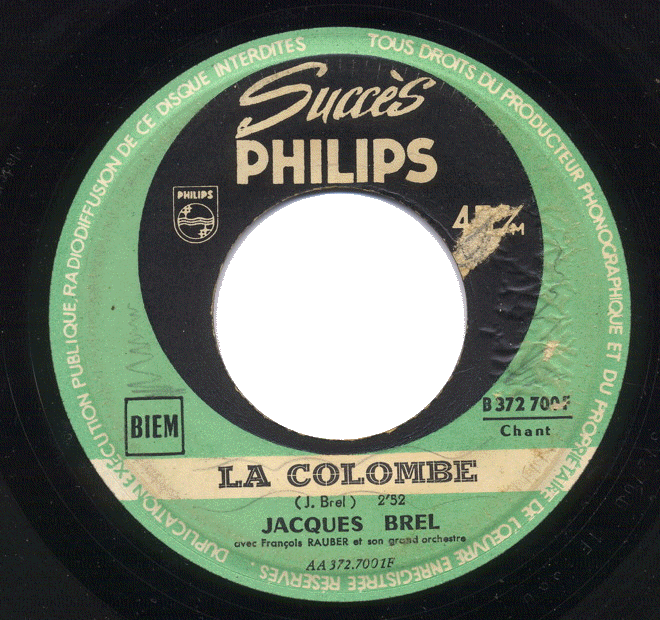 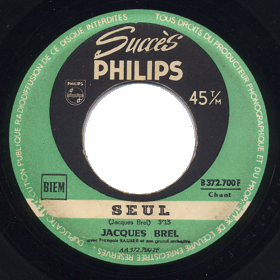 |
12 Philips 372.705 BF, 1960
A. Les Flamandes 2:25 #1 |
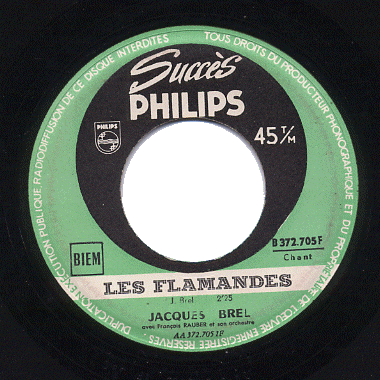 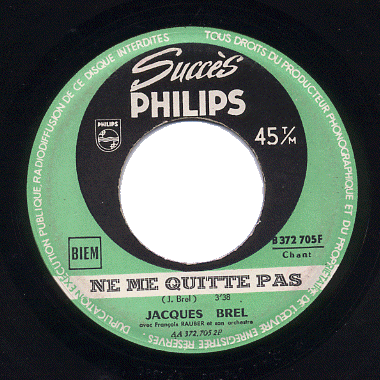 |
13 Philips 372.735 BF, 1960 A. La valse à mille temps 3:38 #1 |
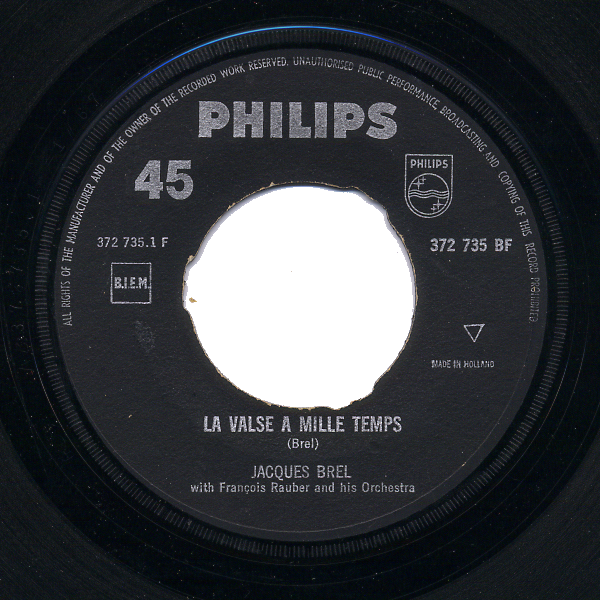 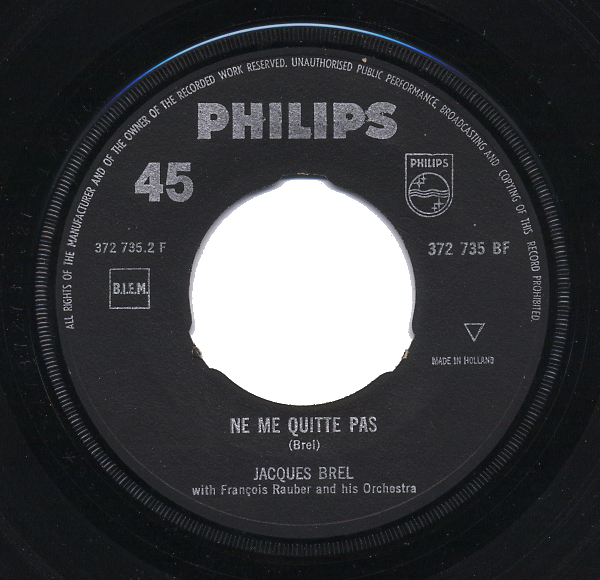
Dutch pressing |
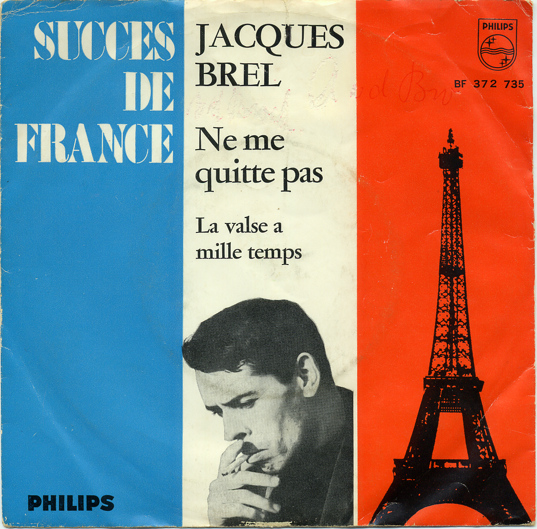 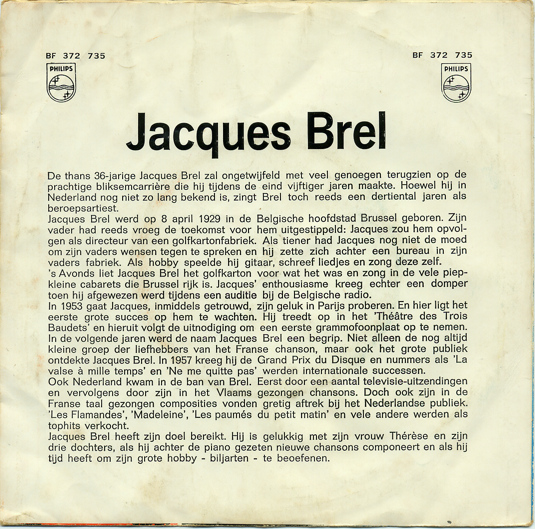 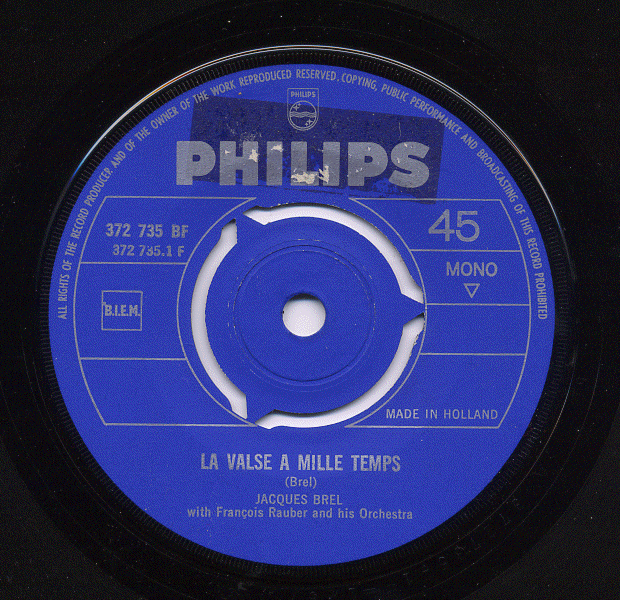 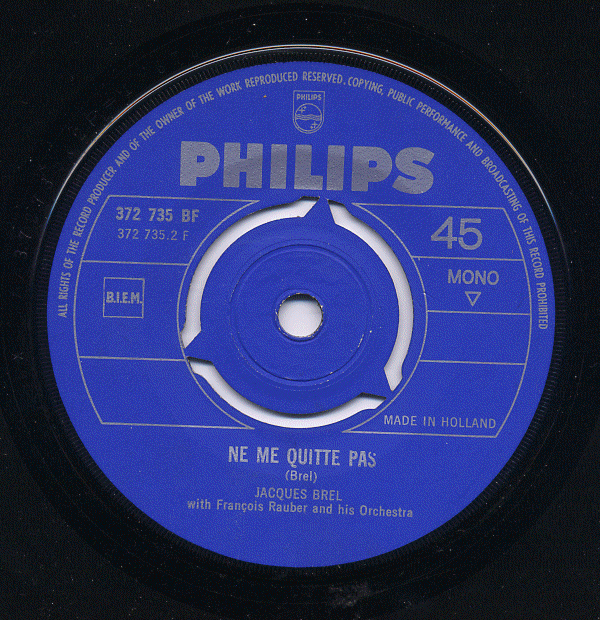 In 1965 Philips reissued three of his Jacques Brel's singles, with the same tracking but different labels and a proper sleeve. Two of them were included in the series 'Succes de France', which had standard covers: here we see the one with the French flag in the background and the Eiffel tower. The very nice thing about these singles is that they had liner notes on the B-side, quite like the LPs of the '60s. The bad thing of course is that they are written in Dutch. |
|
14 Philips B 372.852 F, 1961
A. Clara 3:01 |
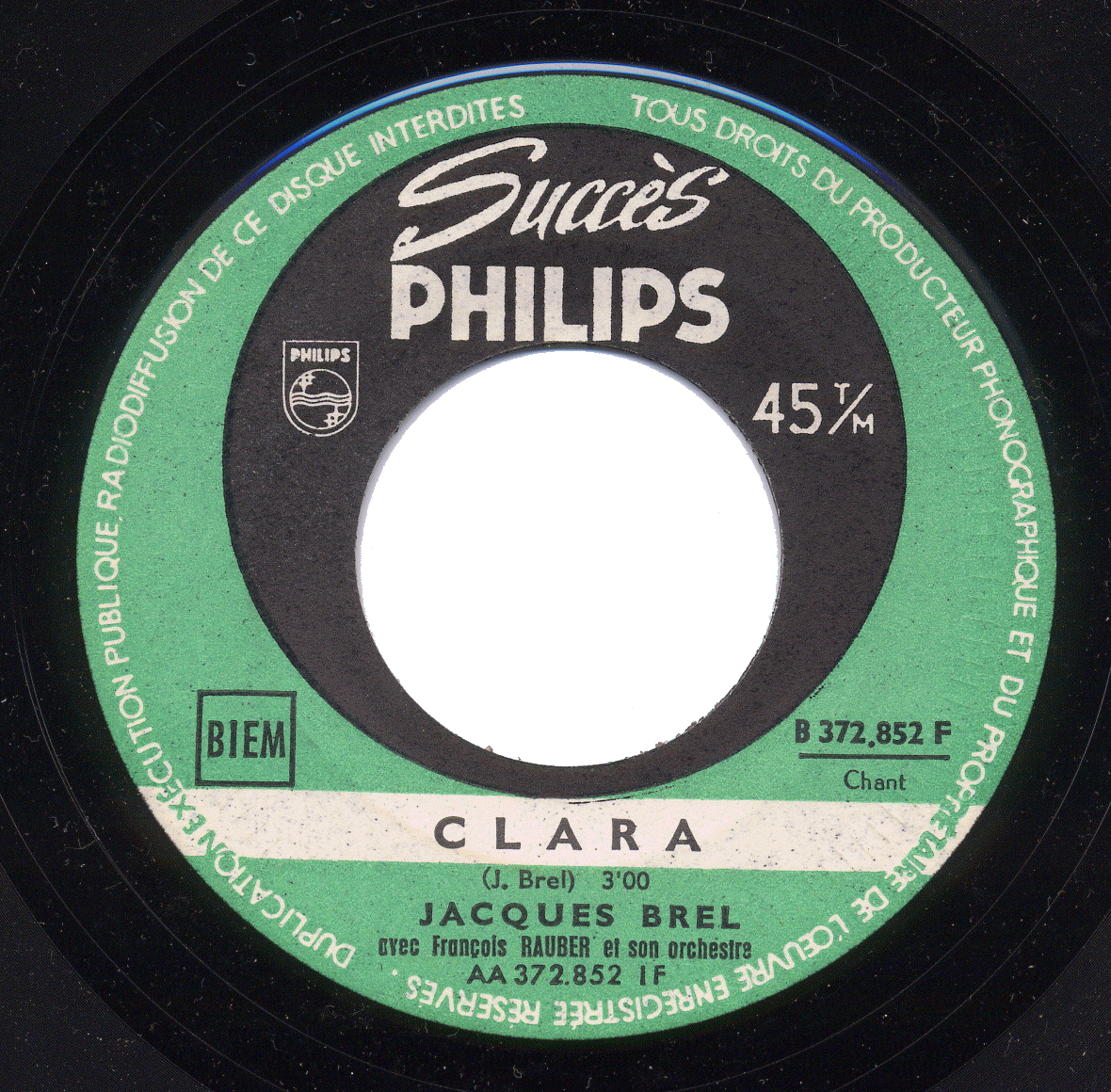 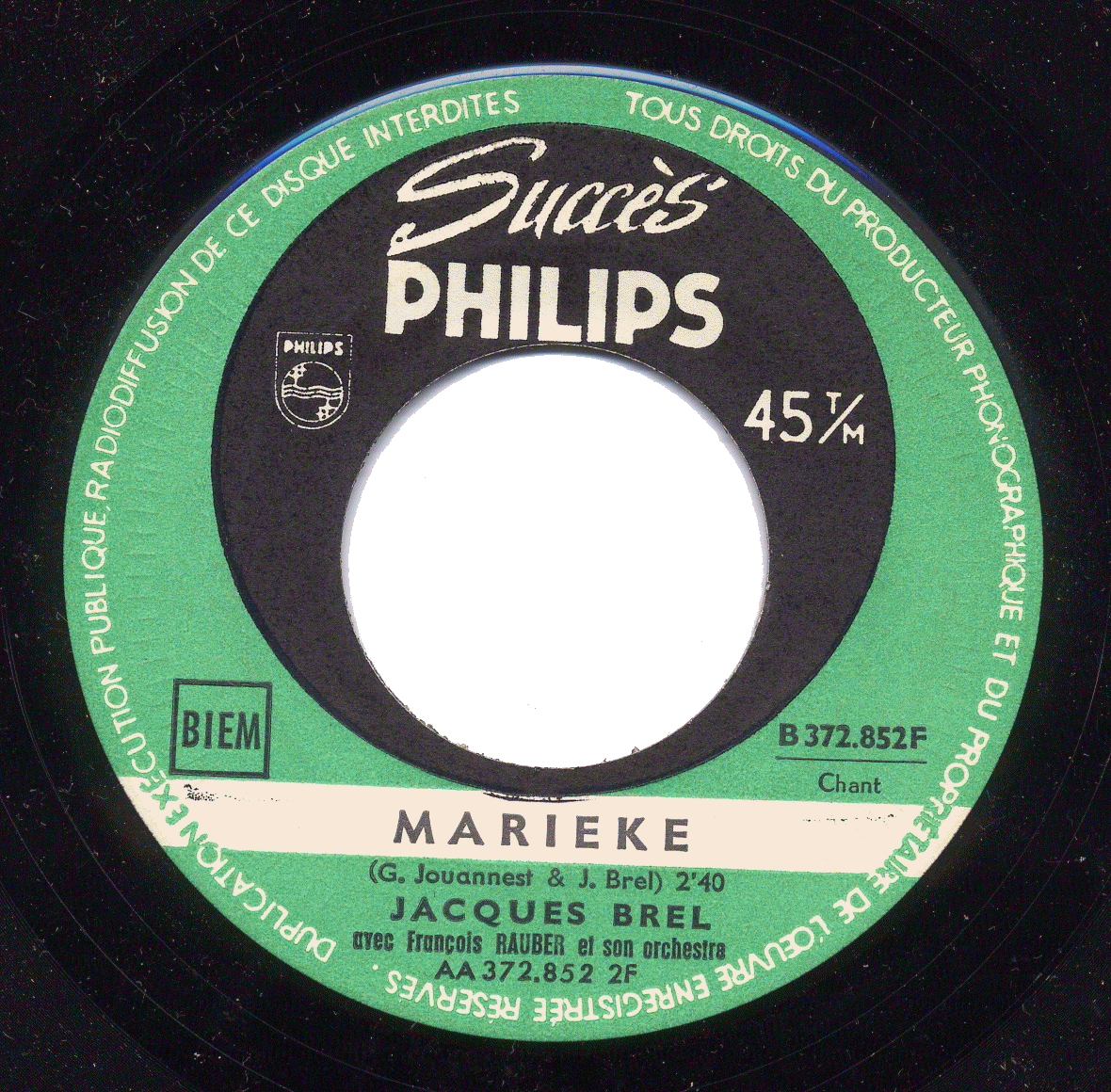
One thing that I never understood is why both Philips and Barclay sometimes published singles that had on the B-side one of the most beautiful song of Jacques Brel, and on the A-side one of the most forgettable. Of course, beauty is in the ear of the beholder, but I want to find somebody who appreciates Clara most than Marieke. But in the end my argument is indeed quite trivial, because those singles were made for juke-boxe use and so it didn't really matter which was the A or the B-side... |
15 Philips B 372.853 F, 1961
A. Le moribond 3:05 #1
15/1 Philips JF 328 038, 1965 A. Le moribond 3:09 #1 |
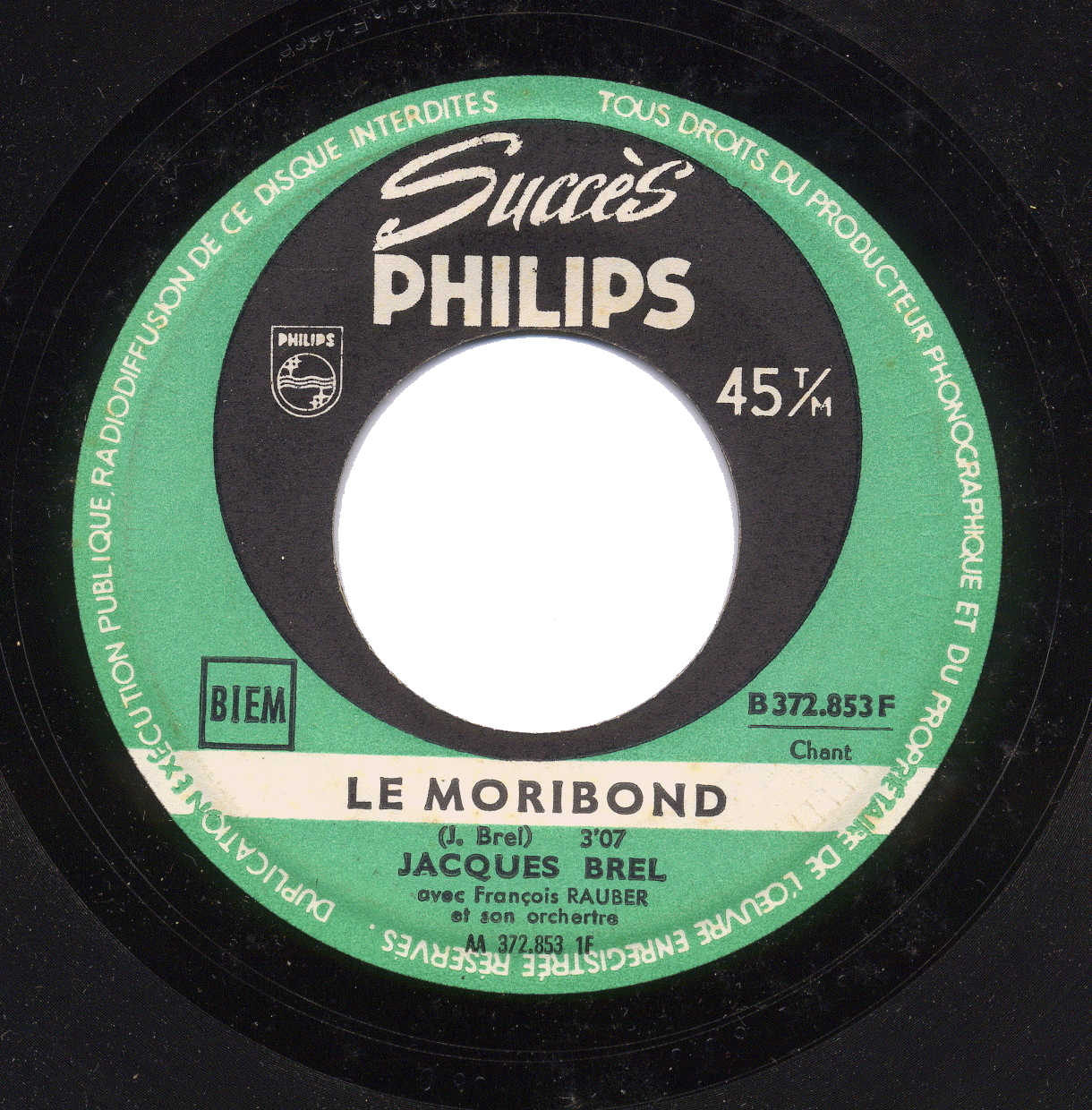 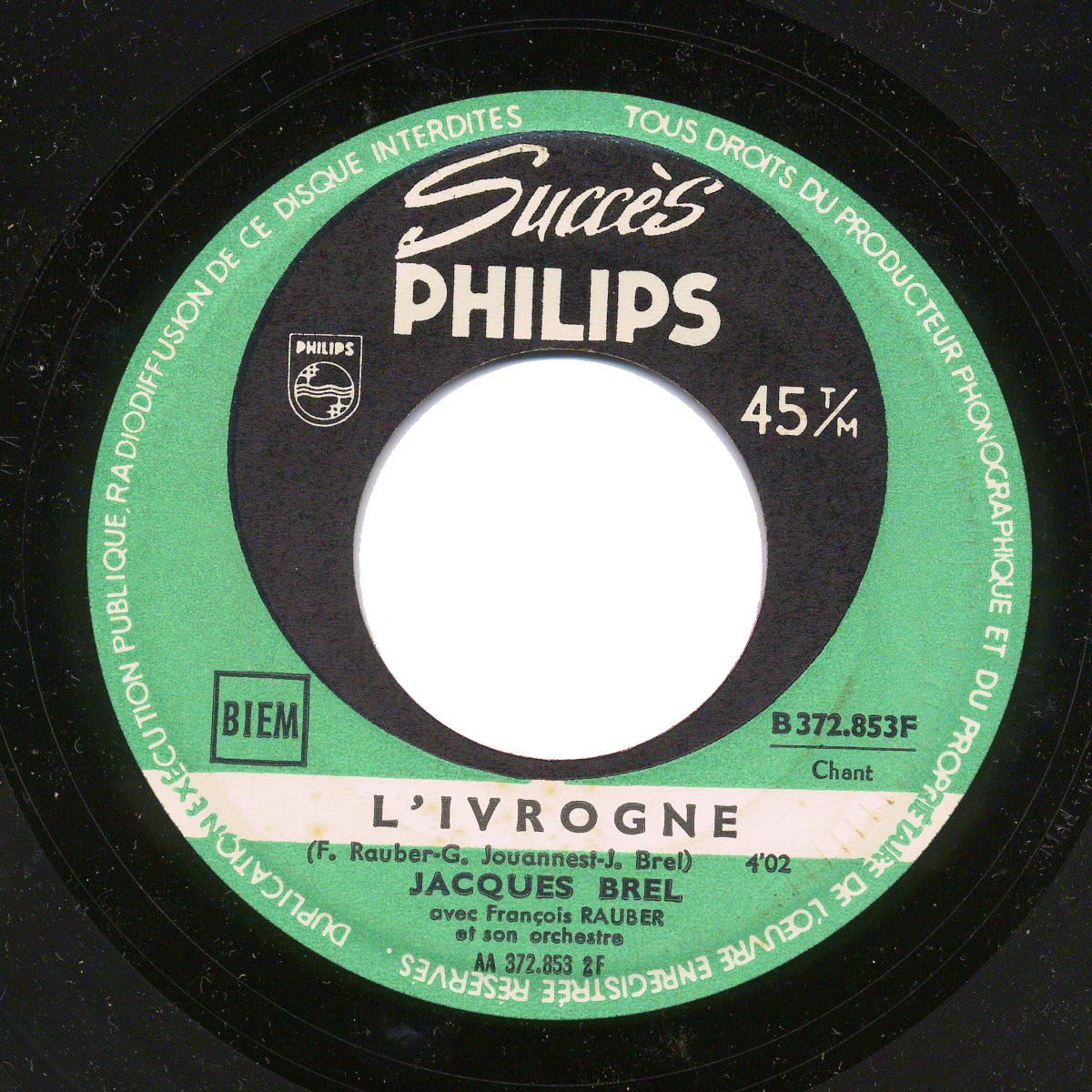 |
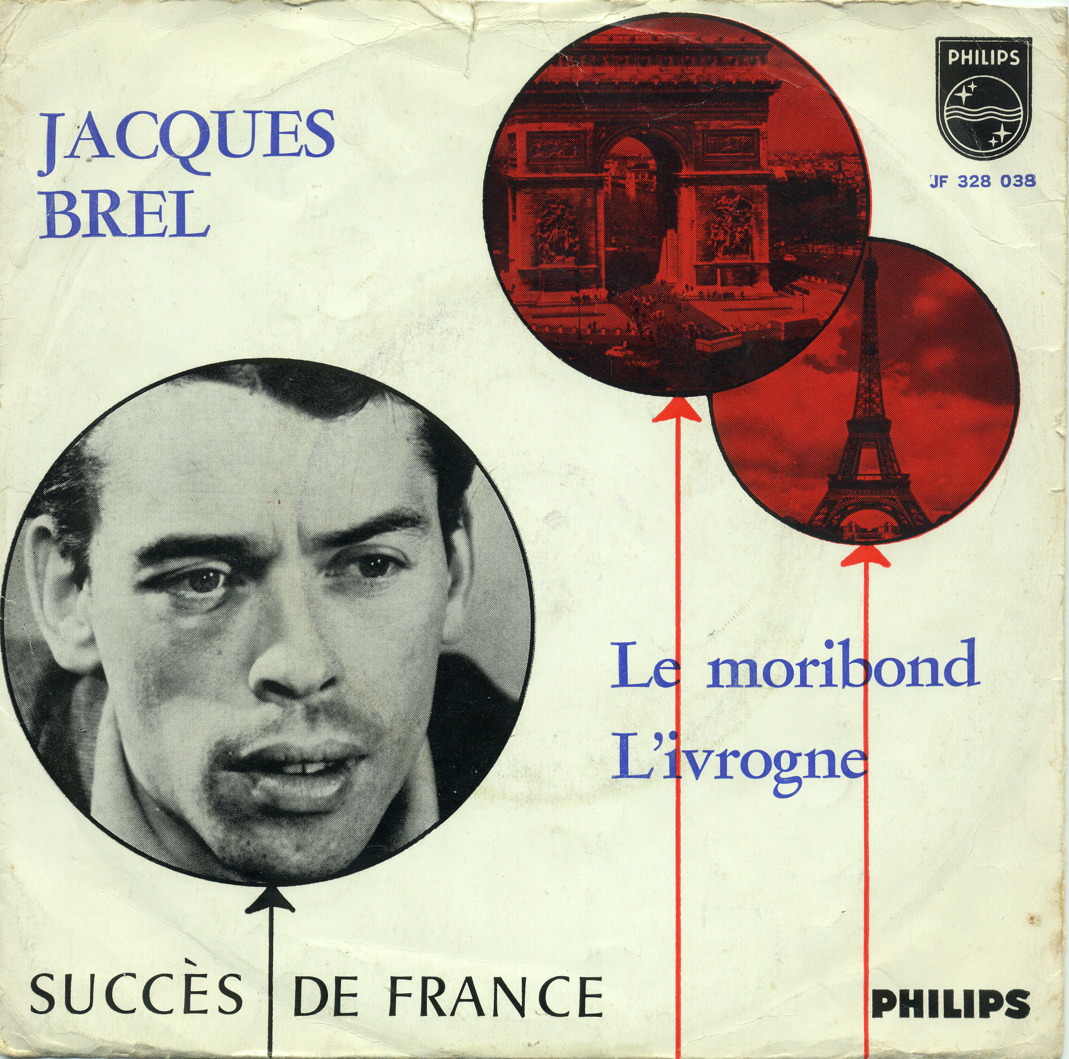 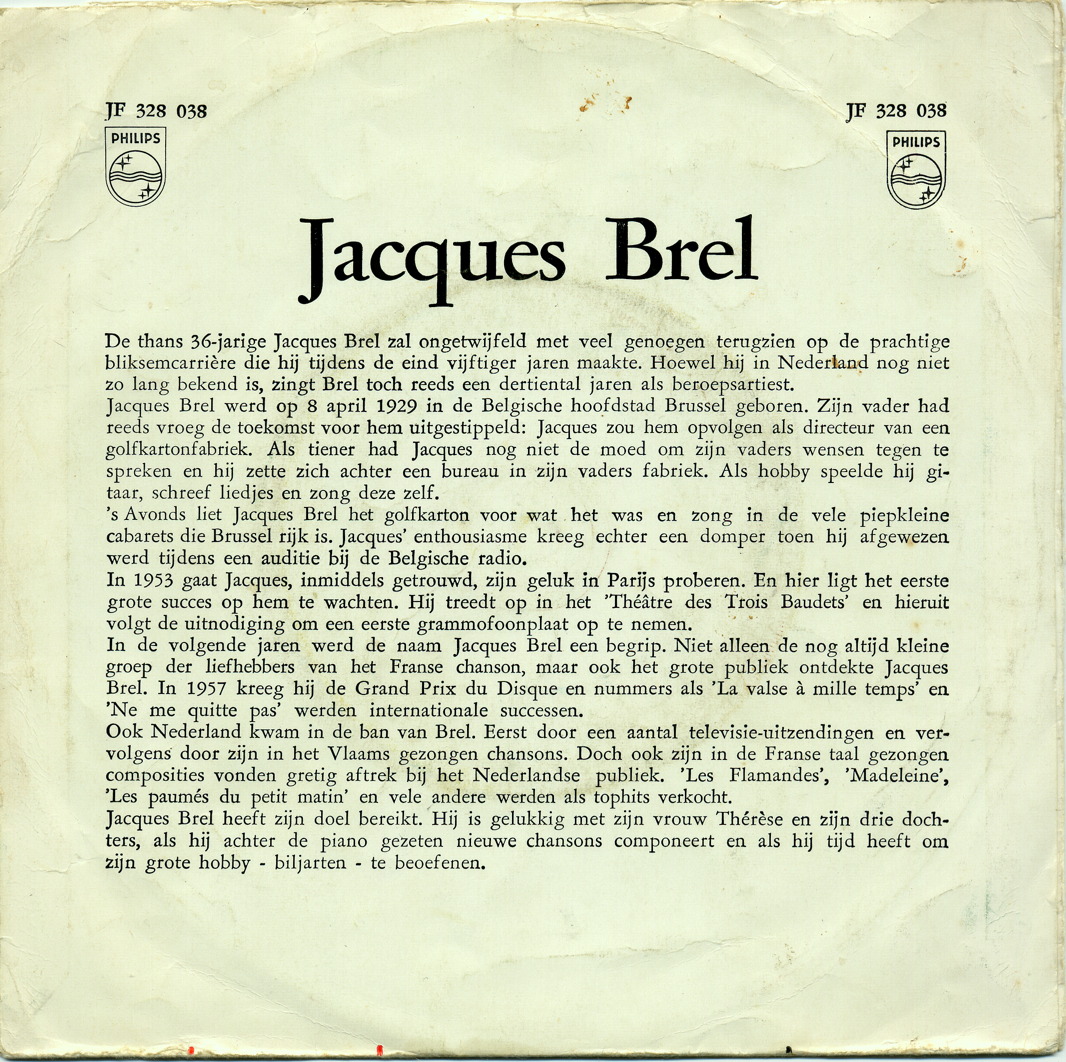 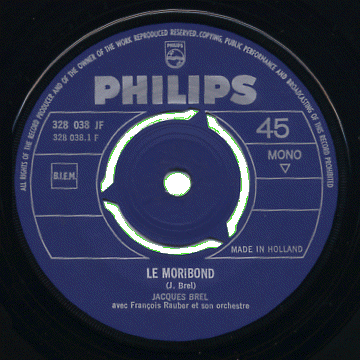 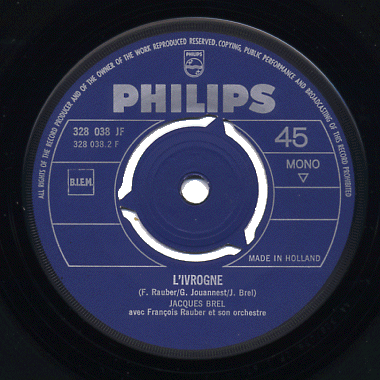 The second type of covers of the 'Succès de France series' is the so-called balloon cover. What changed from single to single was of course the picture of the singer, here inscribed inside one of the balloons. |
|
16 Philips B 372.854 F, 1961
A. On n'oublie rien #1 3:08 |
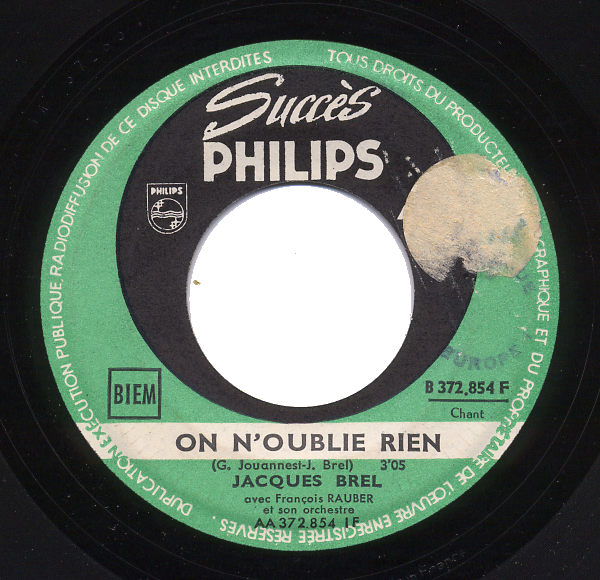 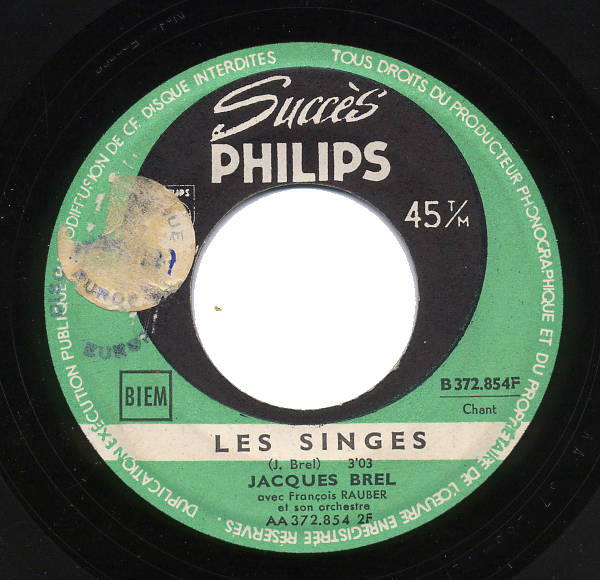 |
17 Philips 372.858 BF, 1961 A. Marieke (vlaams) 2:52
17/1 Philips B 328.025 JF, 1964 A. Marieke (vlaams) 2:52 |
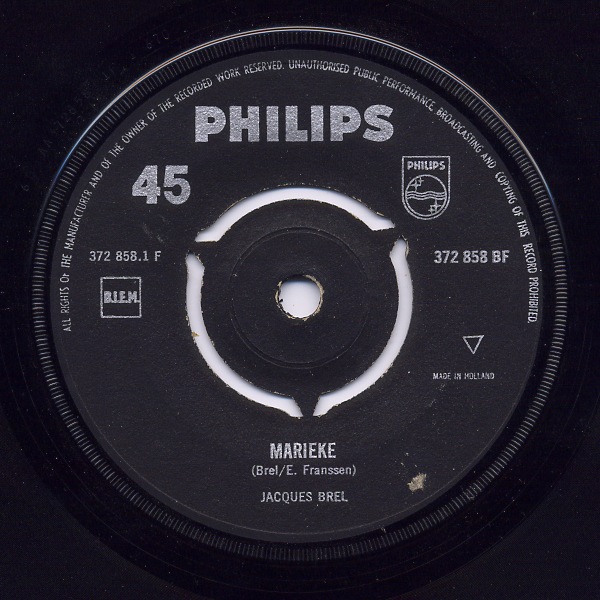 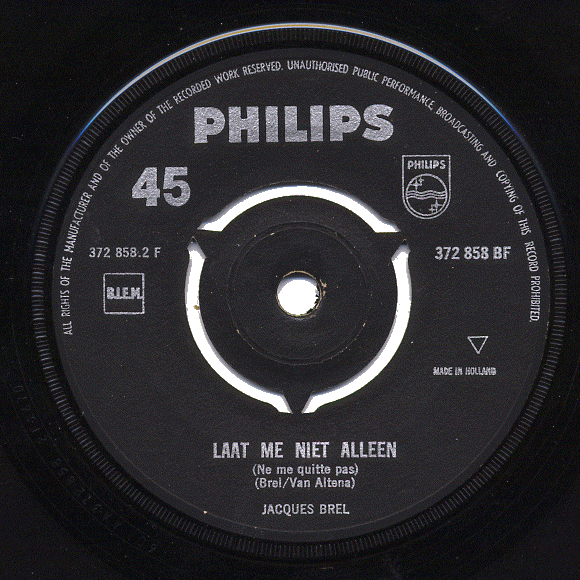 |
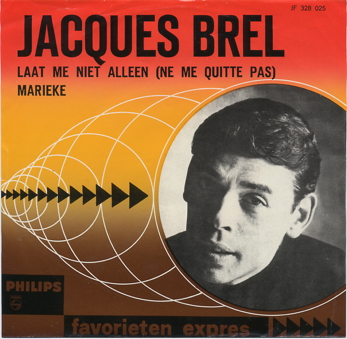 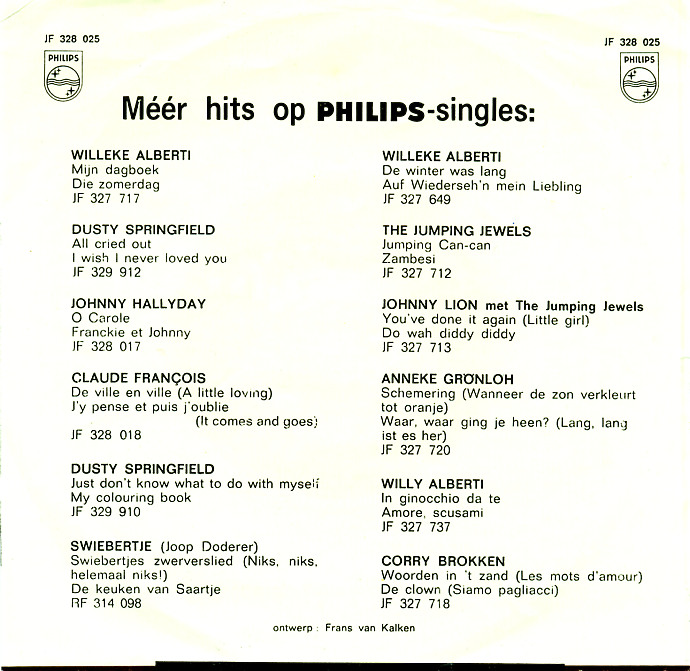 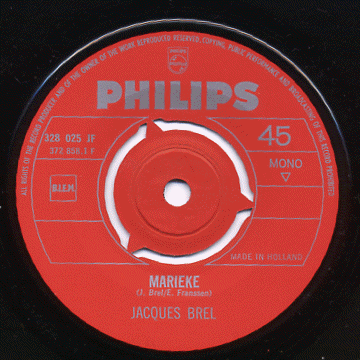 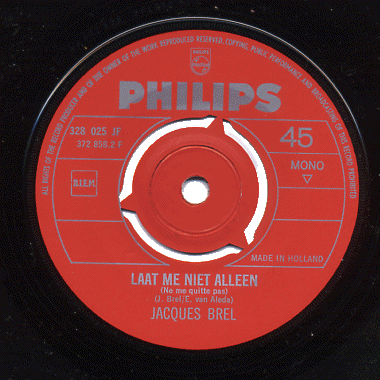 |
|
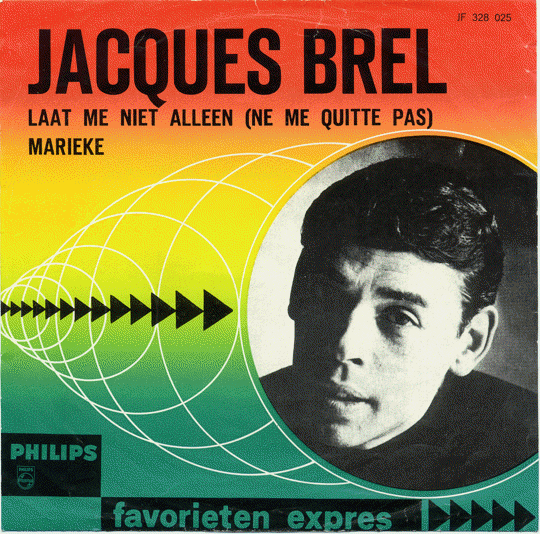 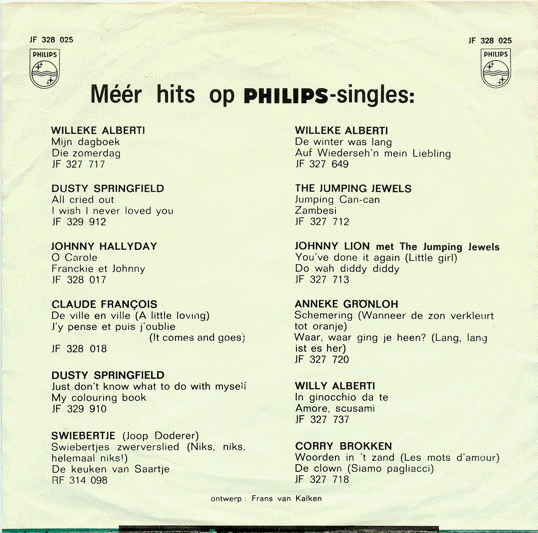 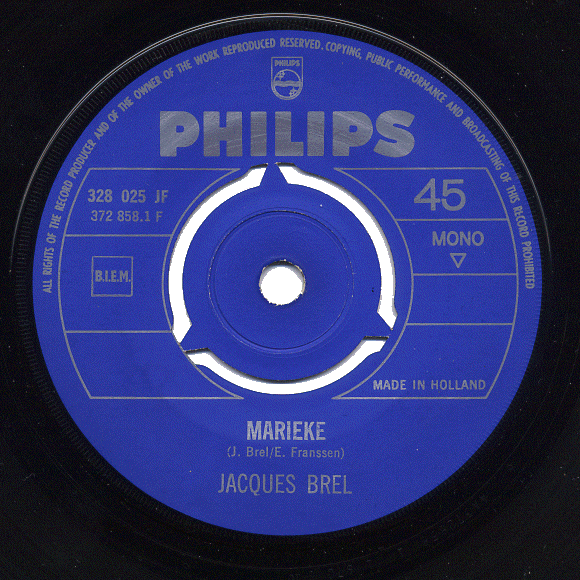 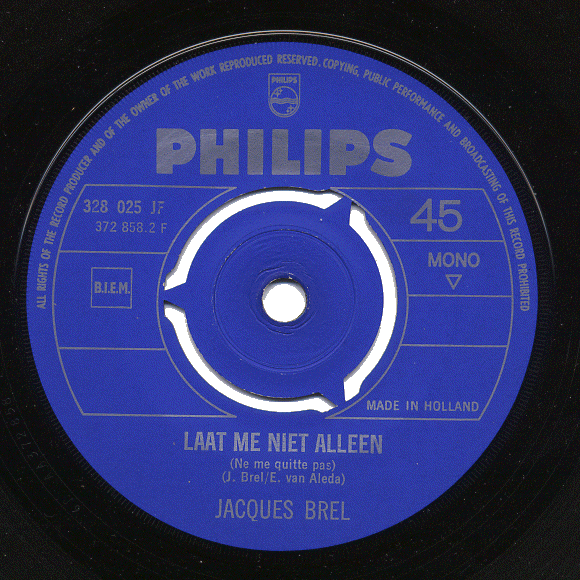
The third reissue by Philips was published in the 'favorieten express' series, which was evidently less luxurious than the 'Succès of France', for it had just publicity on the back cover. Two different sleeves may be found, one with colors ranging from red to brown, the other with colors ranging from red to green. Inside the first one I found the red-label disc, inside the second one the blue-label disc, so let's assume that they were paired in this way. I like very much the cover design, with those circles and arrows recalling the radio waves. It makes me think to the broadcast's end of transmission theme that I used to see when I was a child. It was a great sign of modernity/technology/progress at that time. |
|
18 Philips 372.859 BF, 1961 A. De apen |
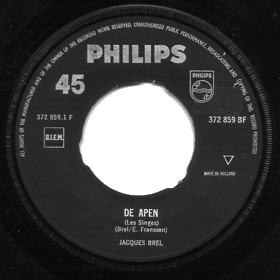 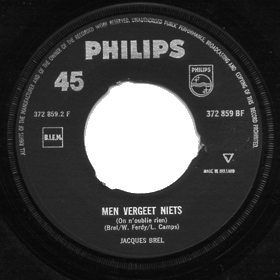 Made in 1961, the 372.858 and 372.859 singles contained Dutch translations of four Brel songs. These were the first four that he recorded, which were to be followed by other four in 1965. Only one of these first songs was written by Ernst van Altena, but since it was Laat me niet alleen (Ne me quitte pas), it paved the way to van Altena to became the 'official' translator of Brel songs in Dutch. Also for quite the same reason, the 372.859 single is much more difficult to find than its companion, because it doesn't contain songs that were as widely successfull. |
19 Philips B 372.928 F, April 1962
A. Les paumés du petit matin 3:50 #1 |
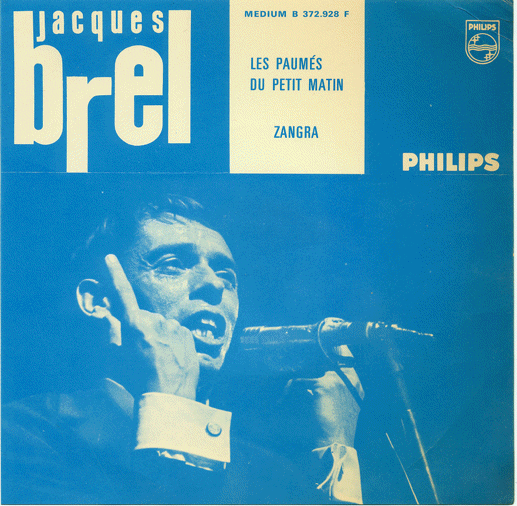 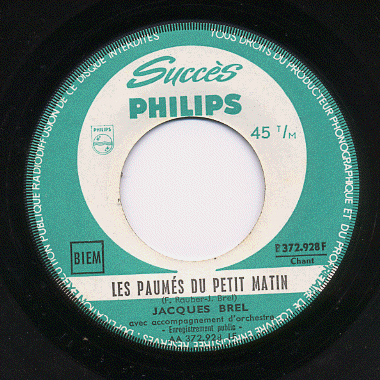 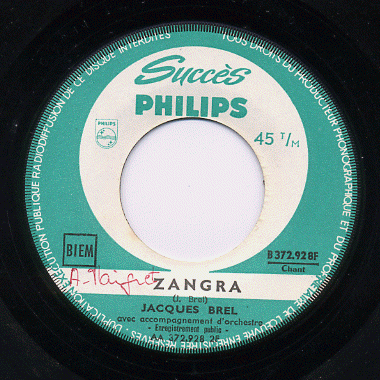
In February 1962, Brel refused to extend his contract with Philips, and a few week later was to sign with Barclay. However it was agreed that all the excerpts from the Olympia concert recorded at the end of October 1961 would be published by Philips. Three singles were then taken from the concert, those numbered 372.928-929-930. At the beginning of March 1962, Brel was already recording his new songs with Barclay, even before having signed the contract. Therefore it happened that in April 1962 a bunch of new records (singles, EP and LP) from both Philips and Barclay filled the racks of music stores, for the joy (or the confusion?) of followers. Interestingly, the singles also had a sleeve, the first (and only) of Brel singles published by Philips. It consists of a single monochrome unfolded sheet, with the same photo used for one of the two sleeves of the 12éme série Philips 432.766 BE EP. The back of the sheet is pure white, unwritten. Difficult to say whether this is an original or a reissue, a French or a Dutch release; I would say it is an original, because since then singles' sleeves had a more sophisticated format. I found them for two of these singles, so it should be guessed that they were produced for all the three singles taken from the Olympia 61 concert. They're actually very rare to find. |
20 Philips B 372.929 F, April 1962
A. Les bourgeois 2:35 #1 |
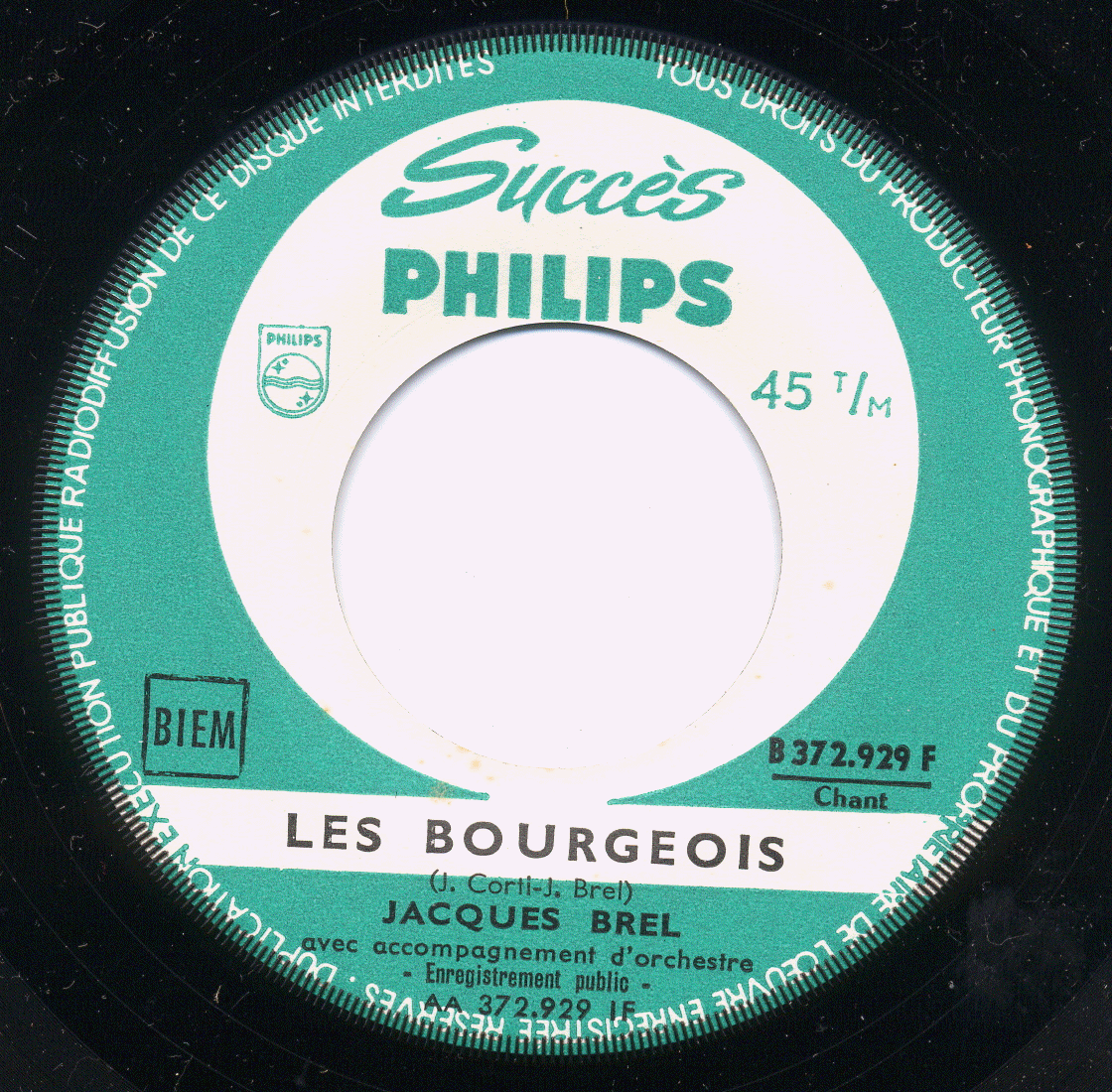 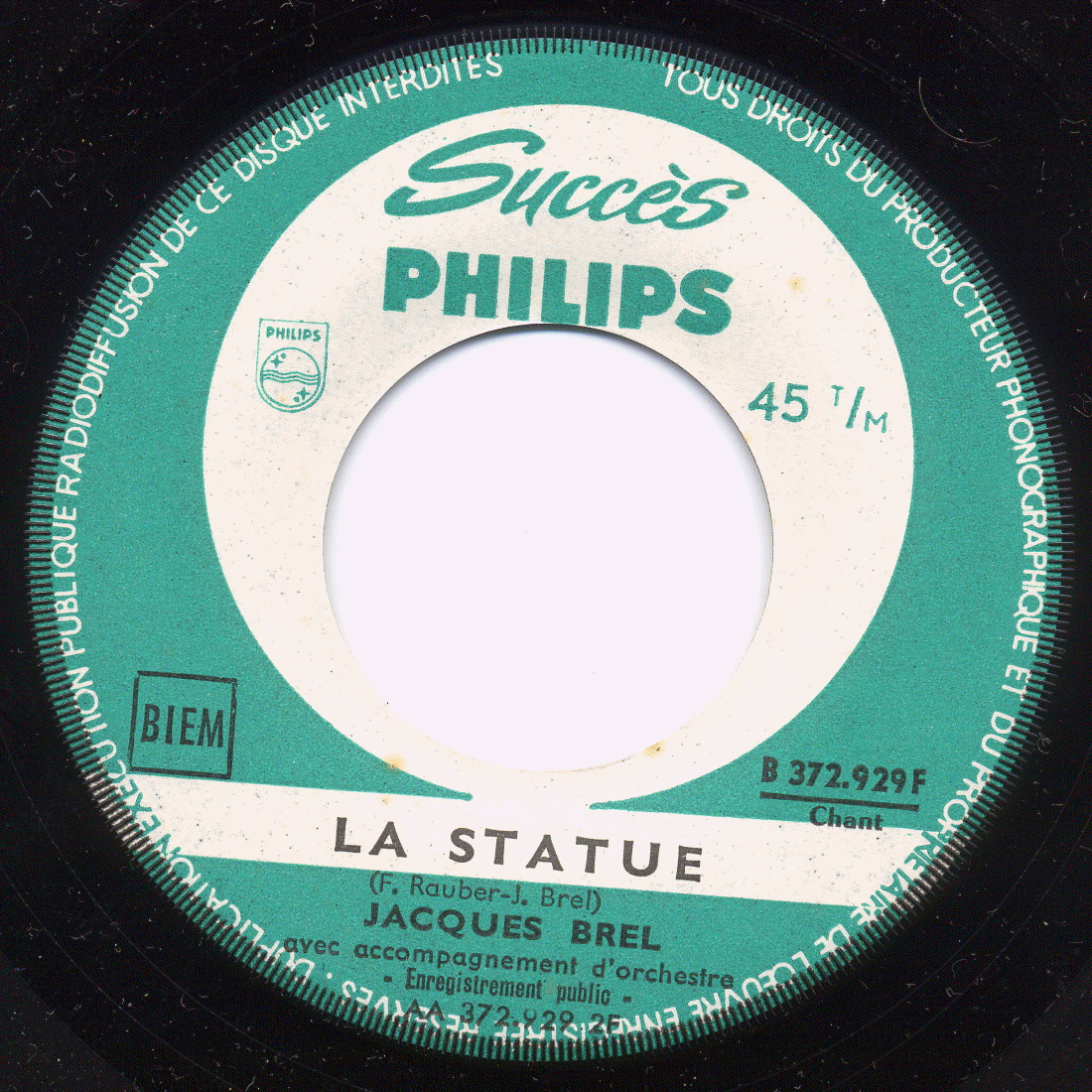 Especially memorable from the Olympia 1961 concert is the first execution of Les bourgeois to a wide live audience. Les bourgeois wasn't released on disc yet, therefore the audience of the Olympia was unaware of it. Brel obviously knew that and sang the song with a particular transport. When listening to the live recording, it is clearly perceptible the astonishment provoked in the audience by the refrain Les bourgeois, c'est comme les cochons... when it was heard from the first time. An applause spontaneously started from the audience, and this was repeated at the second repetition of the refrain. |
21 Philips B 372.930 F, April 1962
A. Madeleine 2:55 #1 |
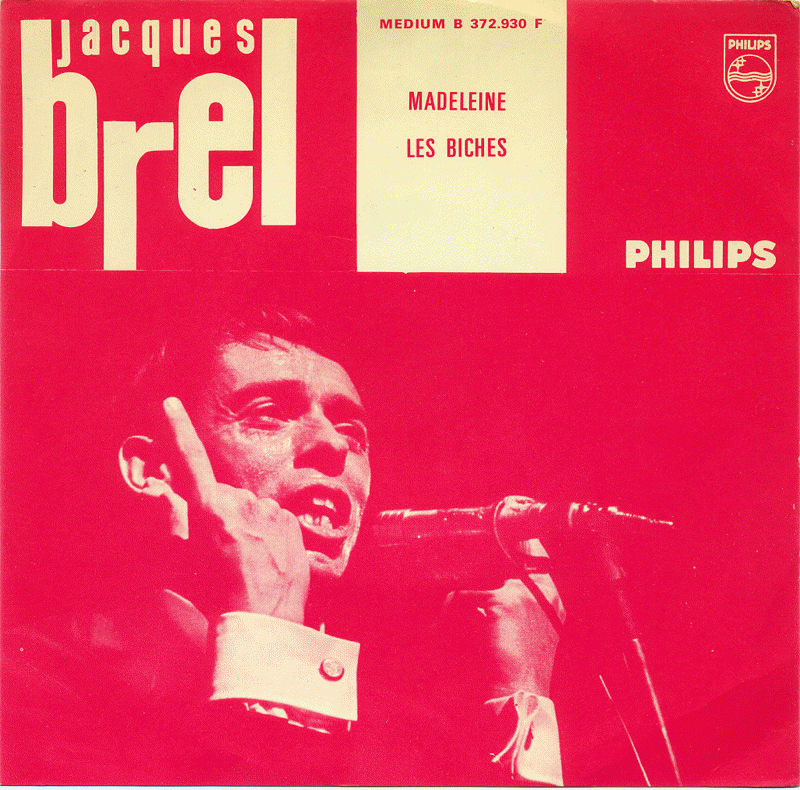 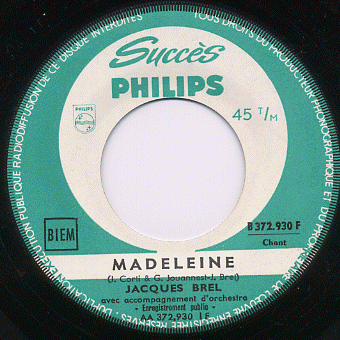 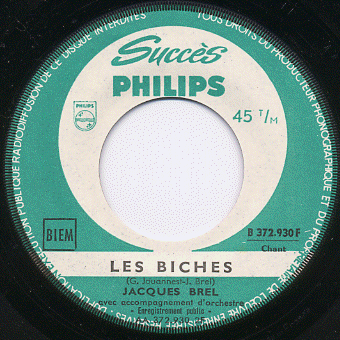 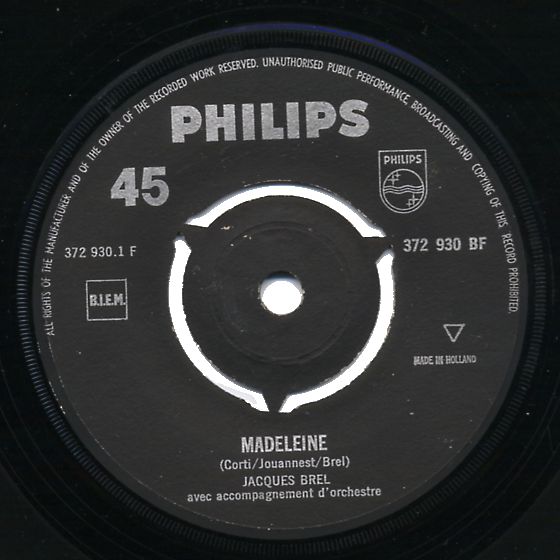 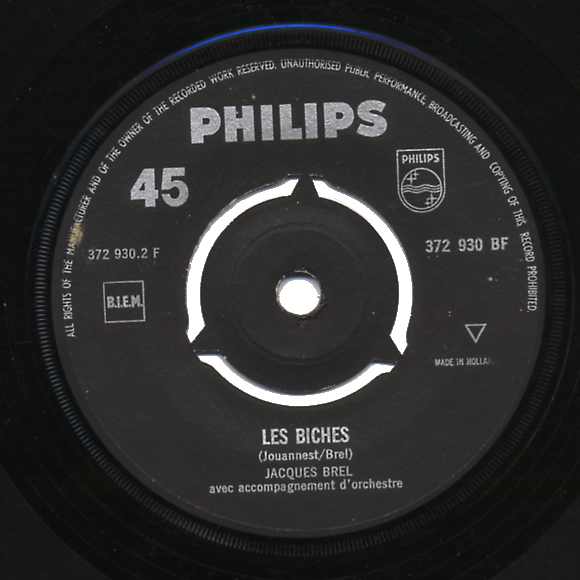
The Olympia 1961 concert was undoubtedly a turning point in Jacques Brel's career, and I consider it one of the greatest results in Jacques Brel opus, maybe even better than the 1964 concert. What makes the difference with the 1964 recording is the sense of a great new big thing that was happening. It can be felt in the energy that was spread by Brel and in the response of the audience, that was hit hard for the very first time by such a performance and replied enthusiastically. Of course the Olympia 1964 was a great event too, but it was far more expected. On both sides, I should say. Madeleine is another representation of what I tried to say. Among the three Olympia singles, this is the only one of which I found also the Dutch release, with the characteristic black label. Thus,it is likely that the other two singles also had this release. |
22 Philips 372.970 BF, 1962 A. Le moribond 3:09 #1 |
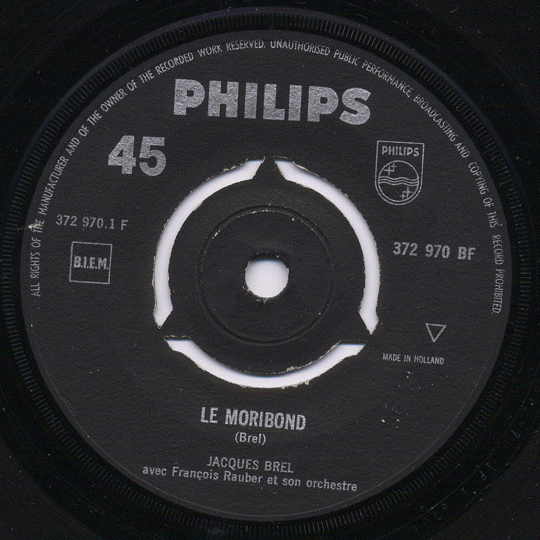 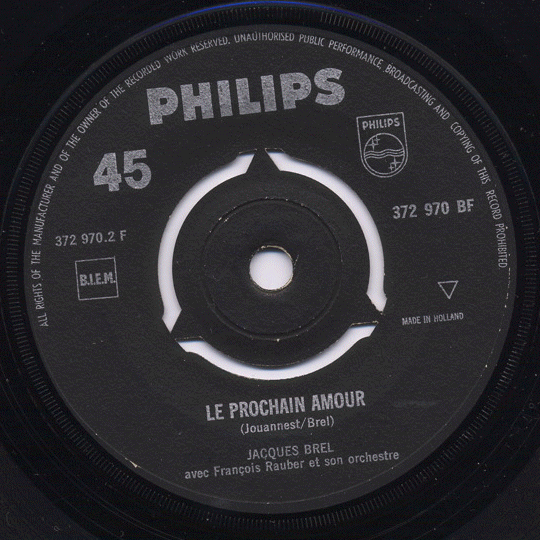 |
23 Philips 372.990 BF, 1962 A. Les Flamandes 2:38 #1 |
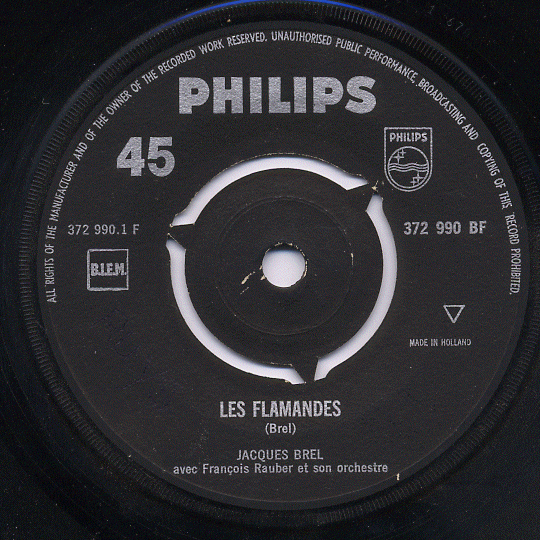 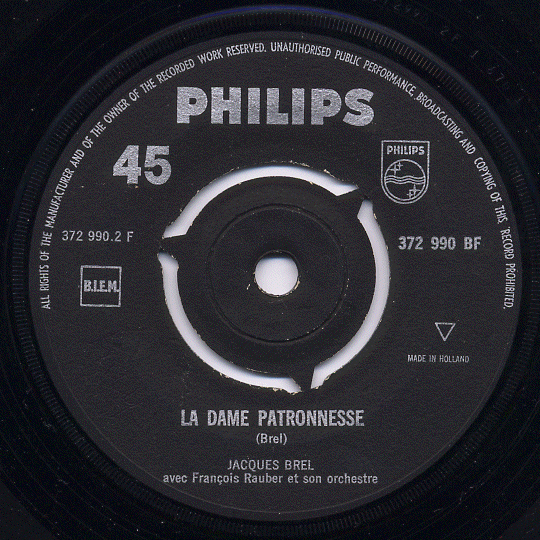 While Les Flamandes is the only studio version appeared until the 1972 album of 'modernized' versions, La dame patronnesse is the less known 3'24" version. It appeared on both the LP and EP issued in 1959, but was eventually replaced by the shorter, faster version recorded in 1962 on the 1966 LP and on the CDs issued since the 1980s. |
24 Philips 372.991 BF, 1962 A. L'ivrogne |
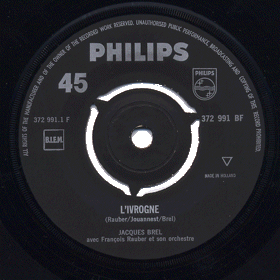 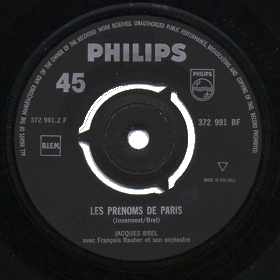
This is one of the last singles I got my hands on. I once spotted this single on sale in the Marktplaats website. I was checking the site daily, every evening. In this way I was pretty sure that I could intercept every interesting offer before it expired. But that very single was held by a seller who closed the auction at the first offer he received, before my evening check. When I found out and argued the seller about his decision, he answered that he was perfectly happy because he bought the single at 10 cents and sold it at 10 euros. Well... I usually appreciate this attitude of selling not to make the highest cash possible, it's a perfectly healthy behavior that would make our sick world a better place. Too bad that time I was on the wrong side... |
25 Barclay 60313, April 1962
A. Les bourgeois 2:56 #2 |
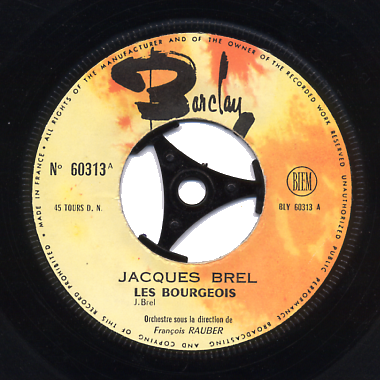 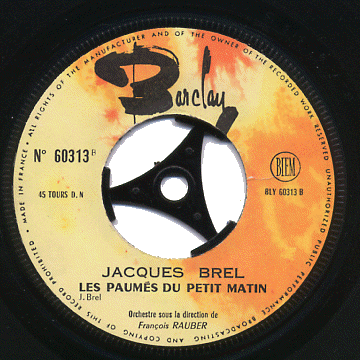 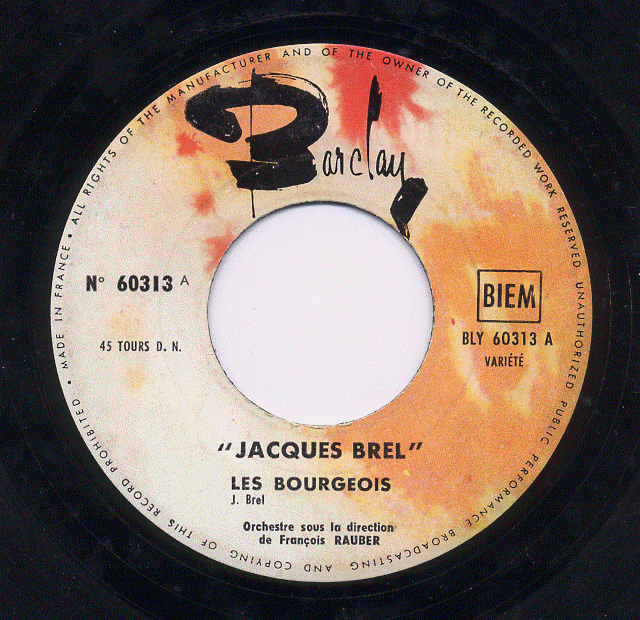 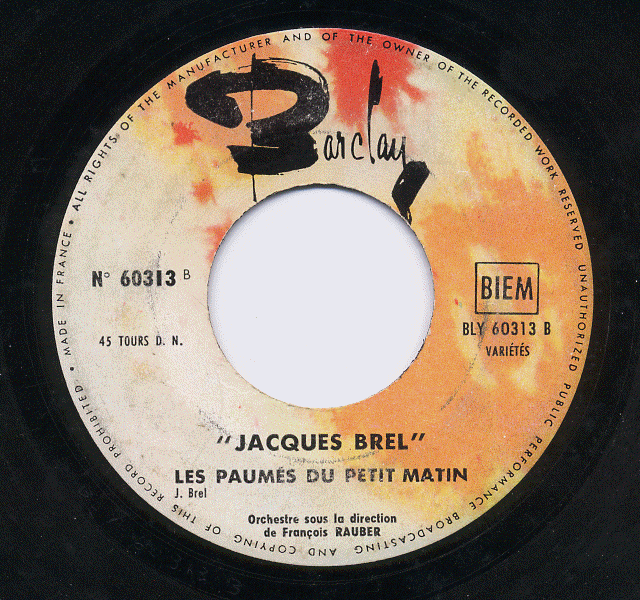 |
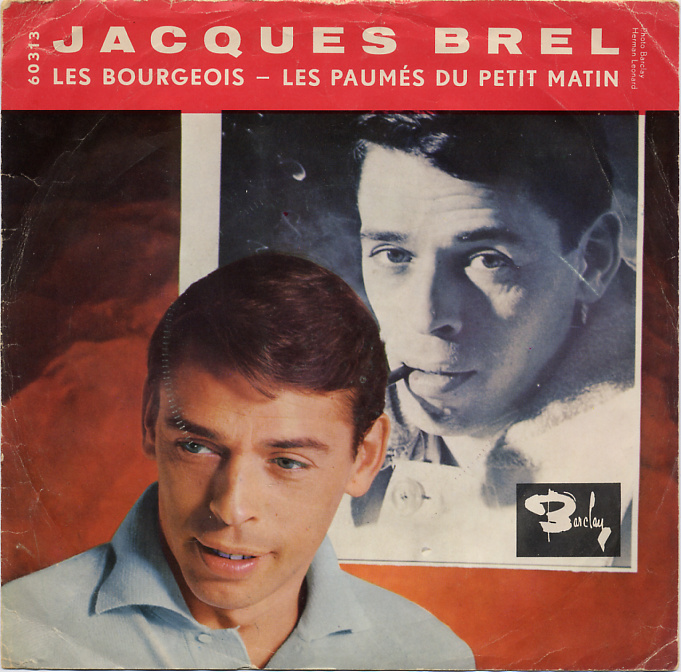 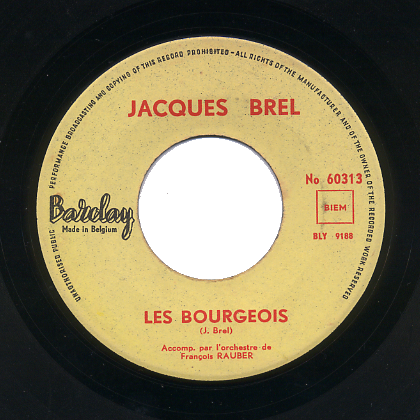 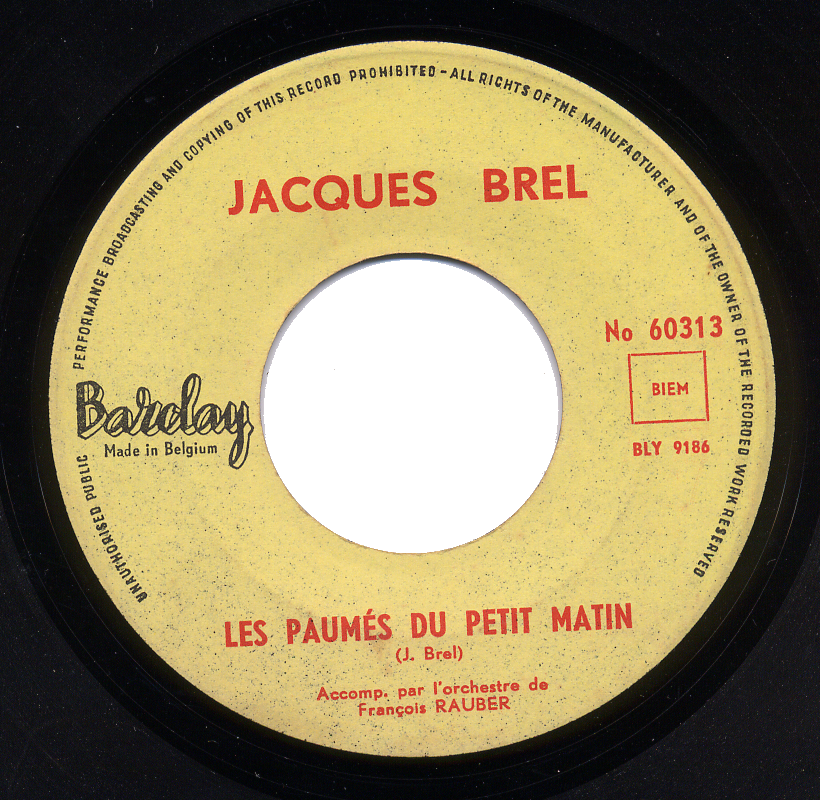 With Jacques Brel moving to Barclay in 1962, until 1968 every single was released in at least the French and Belgian editions. While French pressings were, for the first years, made for jukebox use and thus had no cover, the Belgians had a nice standard sleeve. Different prints of the French release exist |
|
26 Barclay 60314, April 1962 A. Madeleine 2:39 #2 |
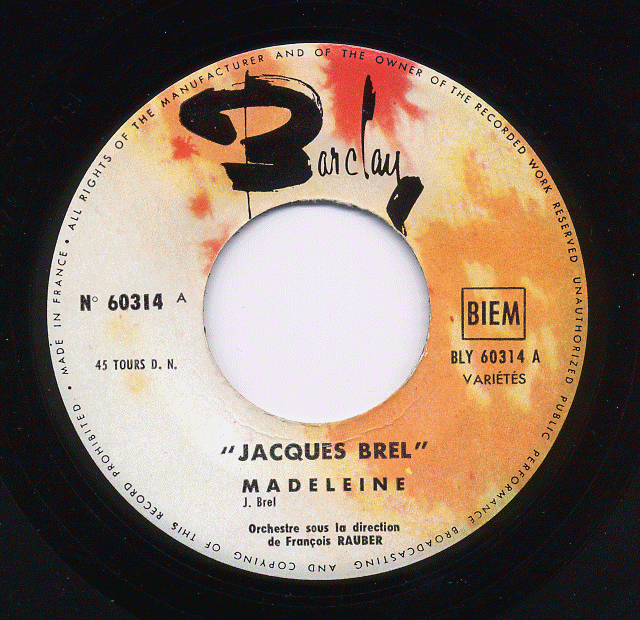 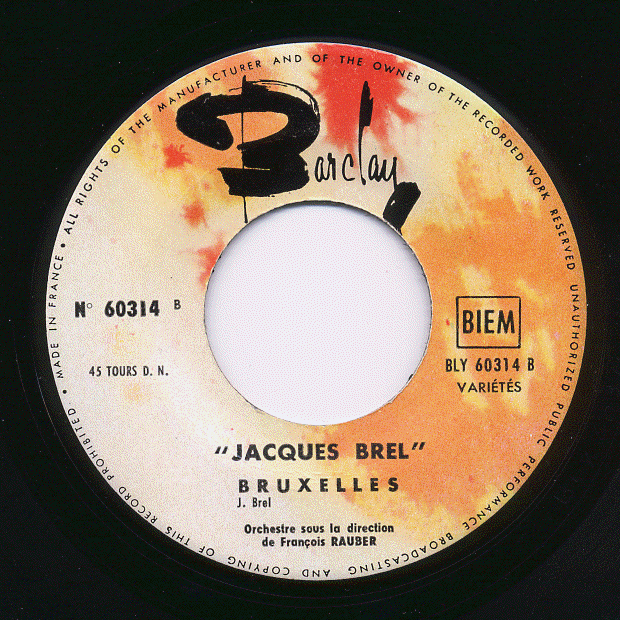 |
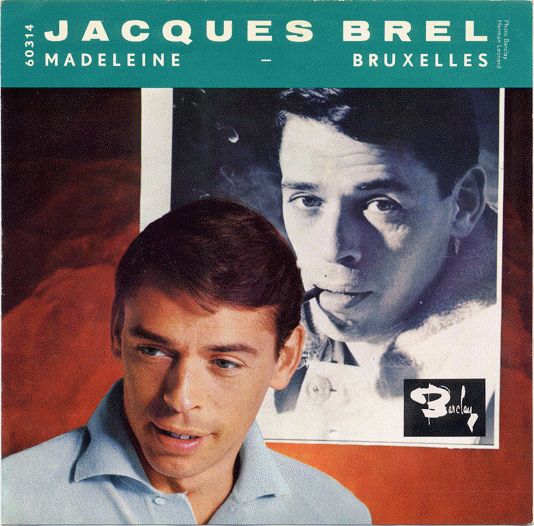 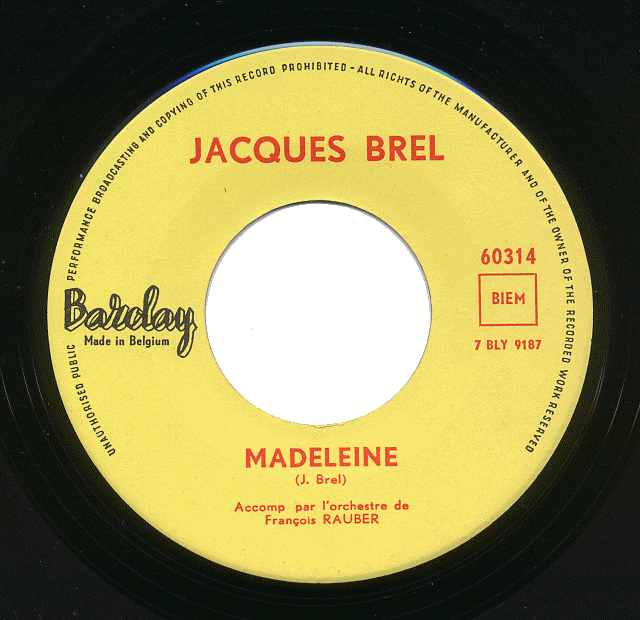 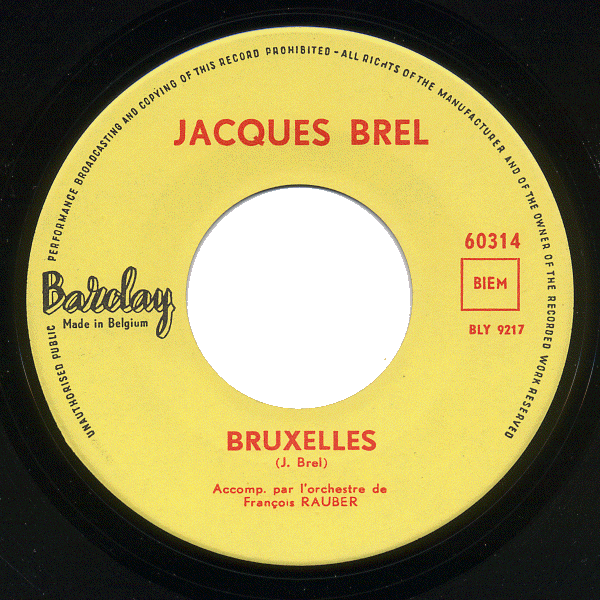 The Belgian sleeves had the same picture of Brel smiling in front of his billboard made for the 70 453 medium (Les bourgeois) EP, and changed only for the color of the upper banner holding the tracks titles. Disc labels also differed from French pressing and are recognizable for the uniform yellow background and the 'Made in Belgium'. |
|
27 Barclay 60315, April 1962
A. Une île 3:45 |
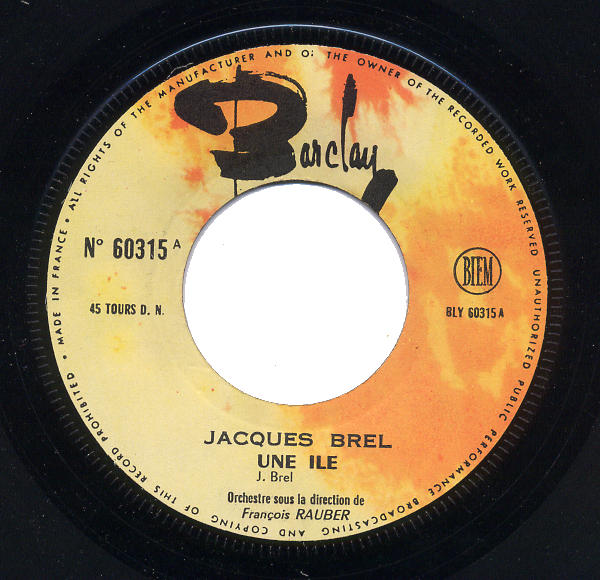 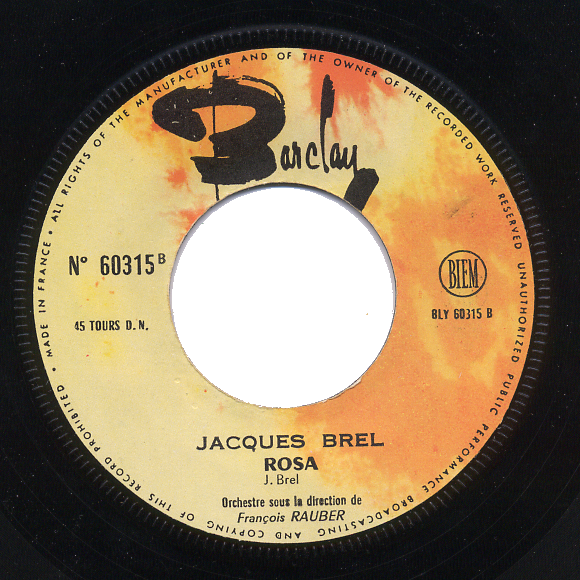 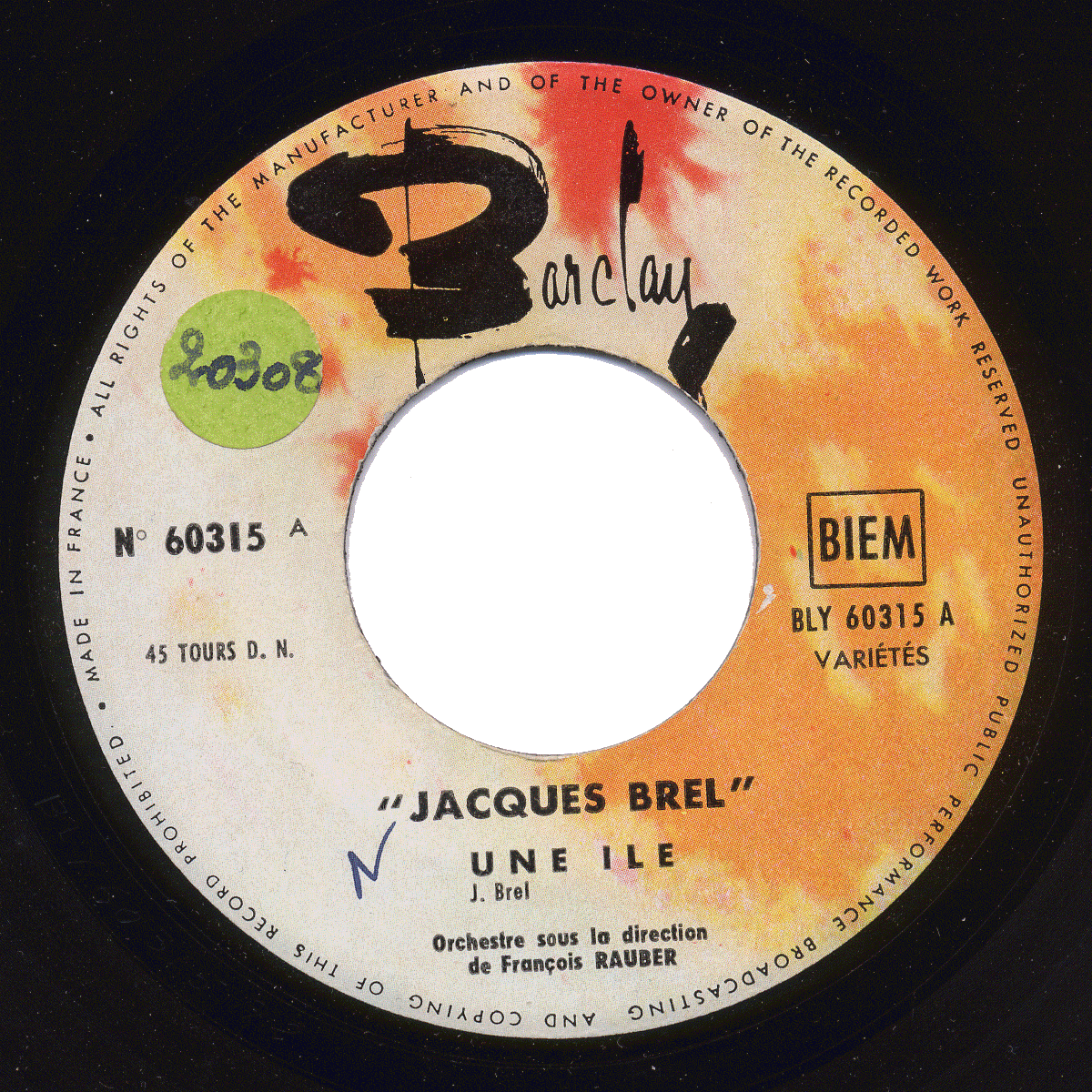 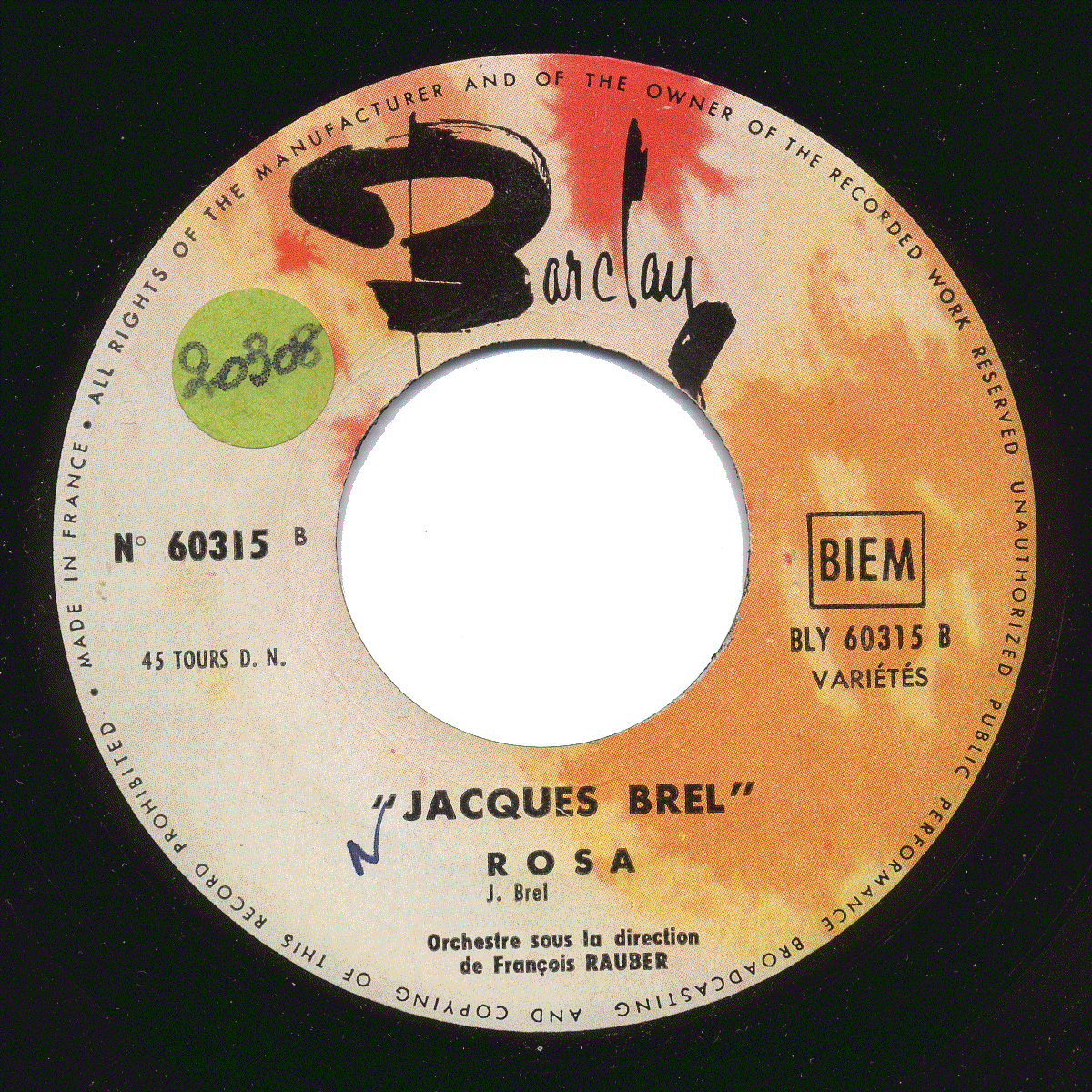
Different prints of the French release exist |
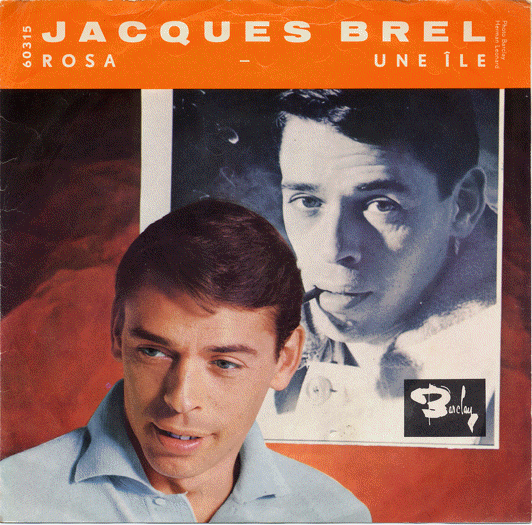 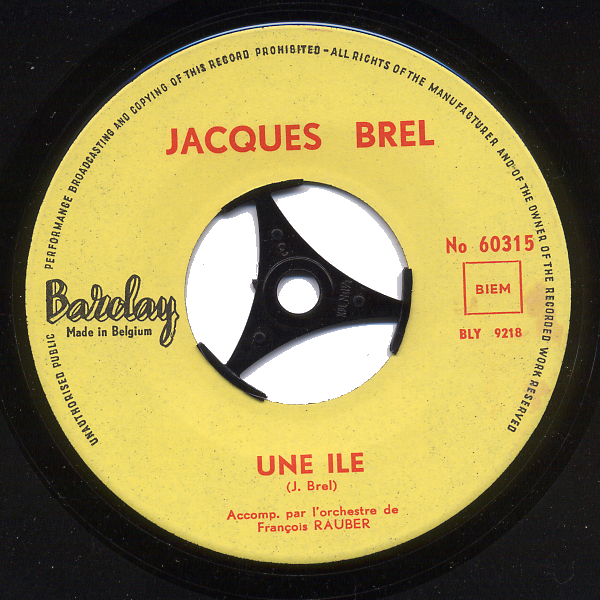 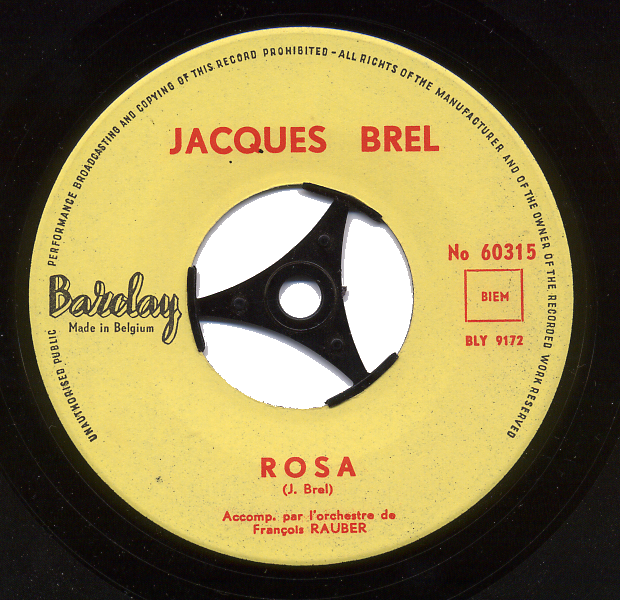
The sleeves made for Belgian pressing had the same picture on front and back - that's why I put only one image of it. Unlike the usual single sleeves, these are open on three sides, like a booklet. Therefore it's necessary to put them in another sleeve, to avoid the disc slipping out. |
|
28 Barclay 60351, 1963
A. Les bigotes 2:38 #1 |
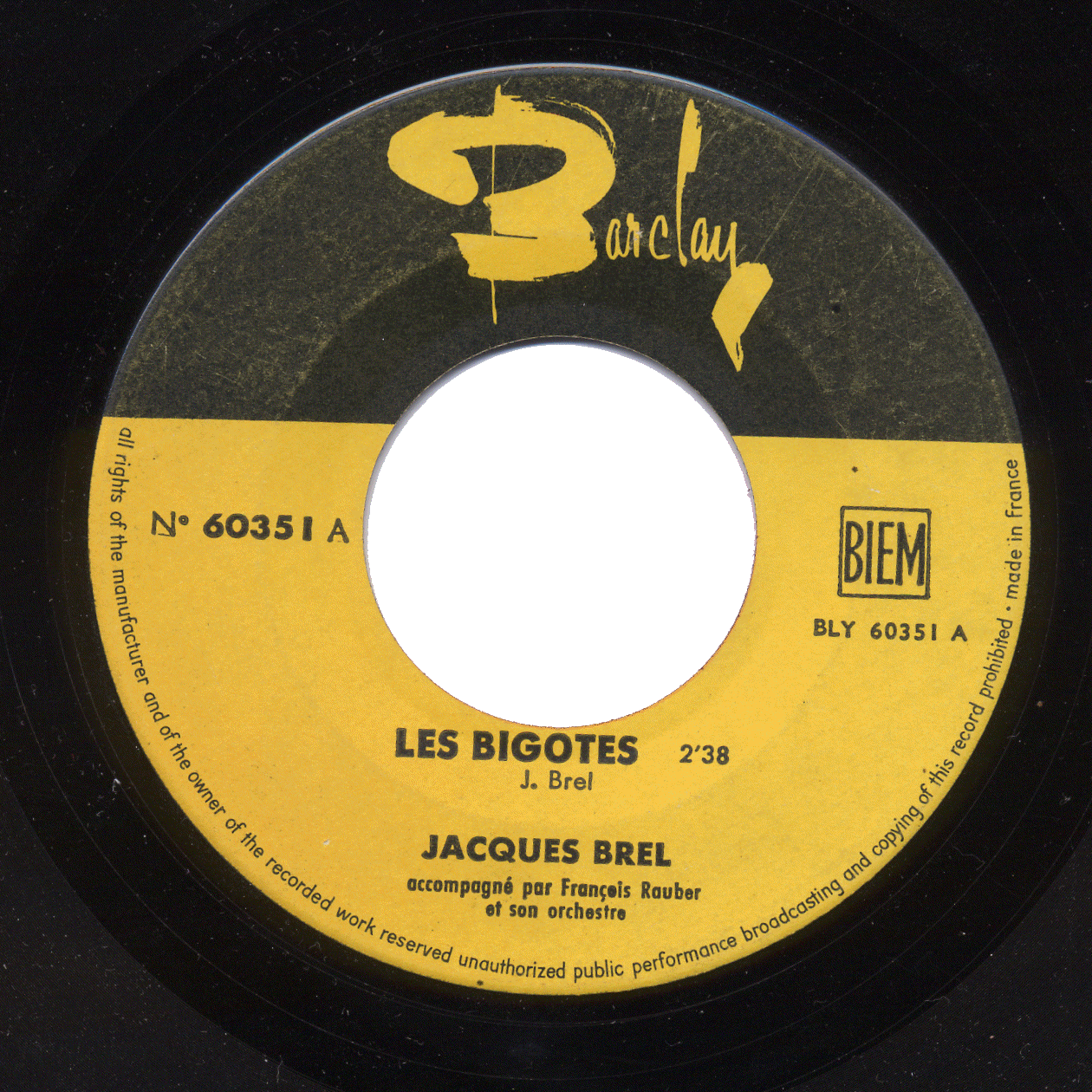 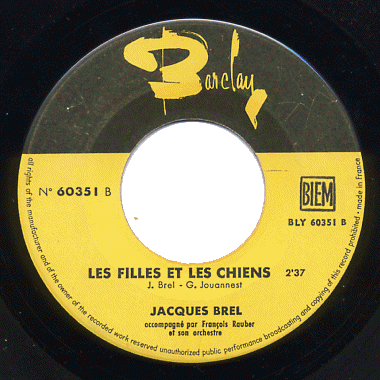 Sometimes, like for the 60351 single, the French release showed a very different label design. I still don't know if this is actually a reissue. |
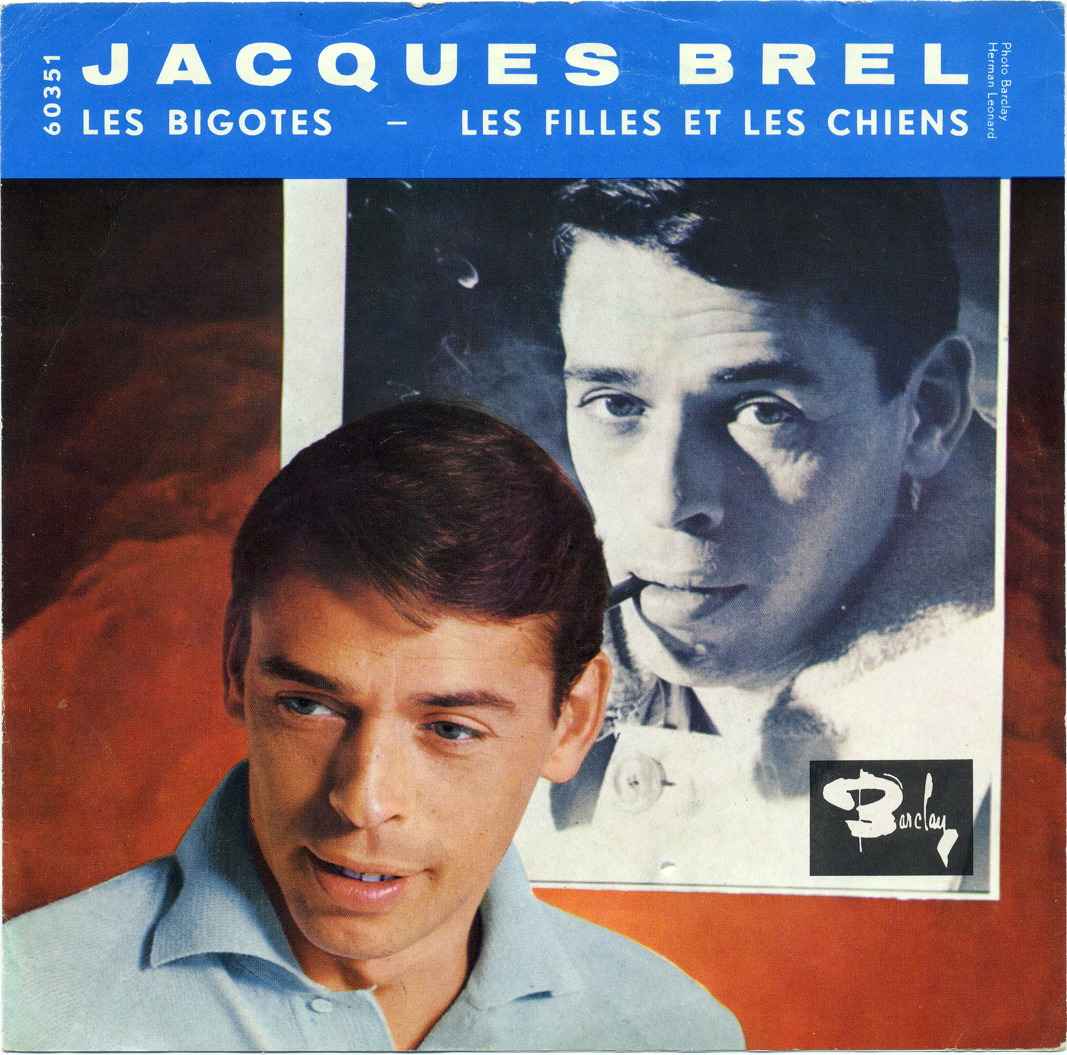 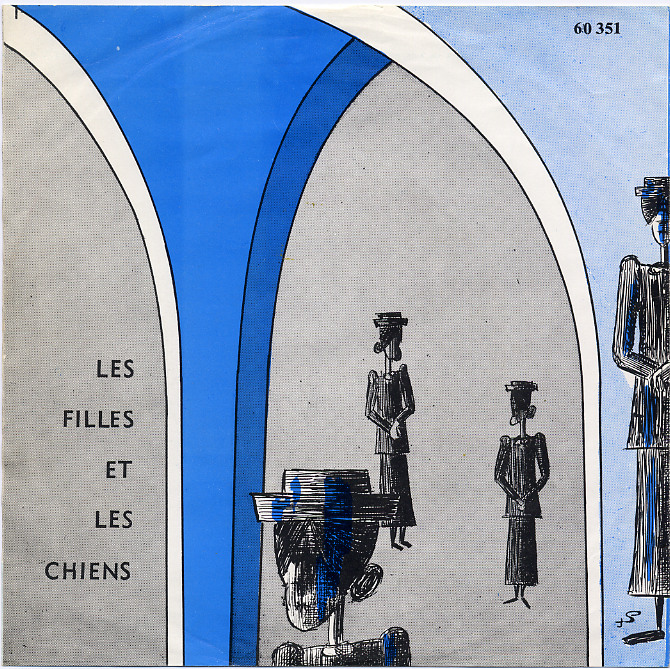 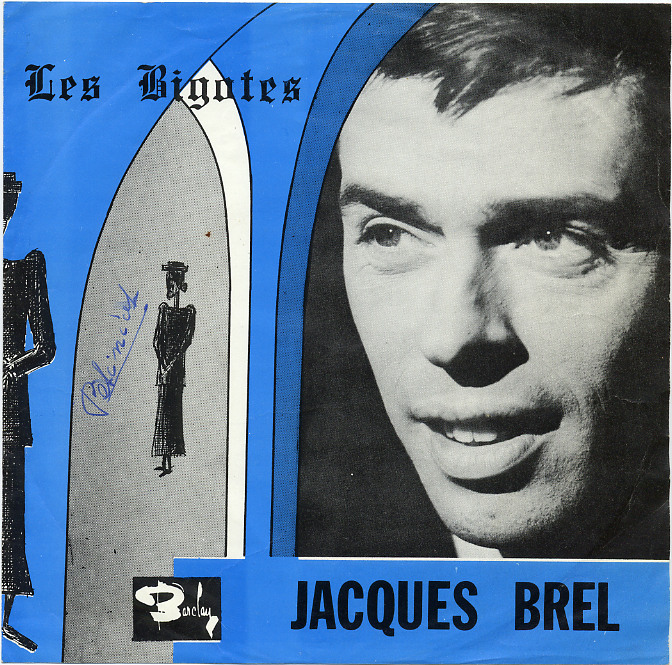 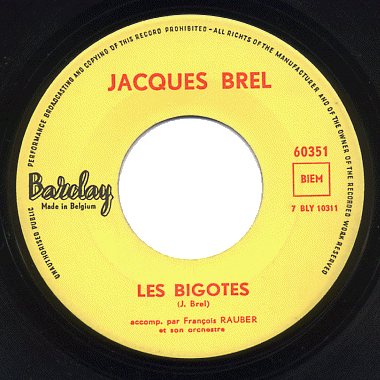 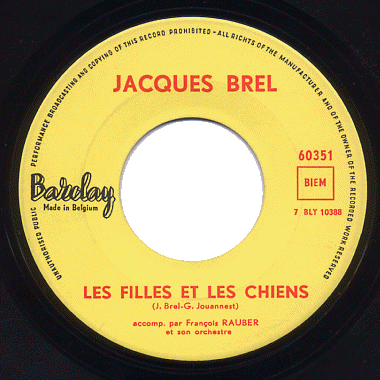 For this single, Barclay produced a second Belgian release with a sleeve that remained unique in its type. It had a design which spanned on both front and back sides so that you can appreciate it only opening the sleeve. The cover (by an unknown designer who signed with a monogram) has a concept that recalls Les bigotes. |
|
29 Barclay 60376, 1963
A. Les vieux 4:03 #1 |
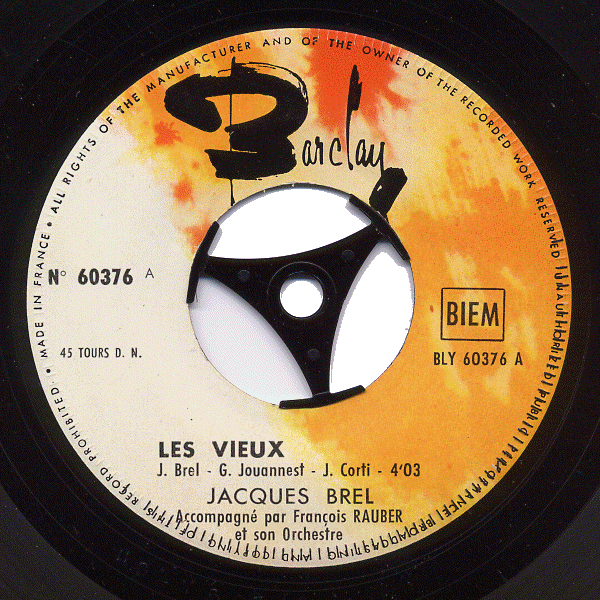 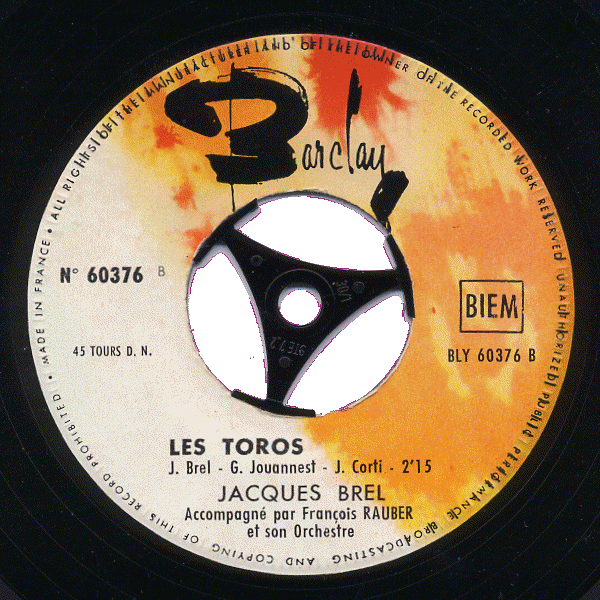 |
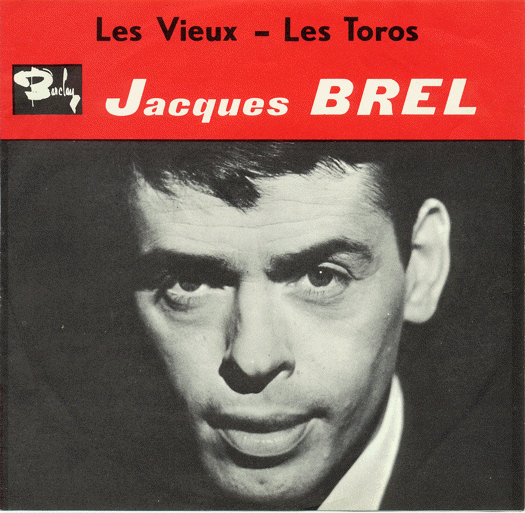 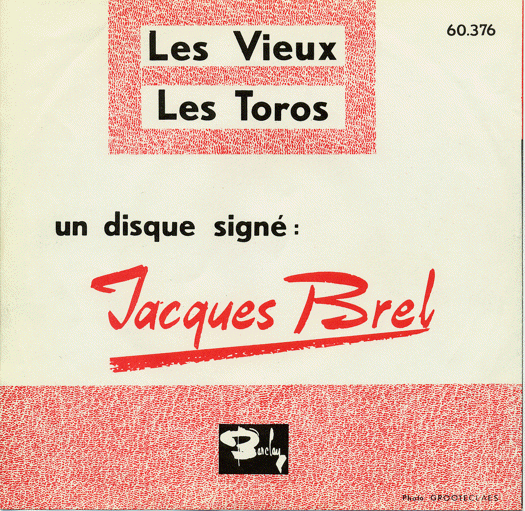 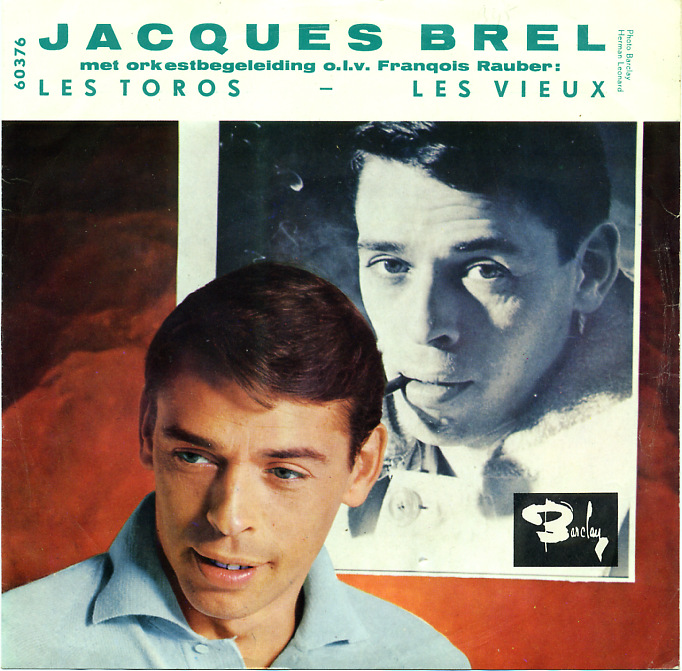 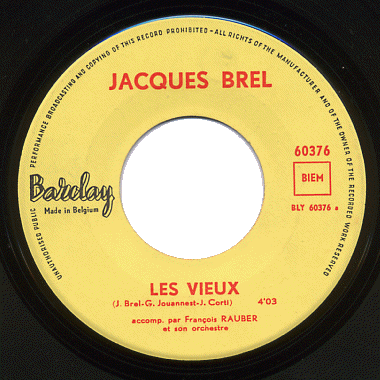 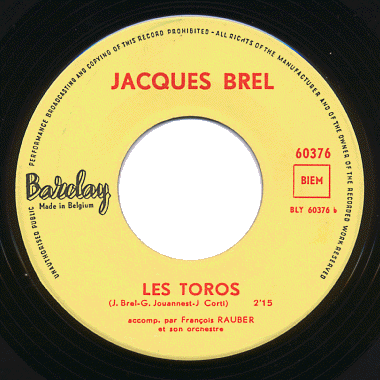
The Belgian pressing of this single had two different sleeves, the first of which was in the standard one-side opening and with different front and back layouts. The disc labels were the same. I am assuming that the first sleeve was issued in 1963 along with the French one and with the LP, while the second one was part of a reissue series distributed in 1968. My point is that the back of the sleeve has a graphical style more in line with the beginning of the '60s and, most of all, the slogan "un disque signé Jacques Brel" suits better to an artist still in full activity than to an artist who retired from the live scene. |
|
30 Barclay 60377, 1963 A. La Fanette 4:04 #2 |
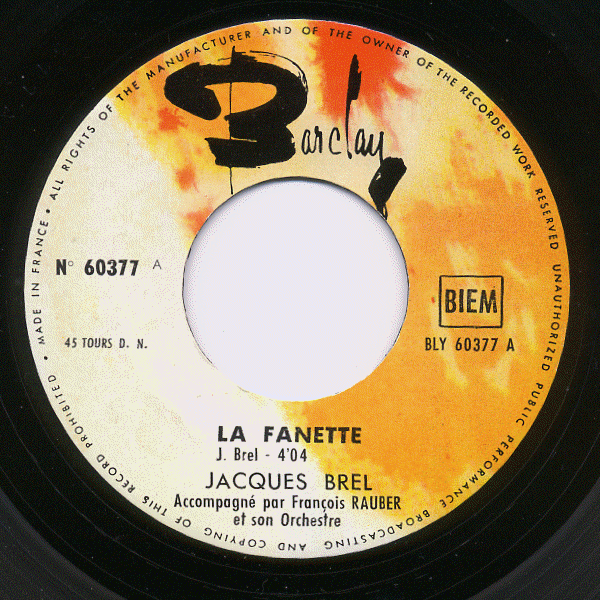 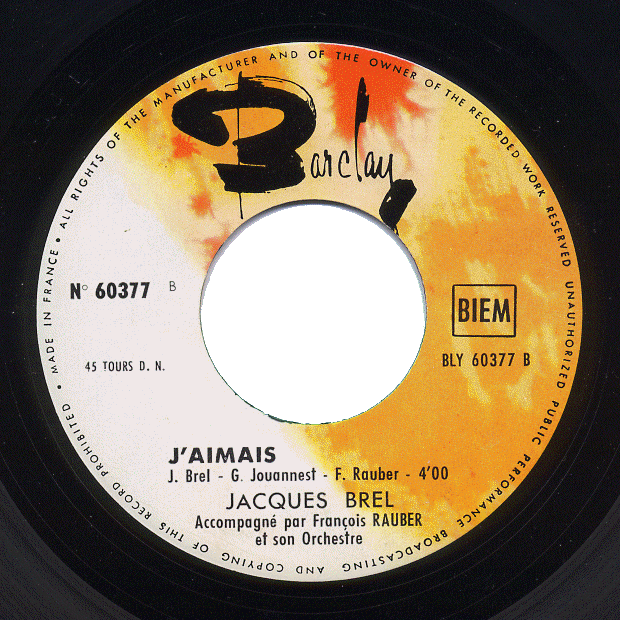 |
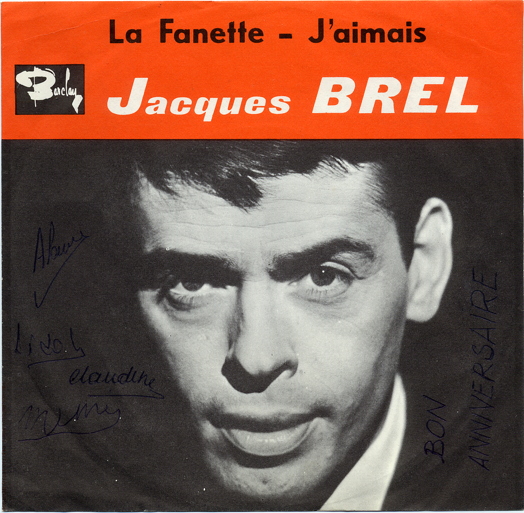 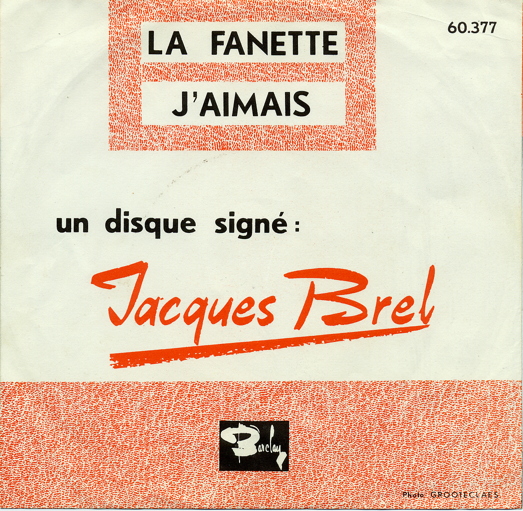 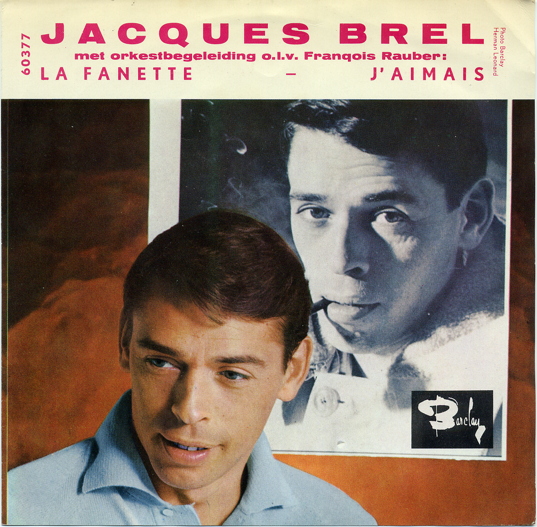 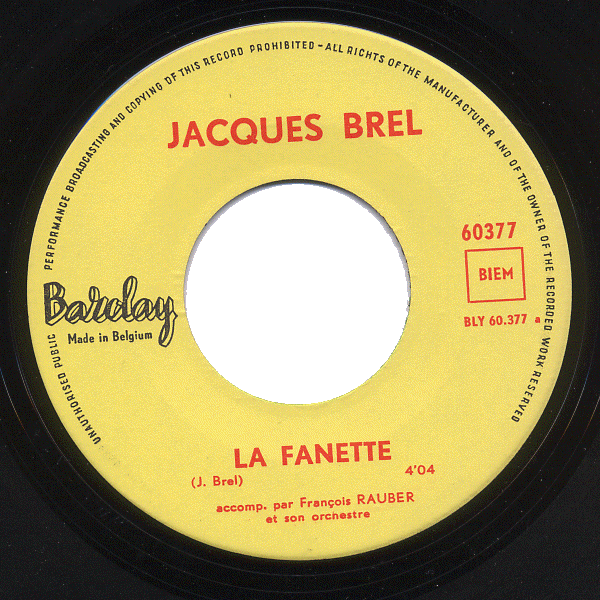 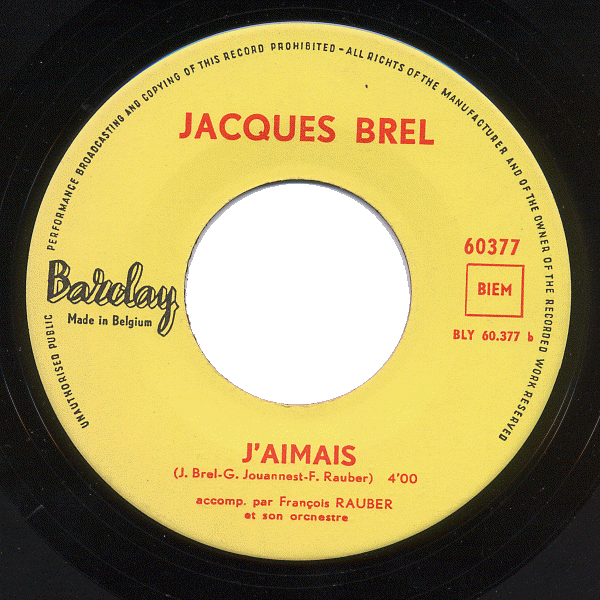
Two different sleeves of the Belgian pressing for this single too. |
|
31 Barclay 60451, 1964 A. Mathilde 2:35 #2 |
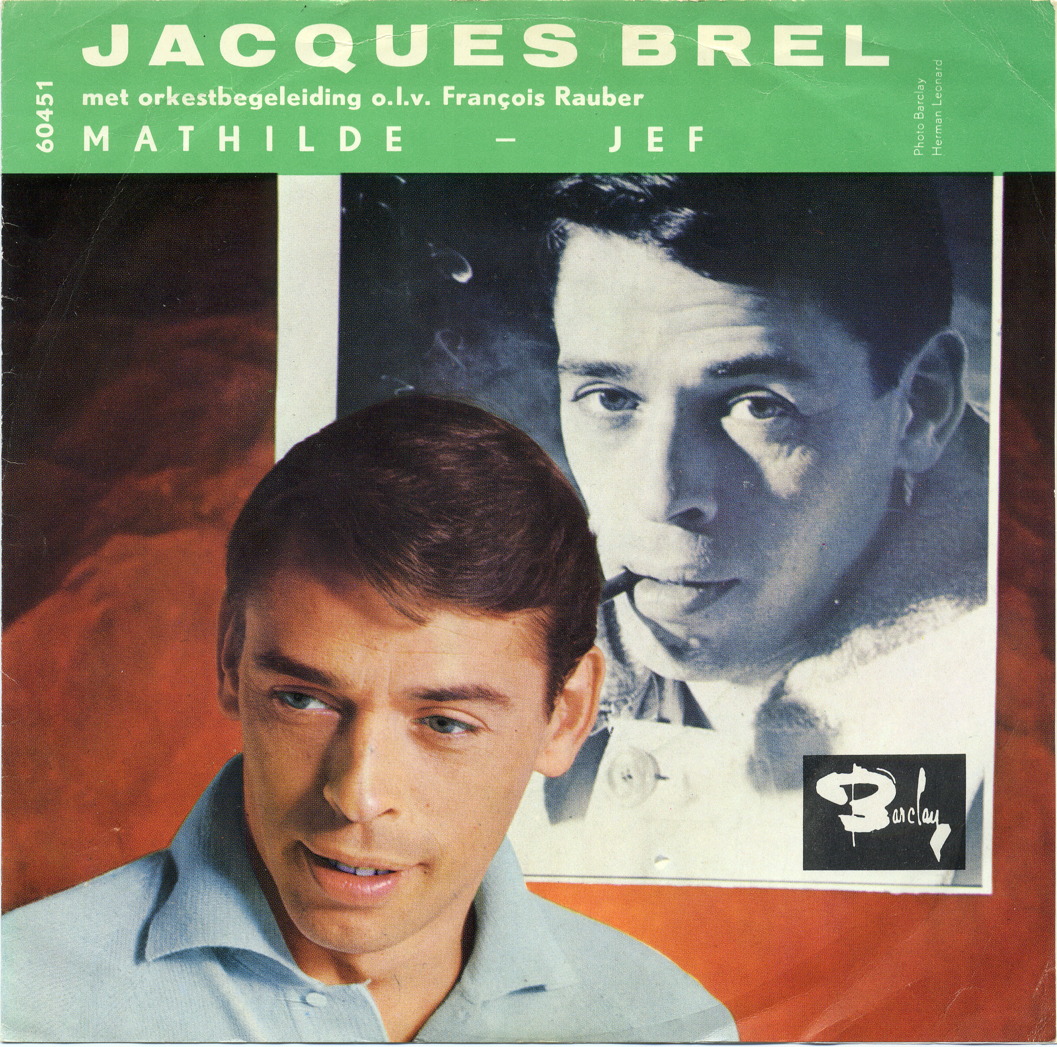 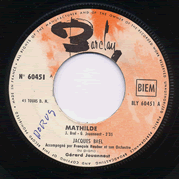 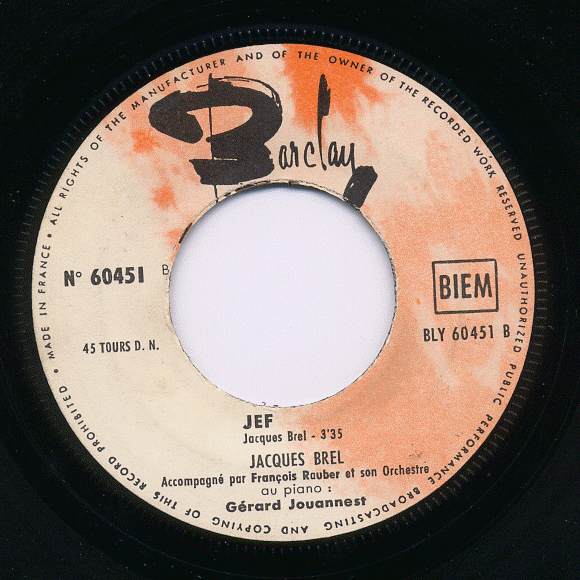 It seems that for this single the Belgian release contained a disc with the standard French label, in place of the expected yellow one. But I keep wandering whether, in the 50 years that have passed and the many hands who owned these records that I'm buying now, somebody eventually swapped records and sleeves... |
32 Barclay 60471, 1964
A. Les bonbons 3:29 #1 |
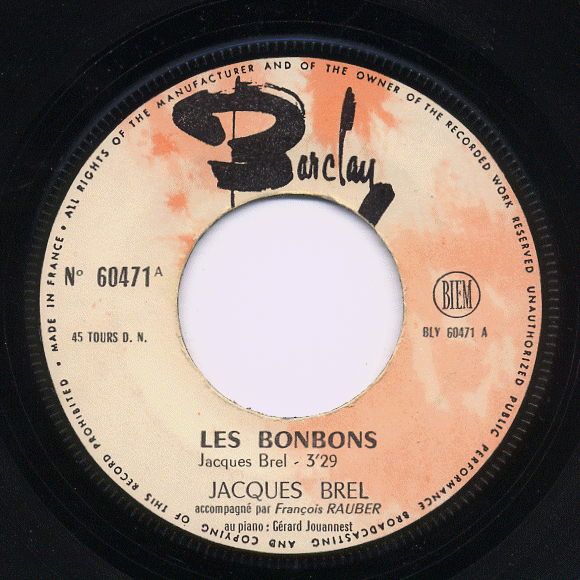 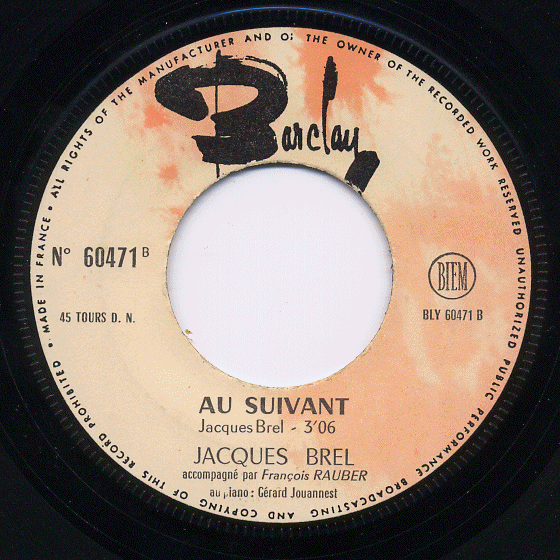 |
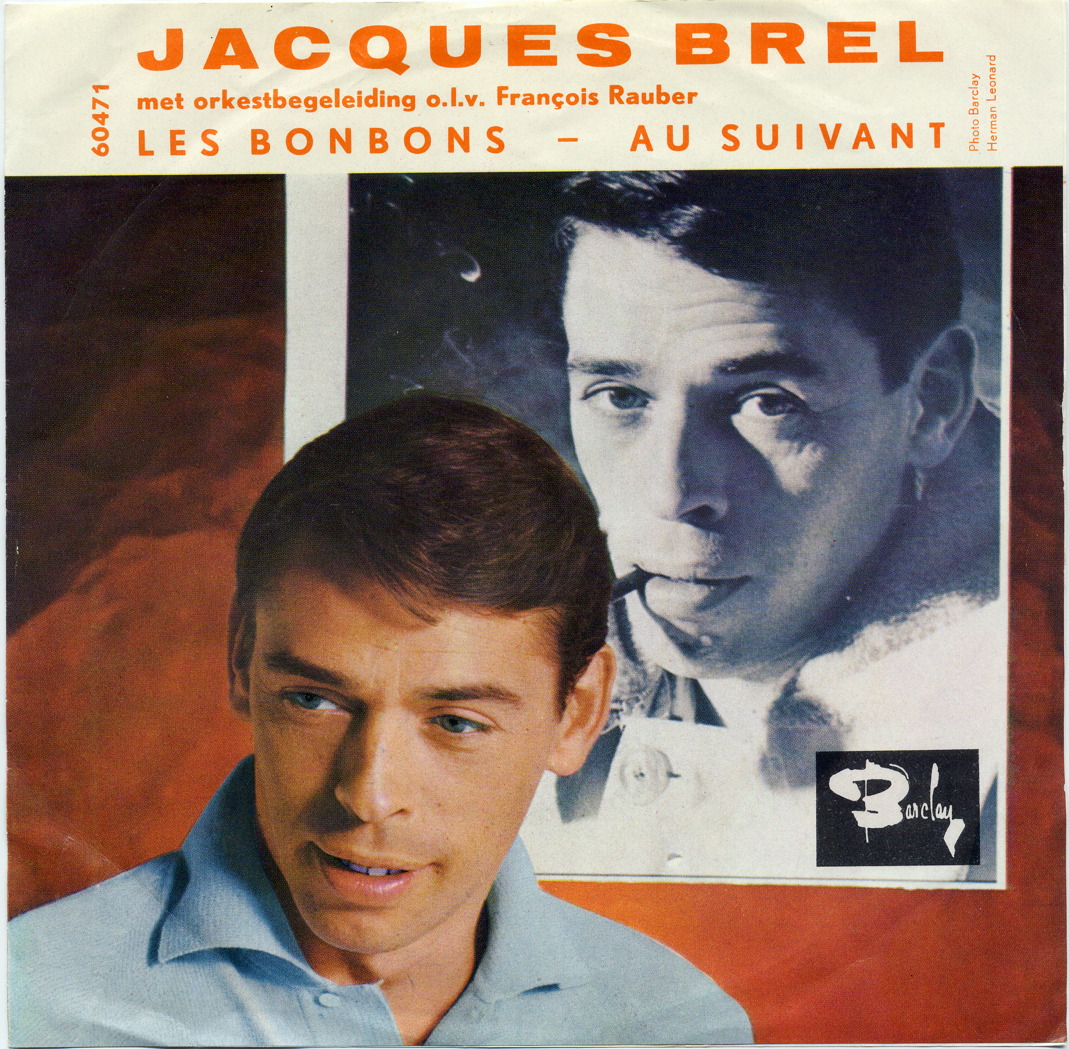 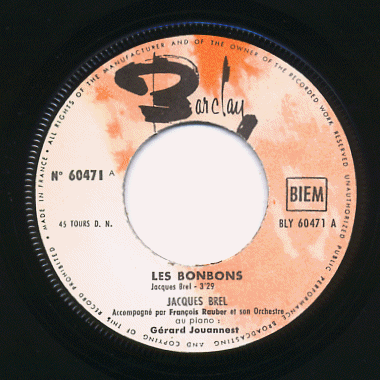 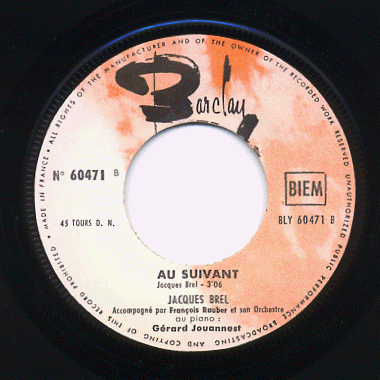 |
|
33 Amsterdam / Barclay 60520, 1964
A. Amsterdam 2:55 #1
|
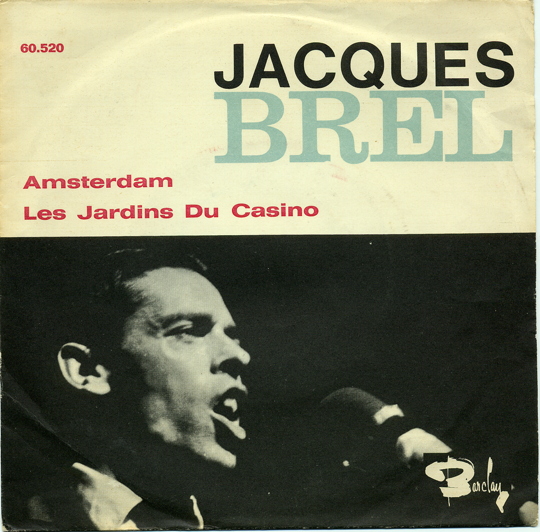 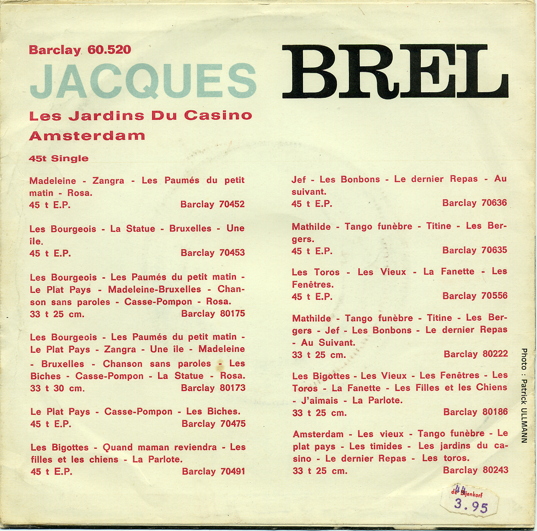 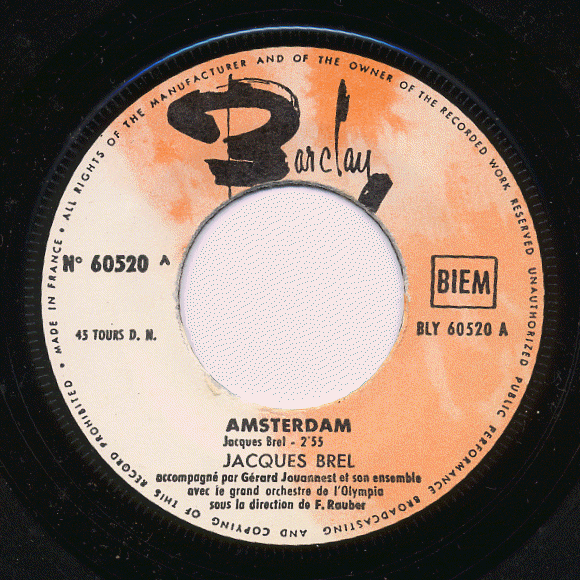 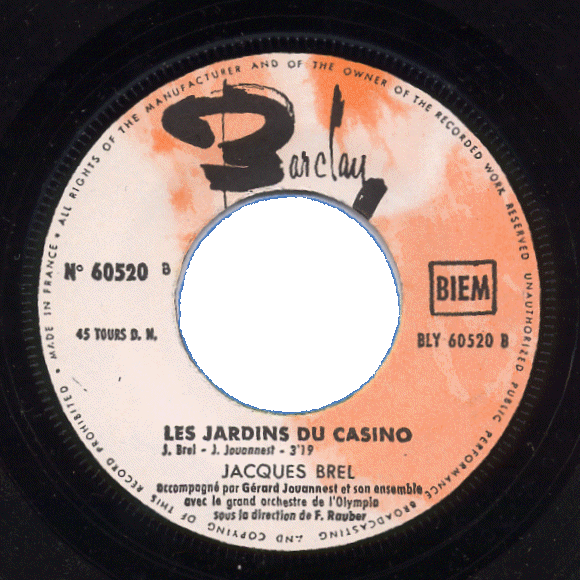 In 1965 sleeves appeared also for French pressings. Quite like the Belgian ones, they have the same picture of Jacques in b/w in the lower half and the title tracks in the upper half. On the back, instead of repeating the same picture, publicity of the latest Barclay issues are displayed. |
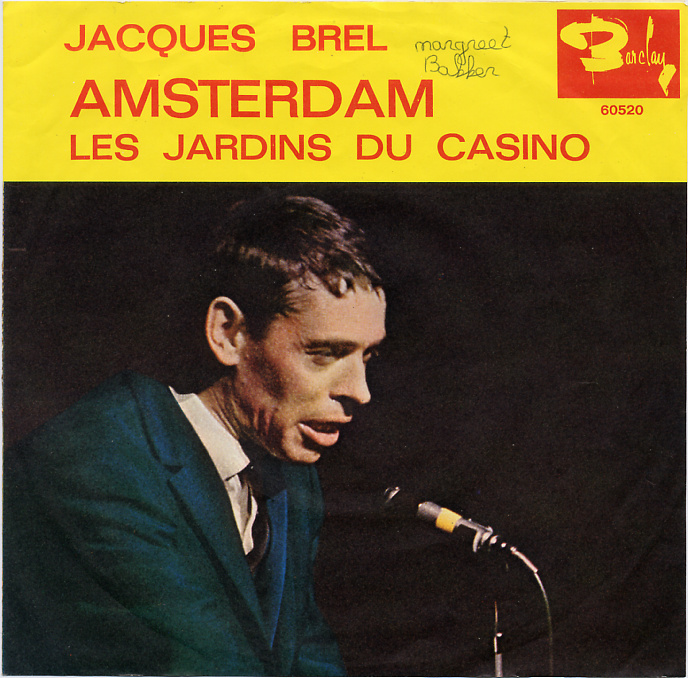 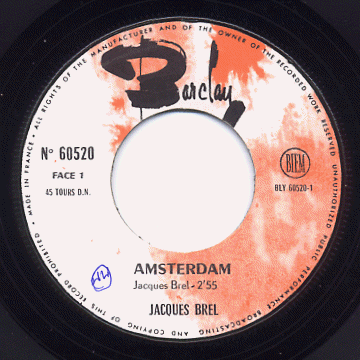 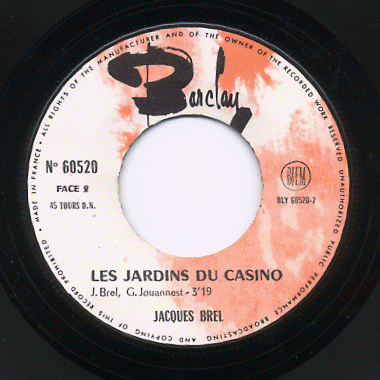
This is the reissue of 1967, in which the sleeve was changed using a more appealing color picture. This format too had the same picture on front and back covers and opened like a leaflet. |
|
34 Barclay 60542, 1965
A. Les bergers 2:24 |
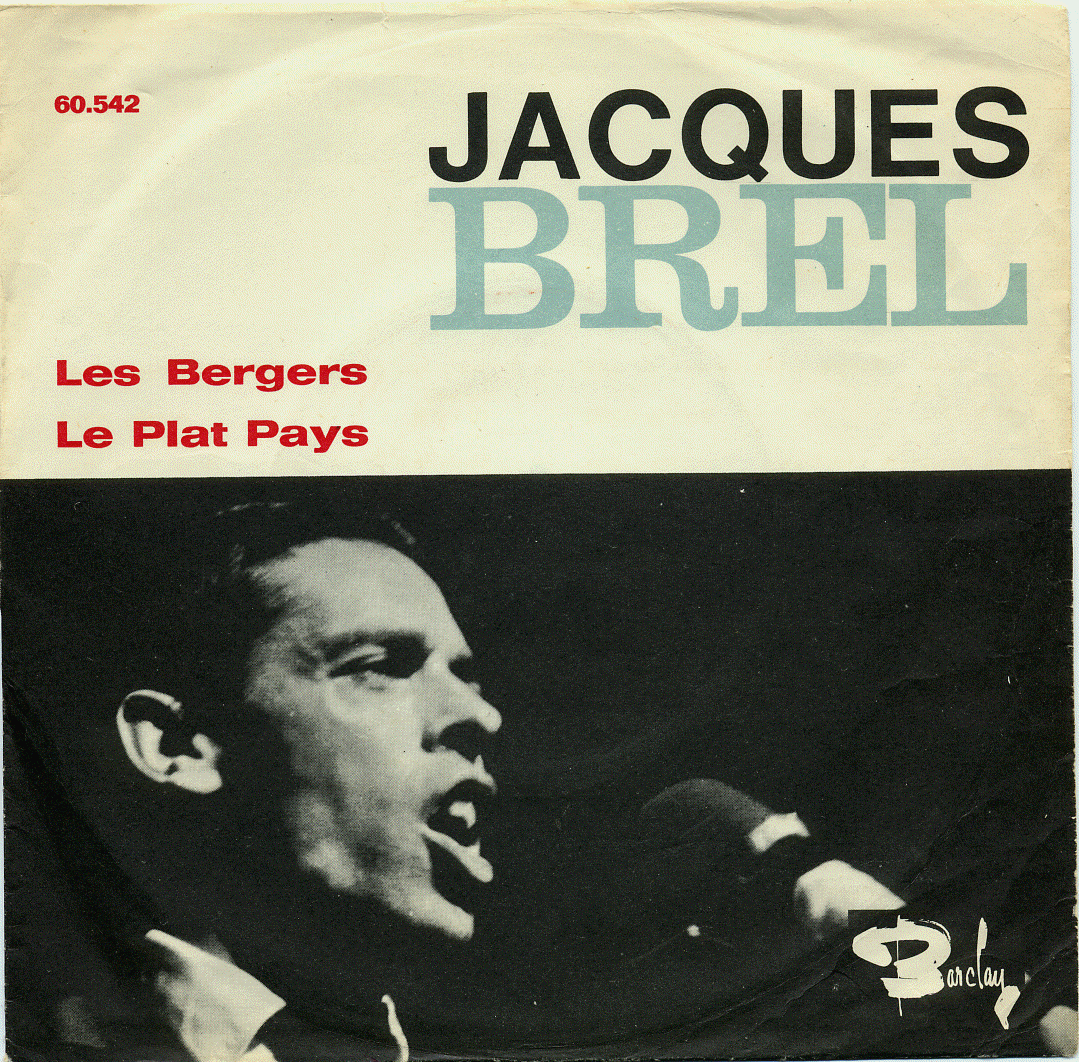 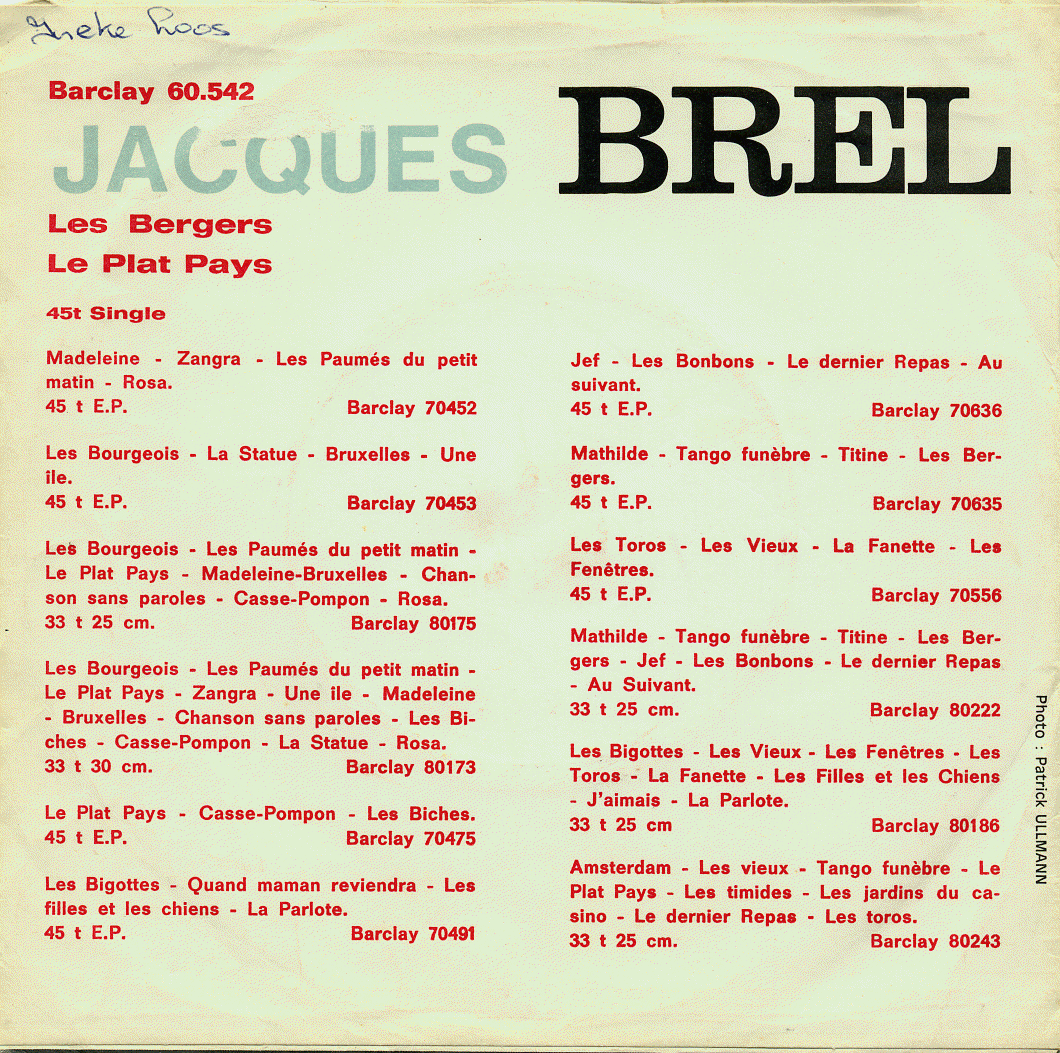 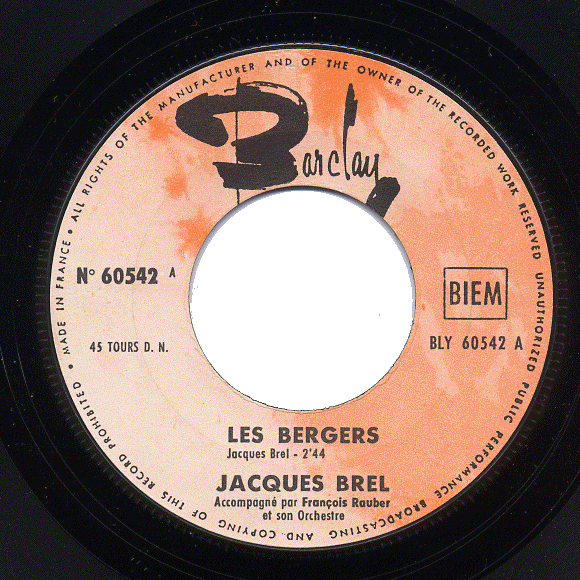 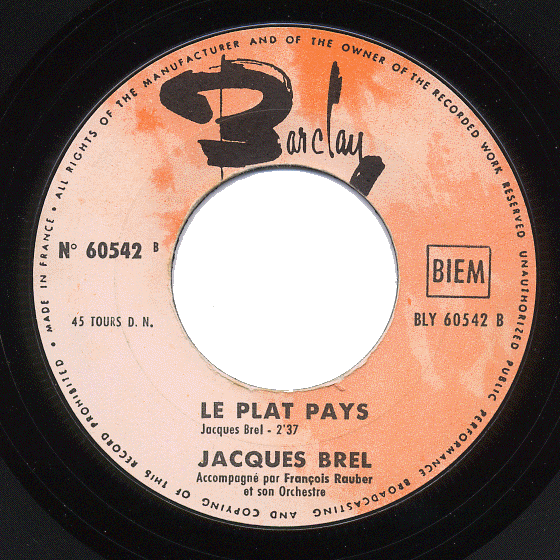 This is the first appearance of Le plat pays on a single, about 3 years after its first release on EP and LP. And quite bizarre too, as the B-side of a fairly unknown song - and far from Brel's best - like Les Bergers. I can only reckon that at that time Barclay recovered from a lapse of memory, because in the end Le plat pays had four published singles, resulting the song with the greatest number of singles in Brel's discography. |
35 Barclay 60547, 1965
A. Mijn vlakke land 2:55 |
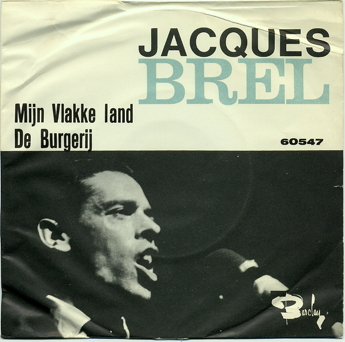 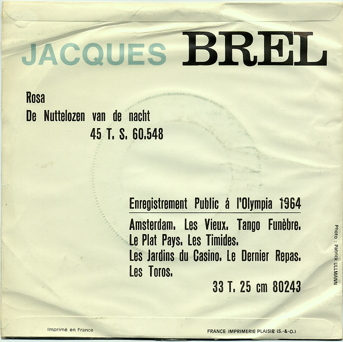 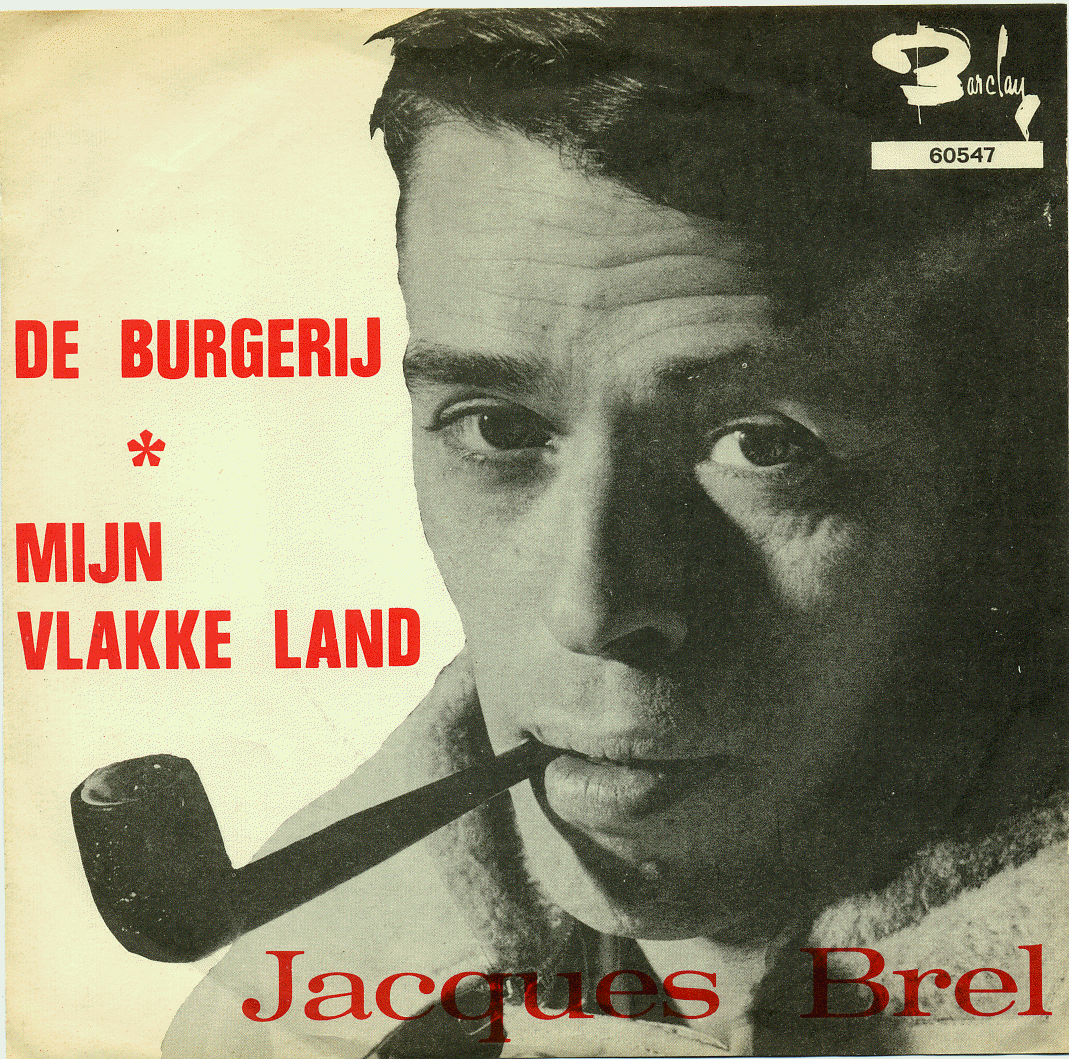 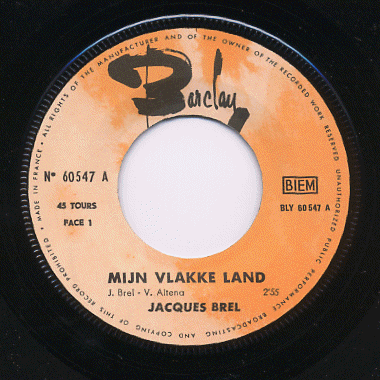 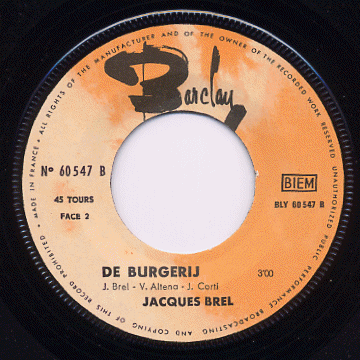
And since Mijn vlakke Land is the Flemish version of Le plat pays, its three single releases should be added too. Oh, now my wicked mind gets it! Le plat pays in French was a vehicle to sustain the singles containing the Flemish versions, which were released soon thereafter. Now, looking at the 60547 and 60548 singles, my guess is that they had been released in France and Belgium simultaneously, the French version with the sleeve on the left (name and titles in the upper half, photo in the lower half) the Belgian with a different picture in each single. The disk labels looks the same in both releases. |
36 Barclay 60548, 1965
A. Rosa (vlaams) 2:52 |
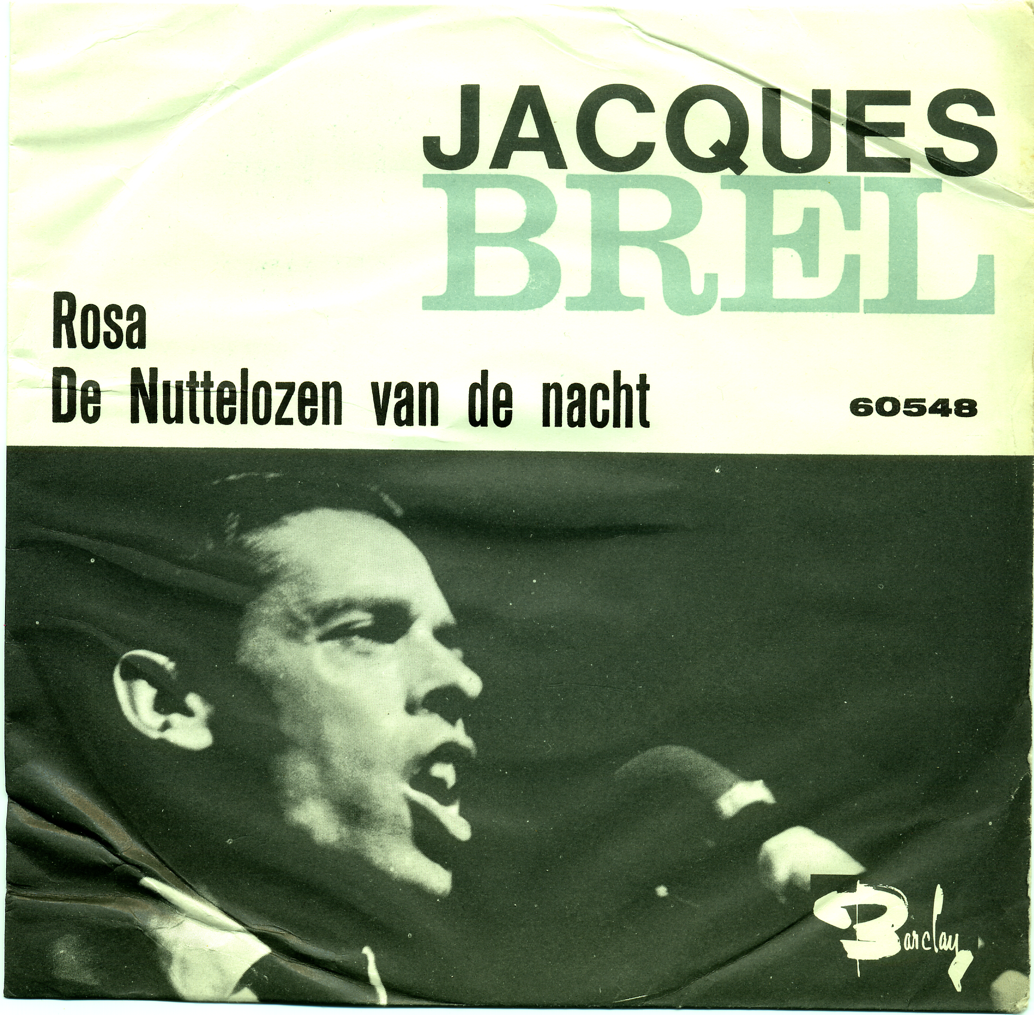 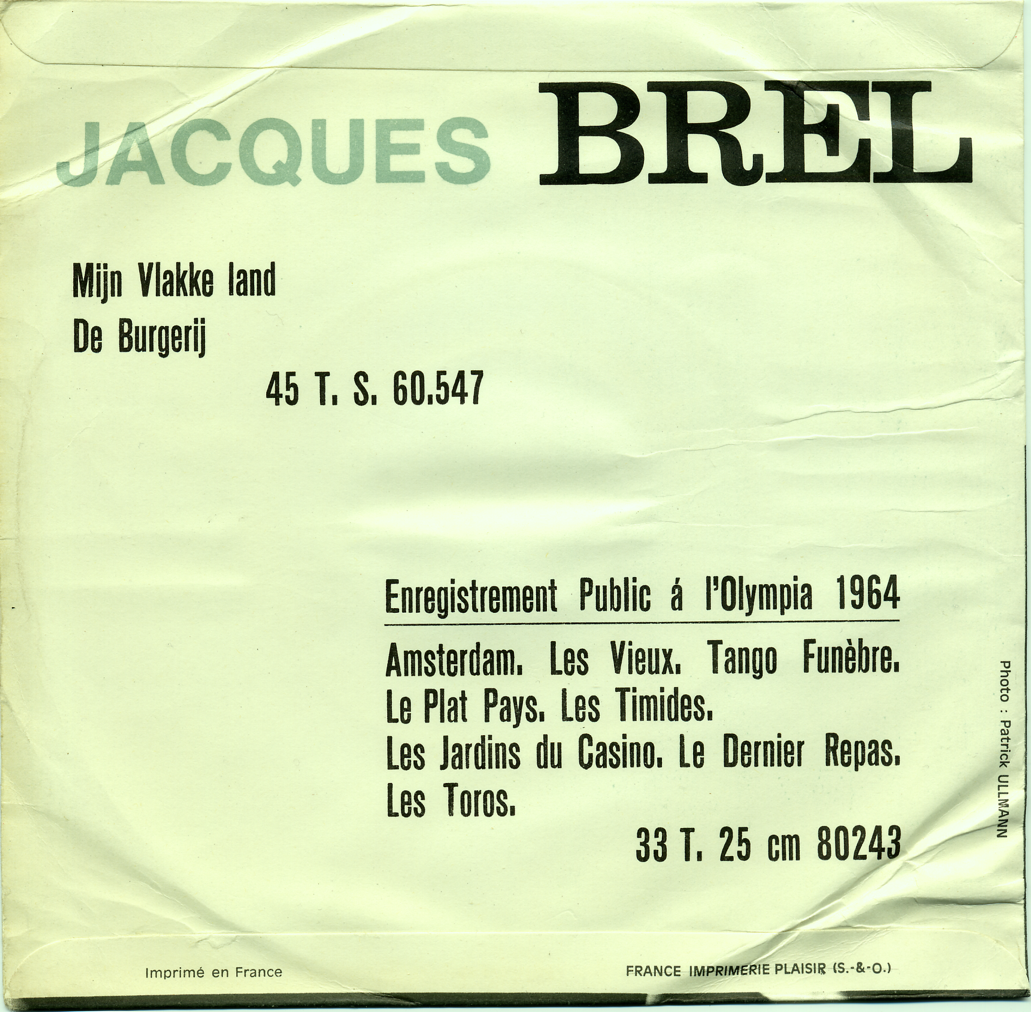 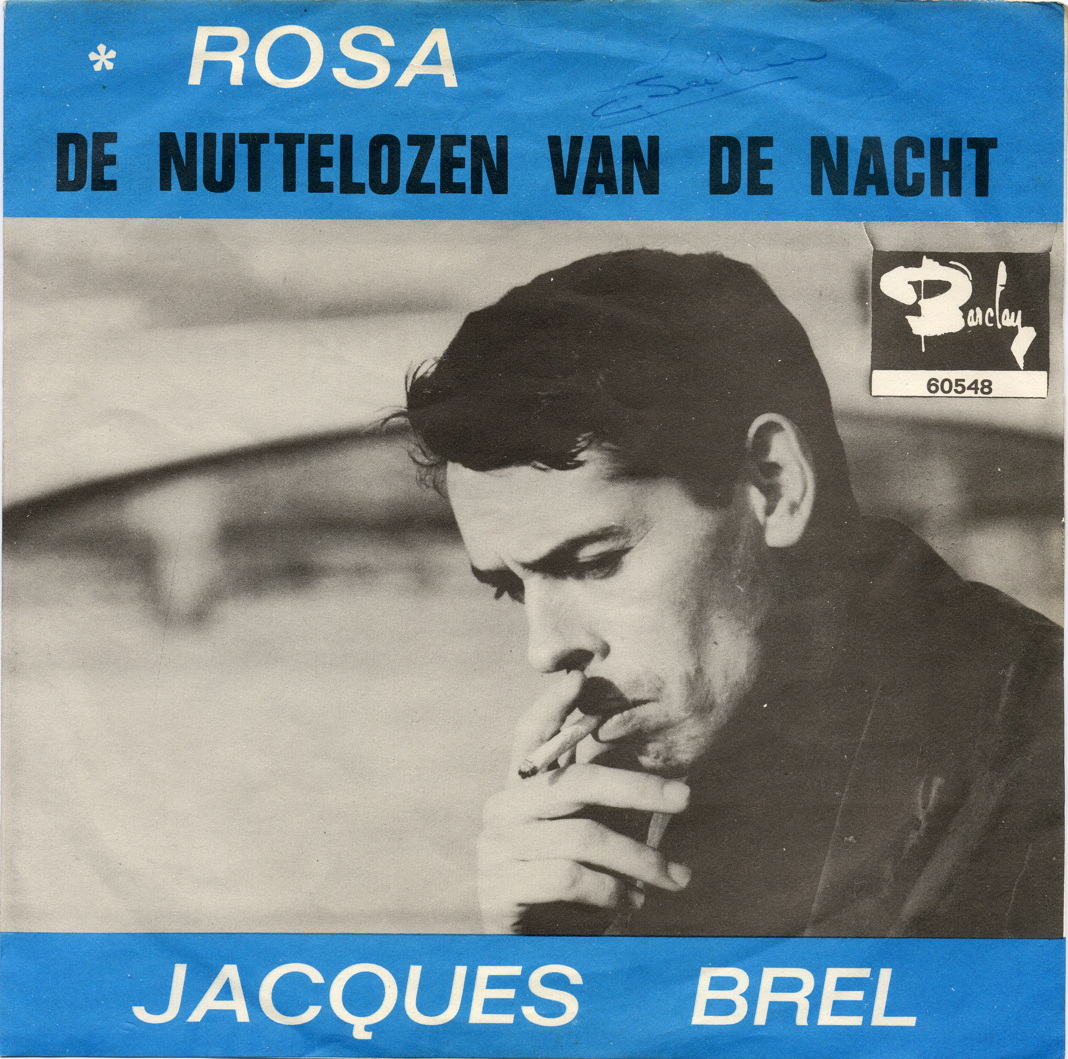 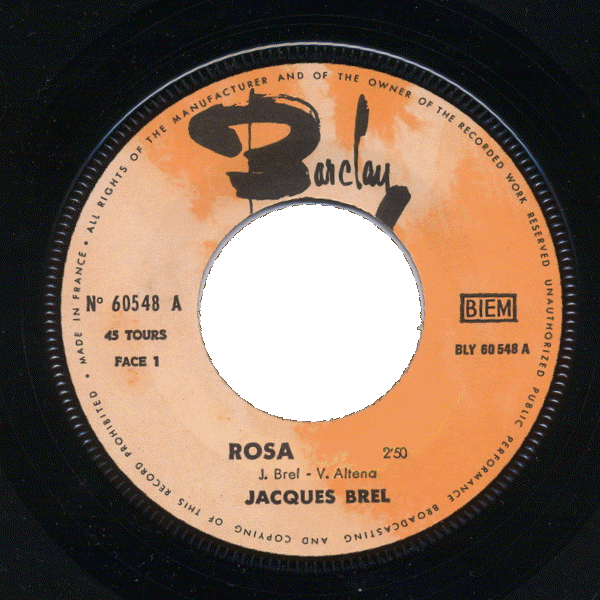 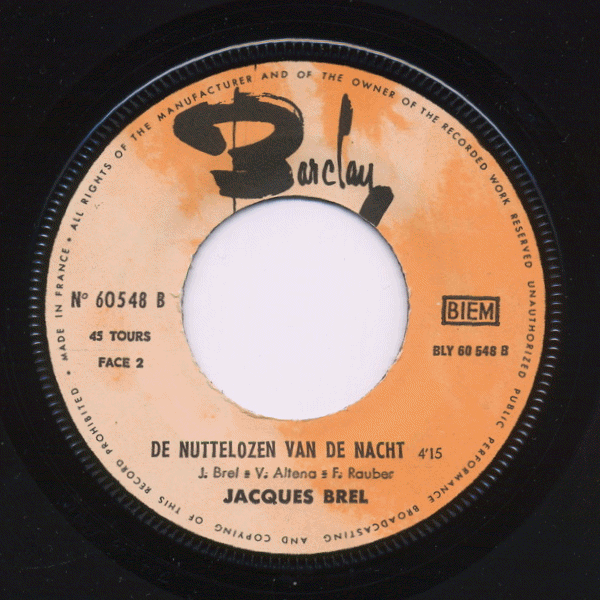 It is actually unclear when the four songs contained in the 60547 and 60548 were recorded. Marc Robine, following Jacques Miquel's researches, writes that these songs were produced in a session held on 12.02.1965. Which could be in line with the release dates of the singles. However, the songs are the same published on the 60976 and 60977 singles, which Robine says were recorded in March 1962. |
37 Barclay 60643, 1965
A. Ces gens-là 4:38 |
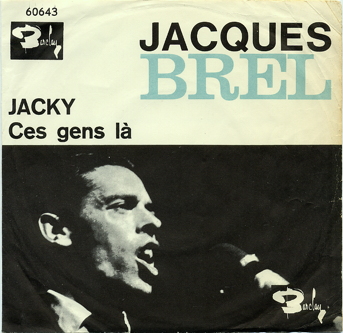 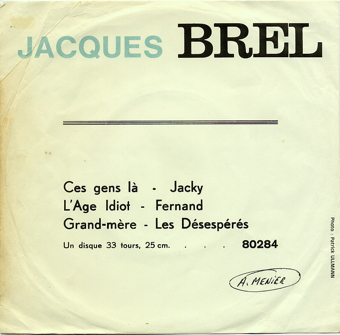 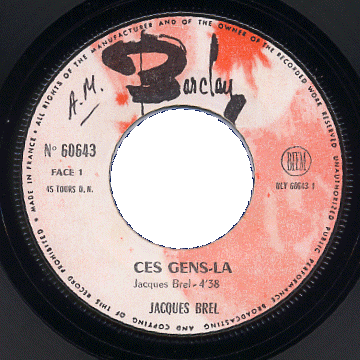 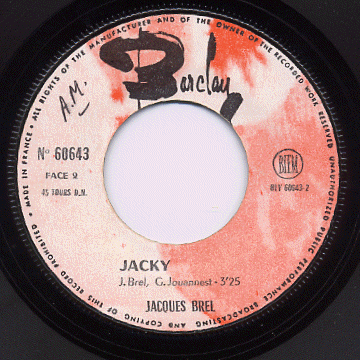 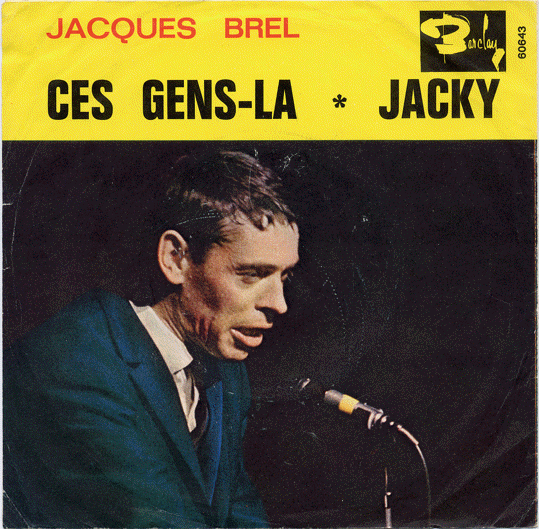
At the beginning, it was just Jacky. Then, since the release of the 1988 multiple CD compilation, it became La chanson de Jacky. Something similar happened with Casse-Pompon, that changed to Le caporal Casse-Pompon. In these cases a change in name doesn't correspond to a different version, the songs are still the same. Should we blame the typographer? Or somebody owning the rights? Comparing the two versions, and the sleeve with the labels, we can see how tricky can be the French language. 'Ces gens-là' is written with and without hyphen, with and without the accent on the a. So let's not be too harsh with French students, since also Frenchmen can get confused by their ortography. |
38 Nord-Studio NS 1, 1966
|
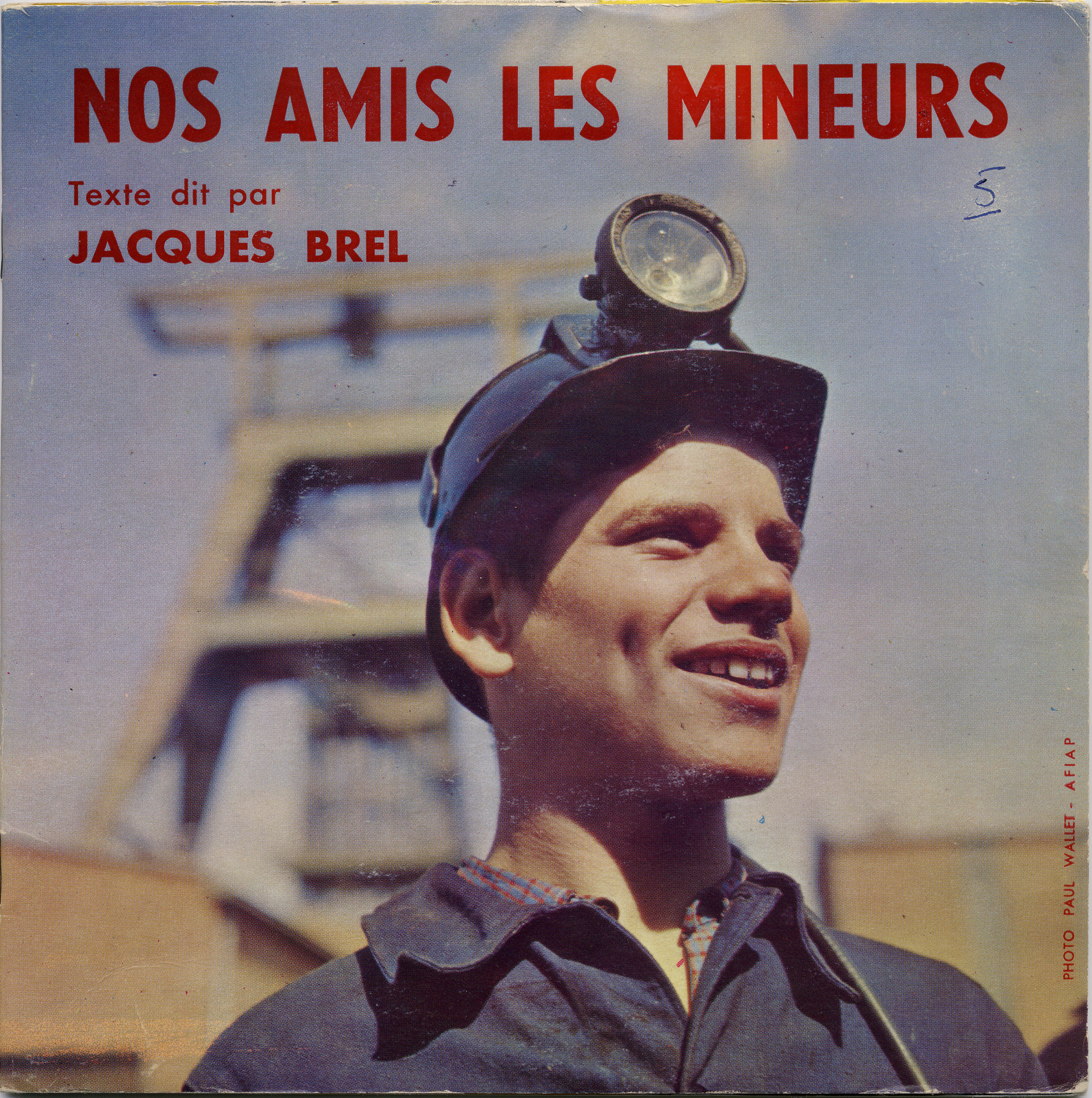 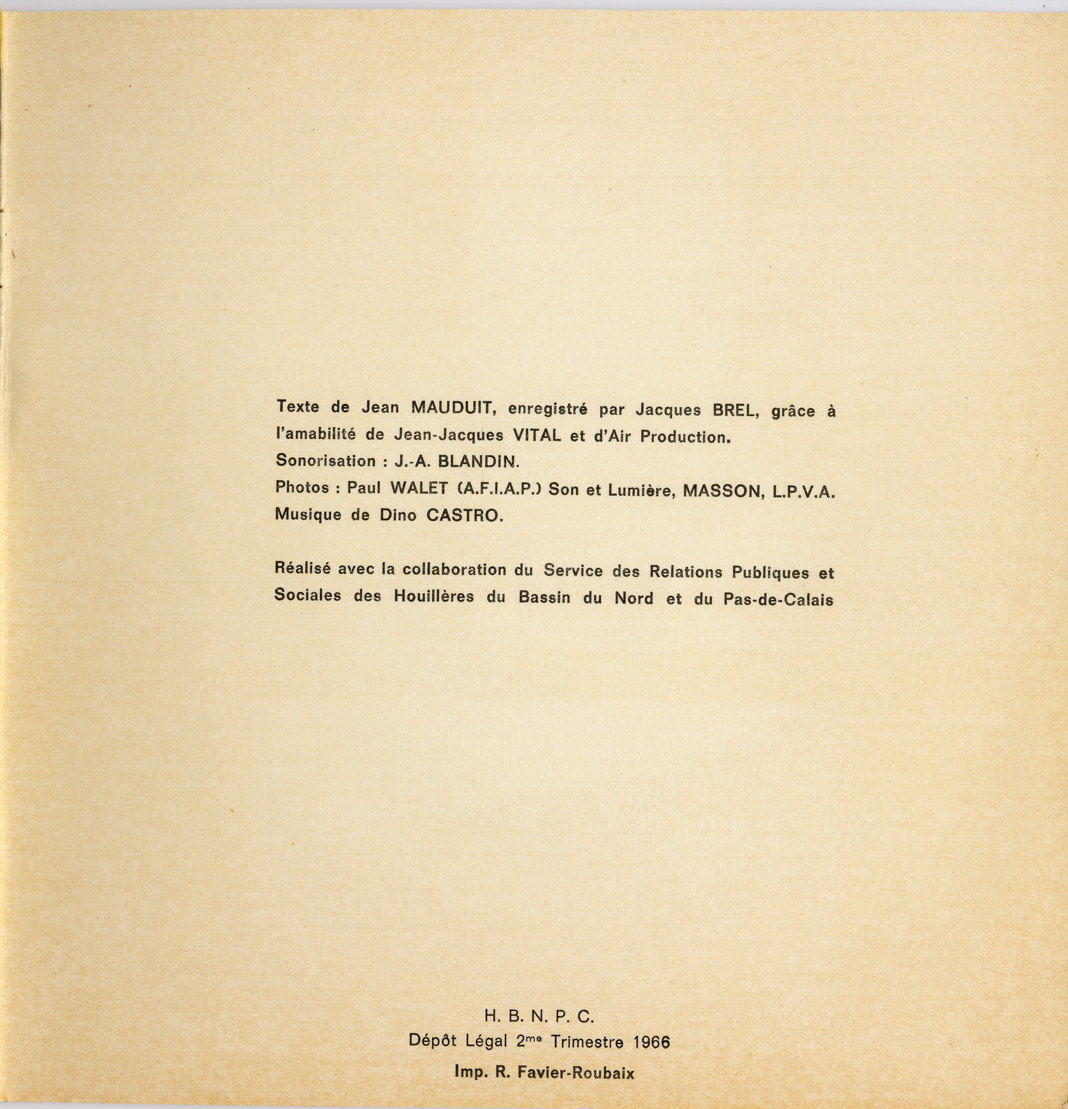 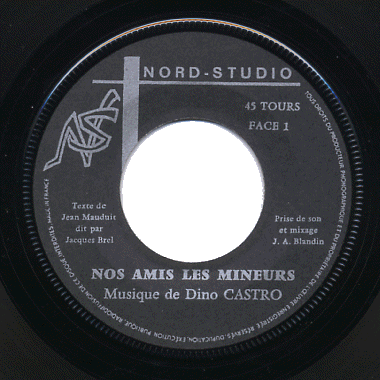 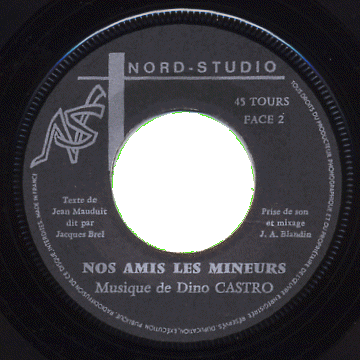
Texte de Jean Mauduit, enregistré par Jacques Brel. Musique de Dino Castro. Published by the Bassin du Nord et Pas-de-Calais Coal mines' Public Relation Service with the aim to narrate the hard but indespensable miners' work. |
39 Barclay 60798, 1967
A. Les cœurs tendres 3:27 |
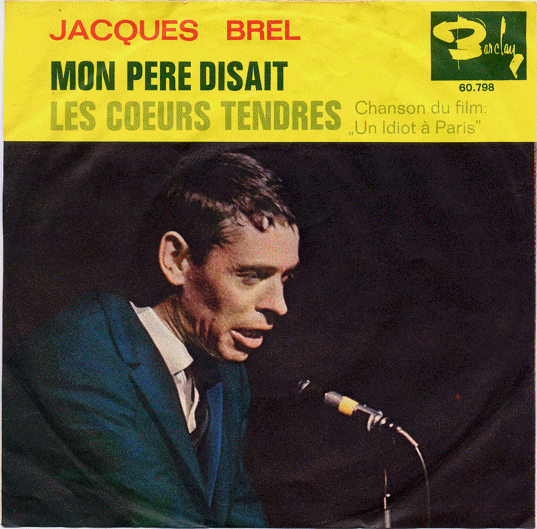 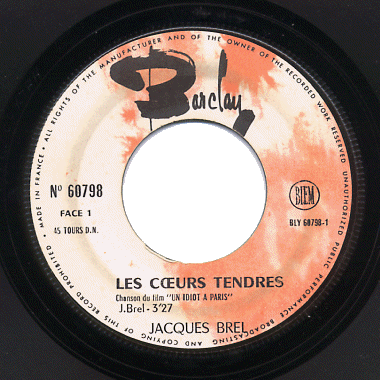 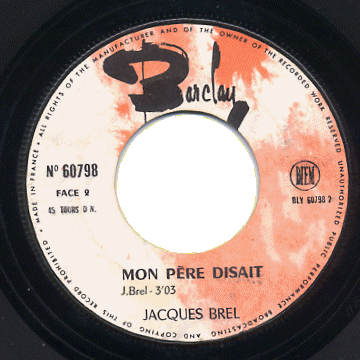
Sometimes, but actually quite rarely, the songs of Jacques Brel were made to be used as soundtrack of a movie. This is the case of Les cœurs tendres, which was recorded on 18 January 1967 and then included in the soundtrack of Un idiot à Paris, first screened on 22 March 1967, a comedy by Serge Korber written by the French master writer Michel Audiard and starring among others Bernard Blier and Yves Richard. |
40 Barclay 60.799, 1967
A. Les bonbons 67 2:59 |
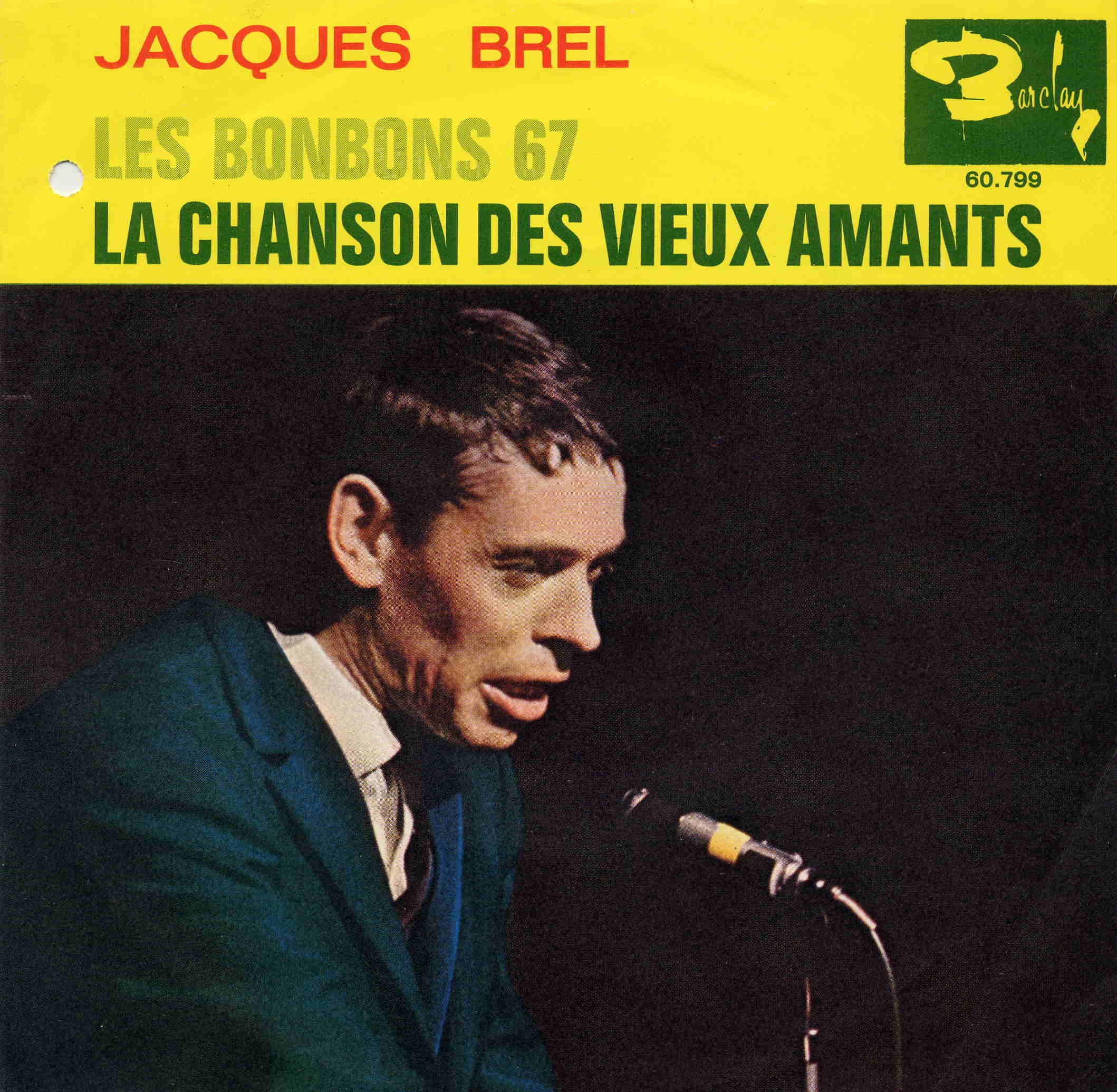 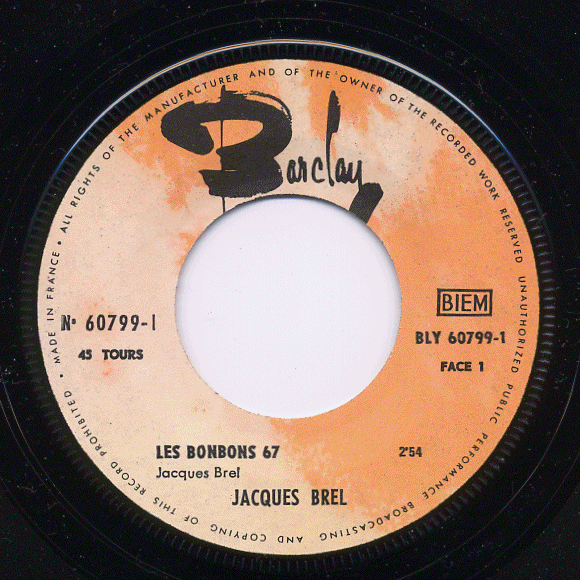 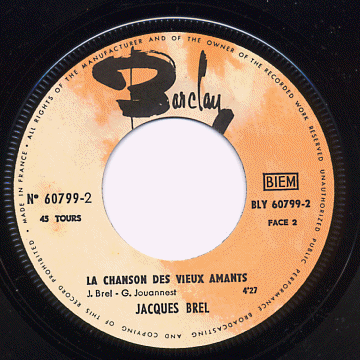
One bizarre thing about Jacques Brel is that he didn't believe in the success of his most famous songs. He didn't believe that Ne me quitte pas and Amsterdam could became his audience's favorites. Now, I don't think that was Brel who decided which songs to put in singles and on which side, but having La chanson des vieux amants backing Les bonbons 67 seems nonsense, at a time when the only-for-jukebox-single era had ended. Or maybe in those years nobody just gave a damn about A-side and B-side. |
41 Barclay 60800, 1967
A. Fils de... 3:51 |
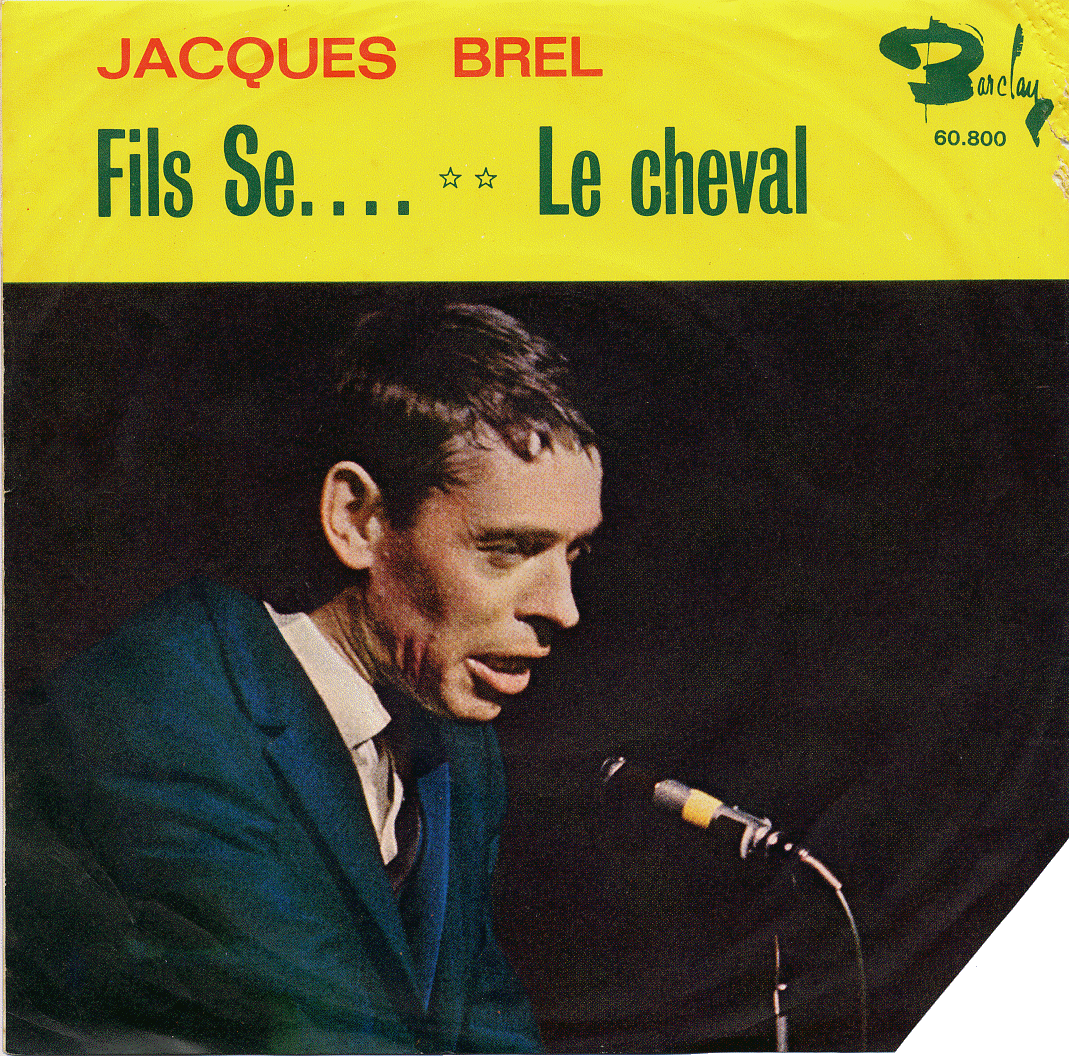 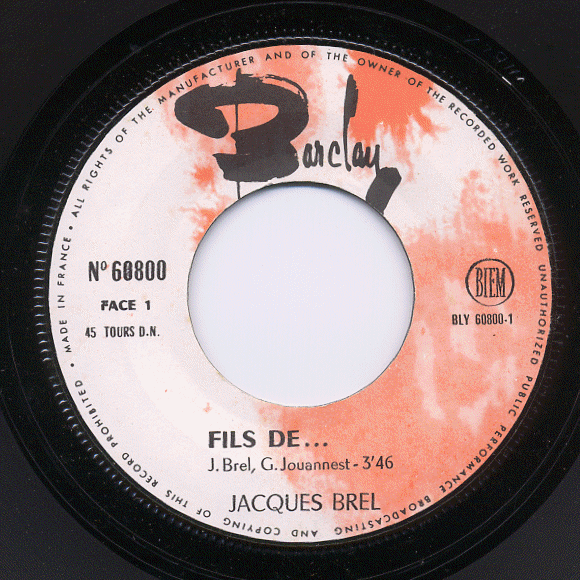 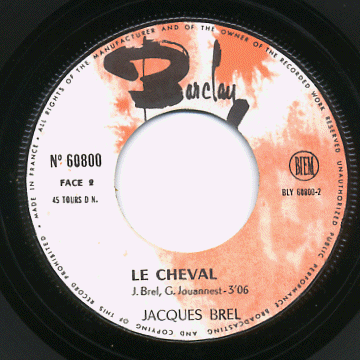
"Fils Se...", mistaken title on the sleeve. |
42 Barclay 60817, 1967
A. La, la, la 4:07 #2 |
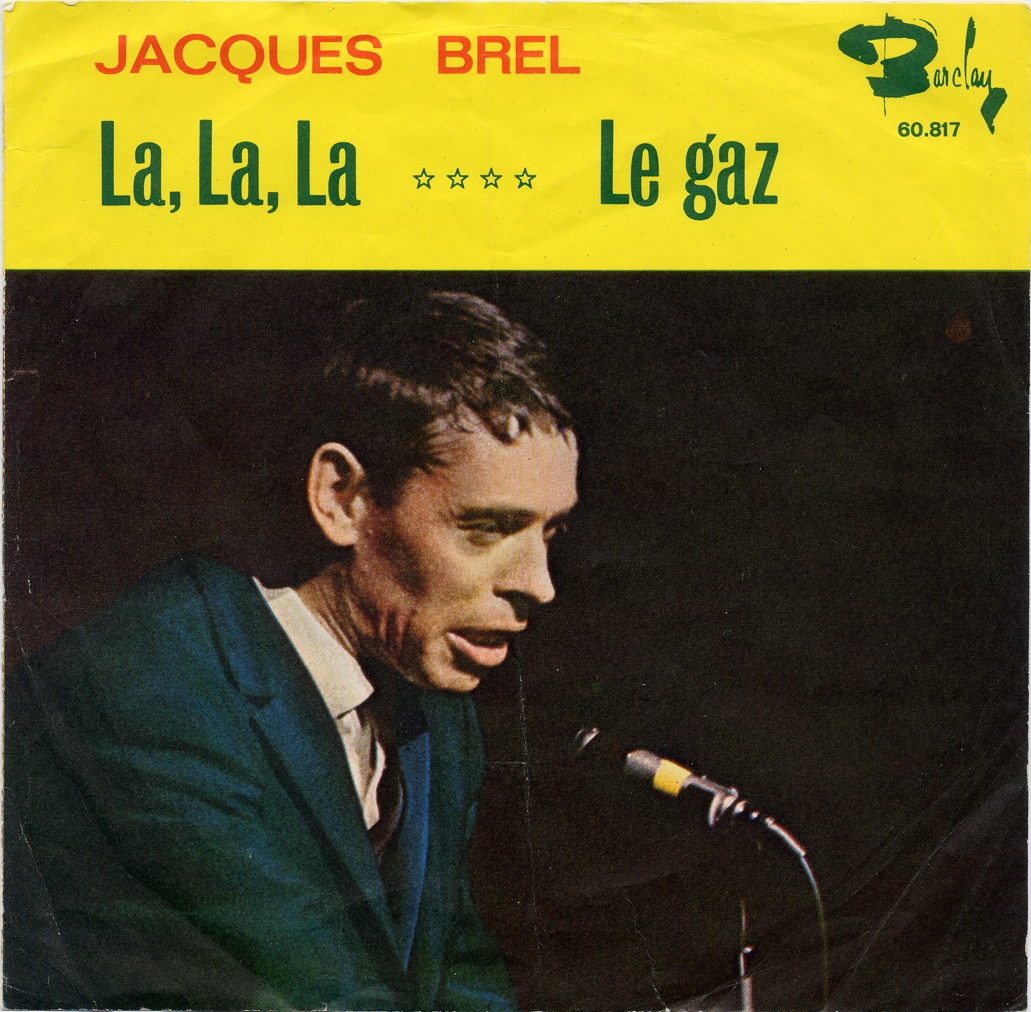 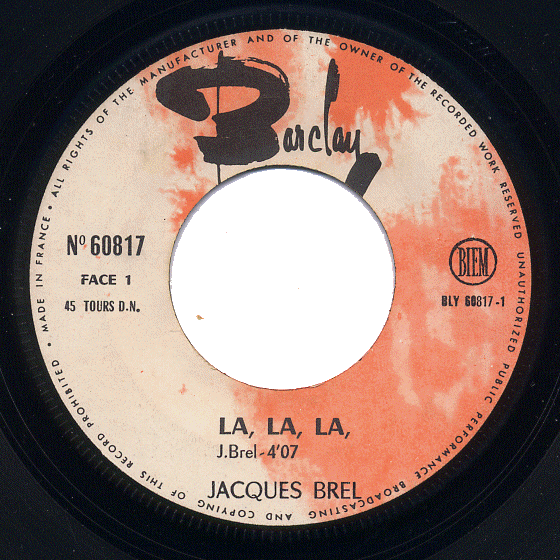 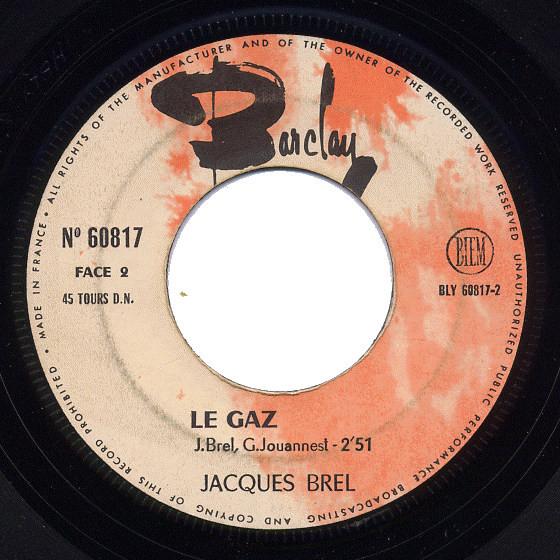 |
43 LA BANDE A BONNOT Bagatelle B 370.920 F, 1968 A. Au restaurant 2:55 |
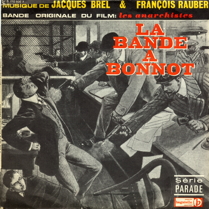 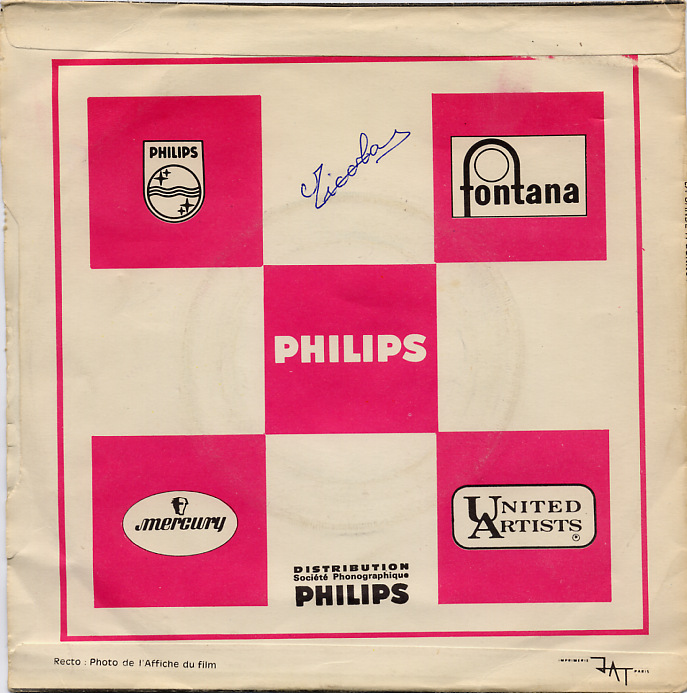 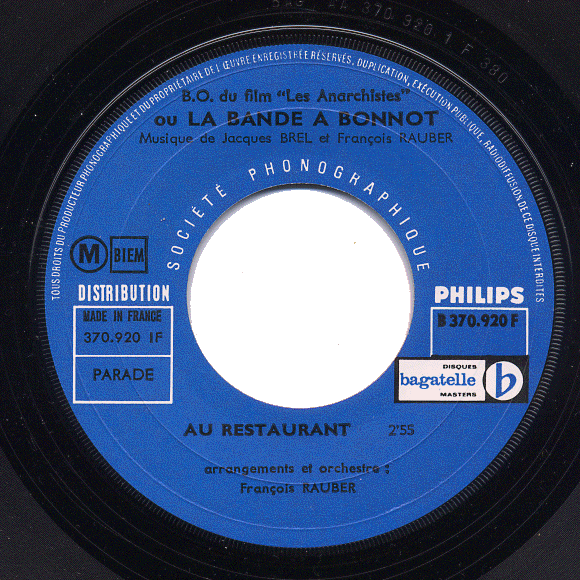 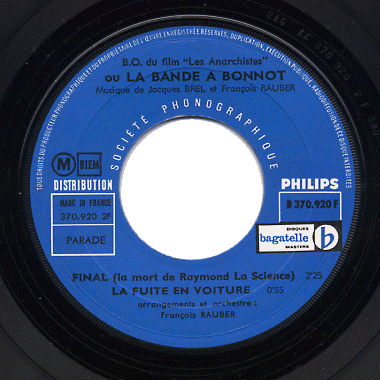 It didn't take long to Jacques Brel to write the music of the films in which he played. La bande à Bonnot was just his second feature film and here we find the single containing the bande originale. Three songs, all instrumental, for which François Rauber is also credited. The label is not Barclay, indeed it was a Philips owned company as it can be seen in the pictures. It certainly was a decision up to the film producers. |
44 Barclay 60975, 1968 A. Le plat pays 2:37 #2 |
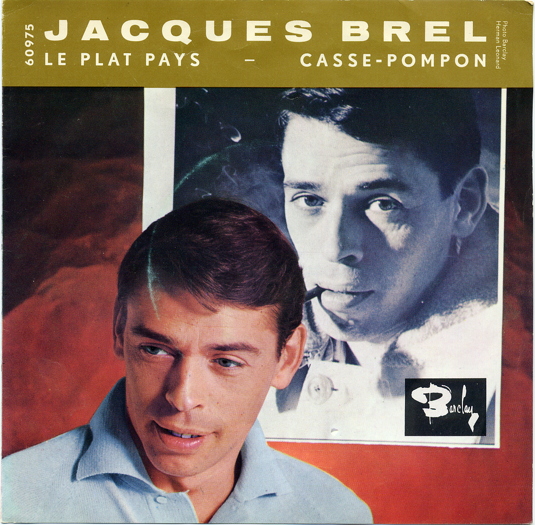 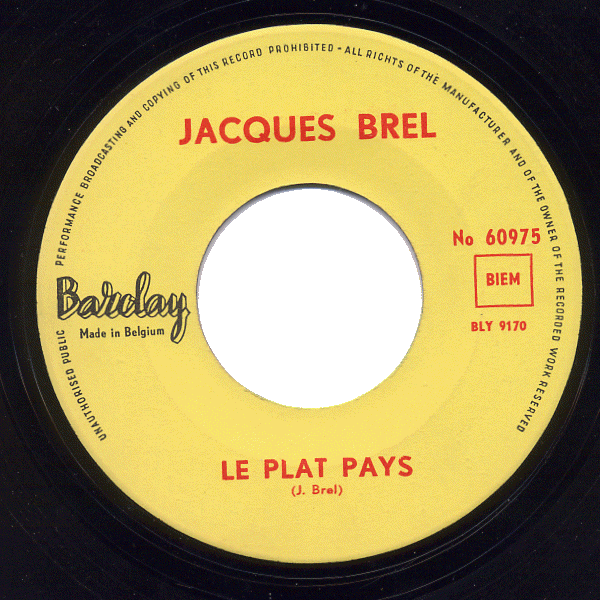 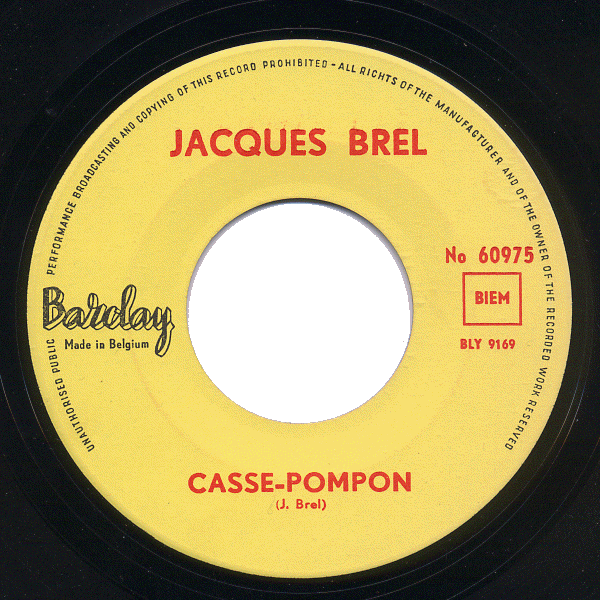 Just like in 1965, Barclay chose a relatively unknown song as a B-side to Le plat pays - with the only difference that in 1965 Le plat pays was the B-side. Good choice, though, Casse-Pompon is a nice divertissement and the idea to recover forgotten valuable songs should be appreciated. |
45 Barclay 60976, 1968 A. Mijn vlakke land 2:55 |
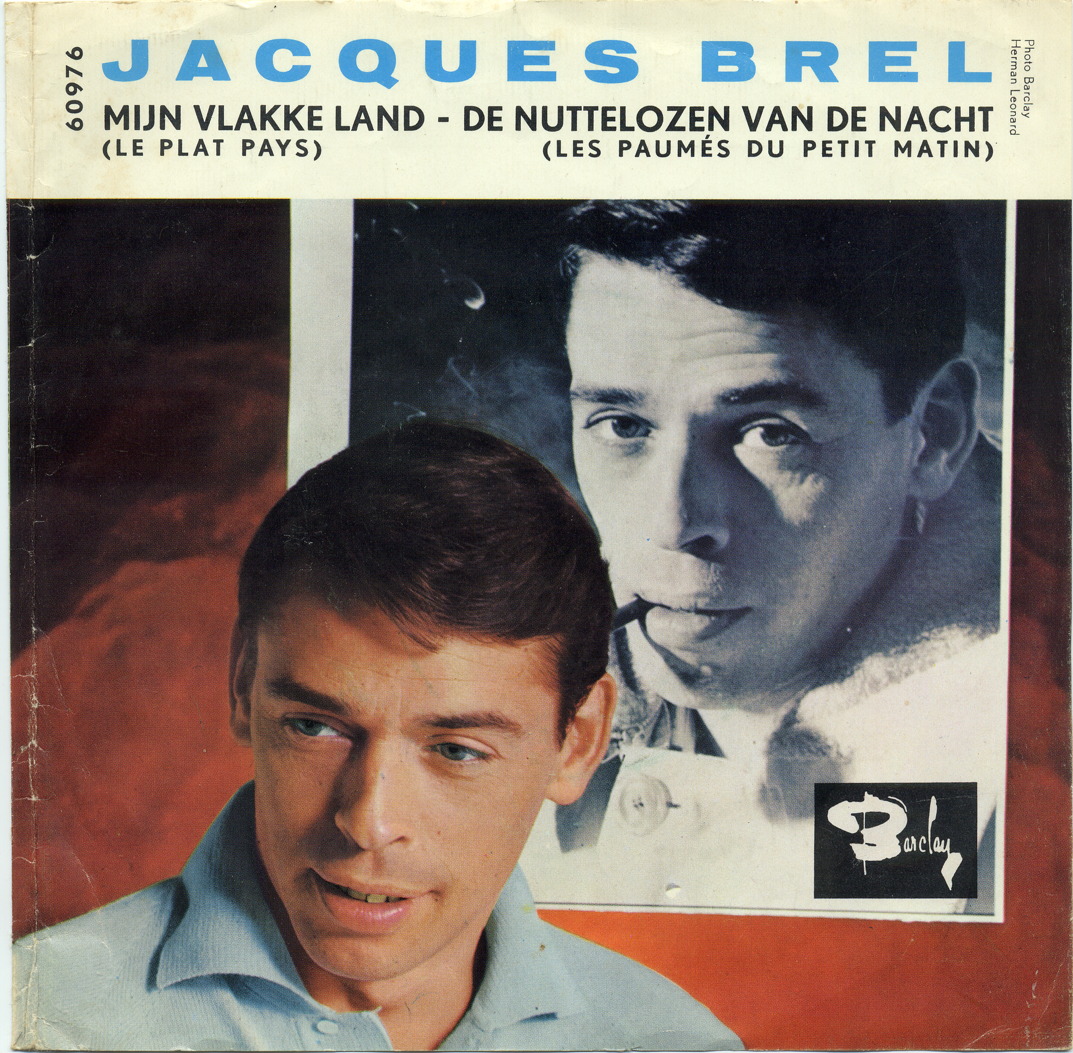 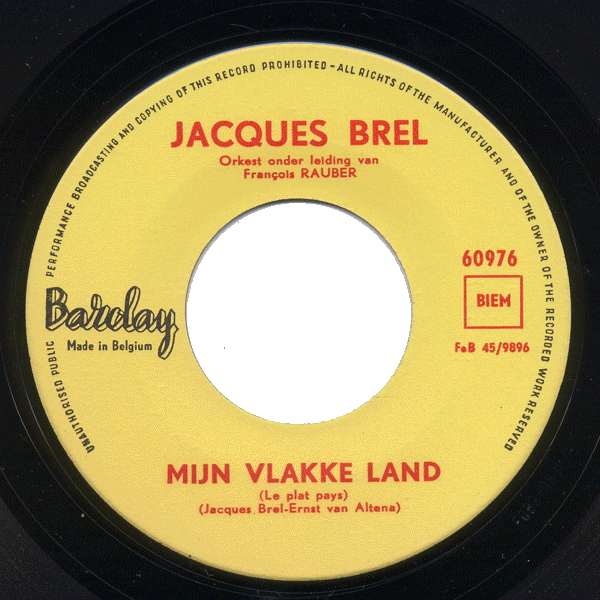 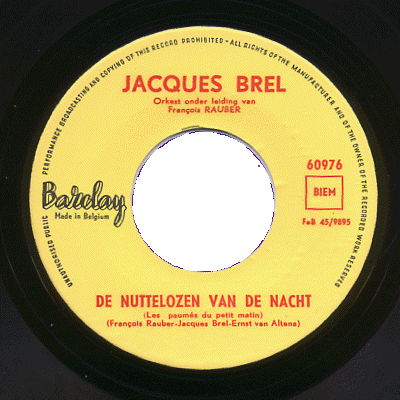
I got the confirmation that only one version of the four Flemish songs exists by reading my friend's René Seghers' majestic biography of Brel. René has a much better musical ear than mine, and I fully trust him. |
|
Barclay 60977, 1968 A. De burgerij 3:04 |
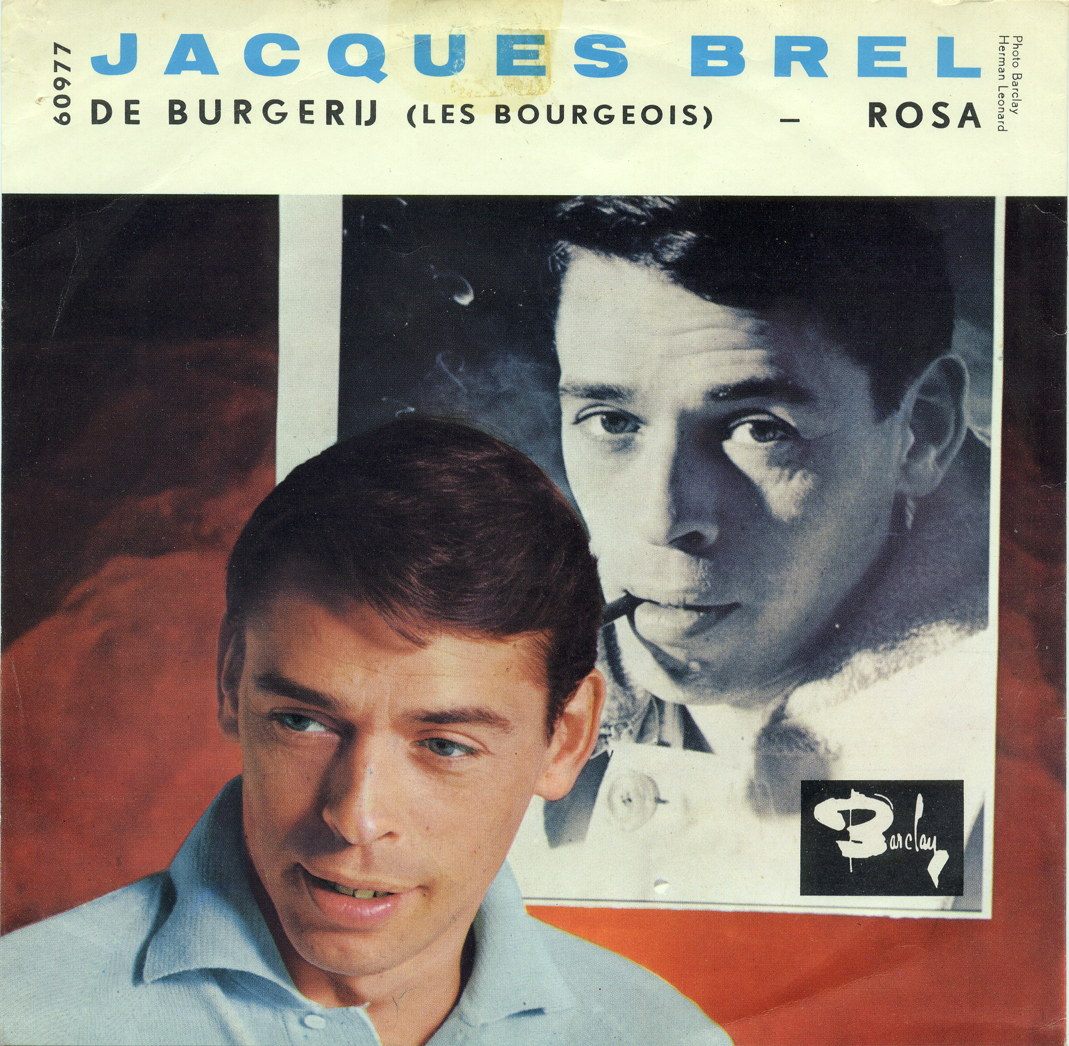 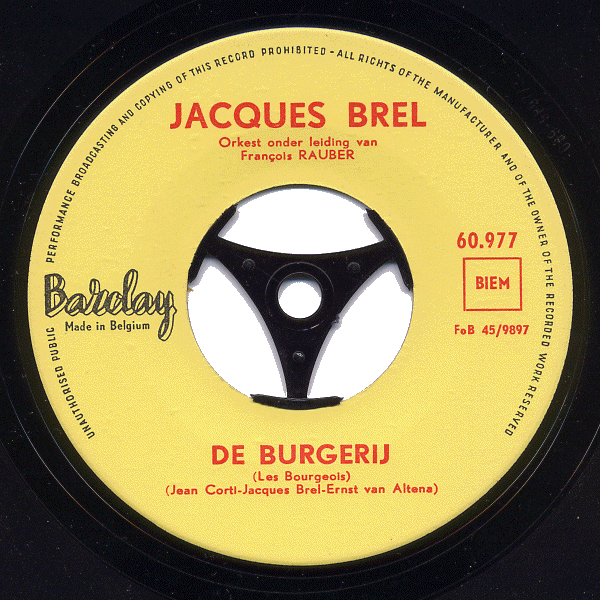 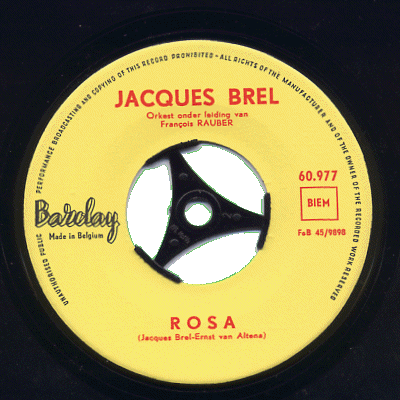 Thus, I can formulate the hypothesis that the four Flemish songs were actually recorded in 1962, because their arrangement is the same of the French songs, which were recorded in 1962. Then, they remained in a drawer until 1965, when they were published as two singles in France and subsequently as an EP. These two singles aren't but the later Belgian release, once again accompanied by another single with the original French version of Le plat pays. |
47 Barclay 60980, 1968
A. J'arrive 4:40 |
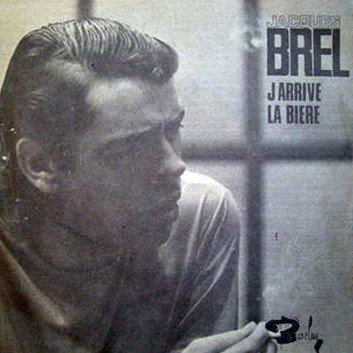
Promo and juke-box only |
48 Barclay 61025, 1968
A. Aldonza 4:18 |
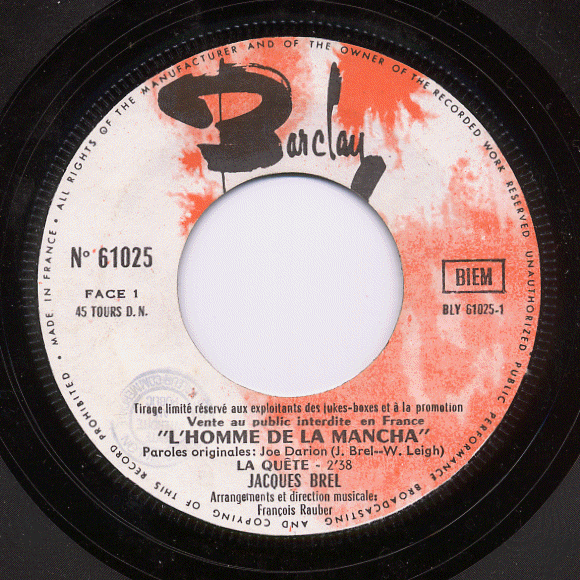 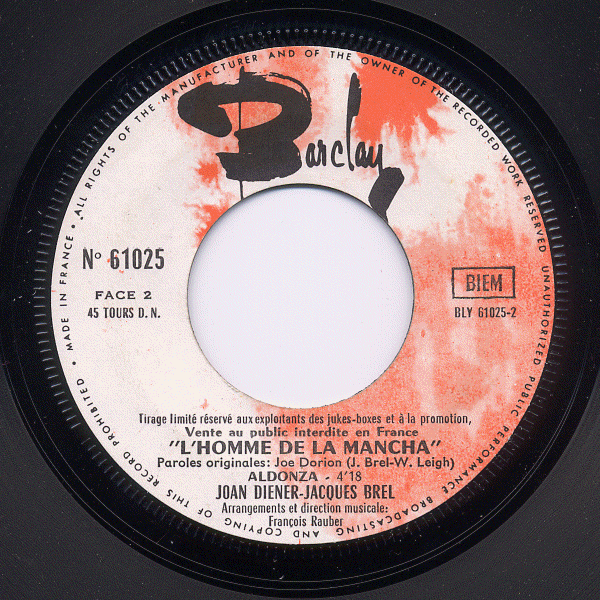
Promo and juke-box only |
49 Barclay 61.053, 1969
A. Vesoul 3:03 |
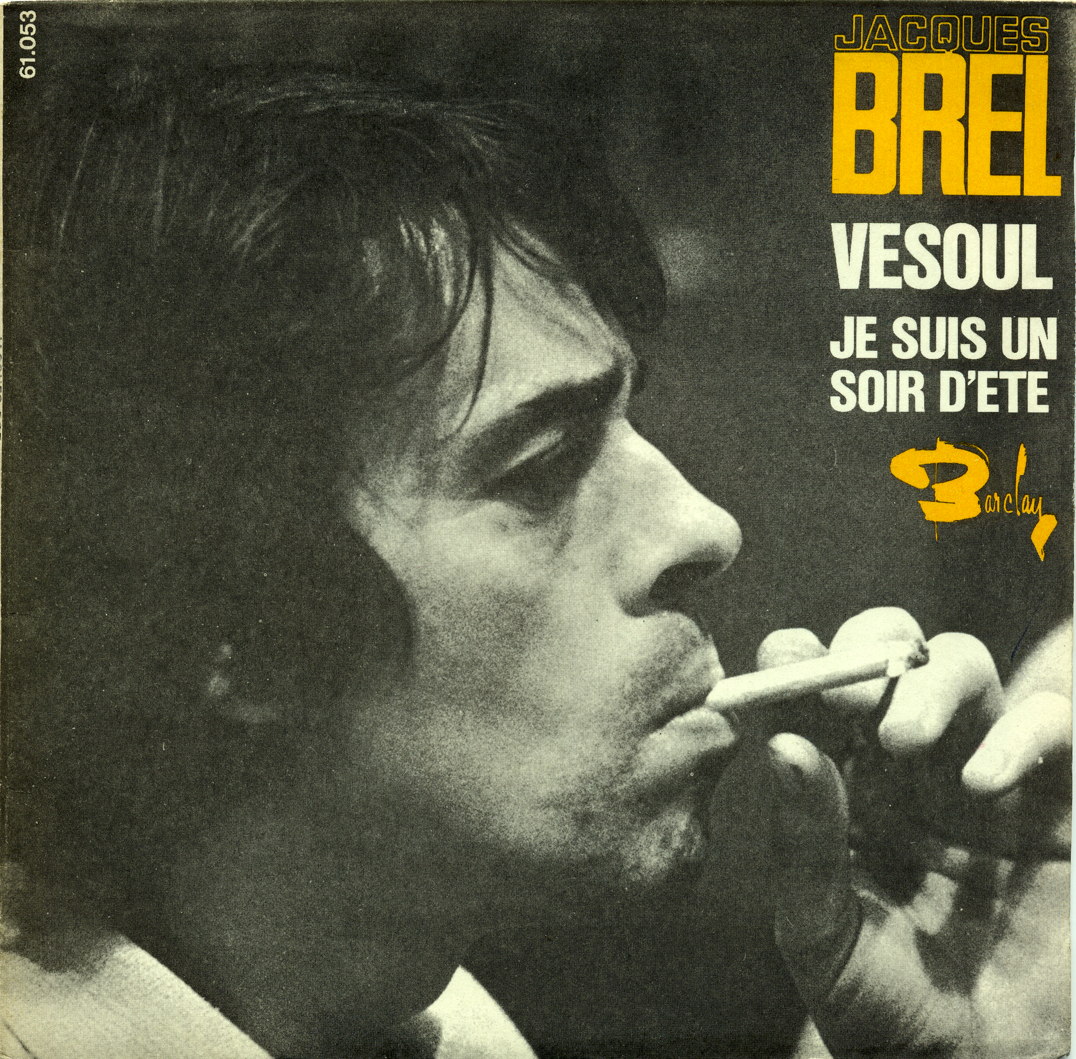 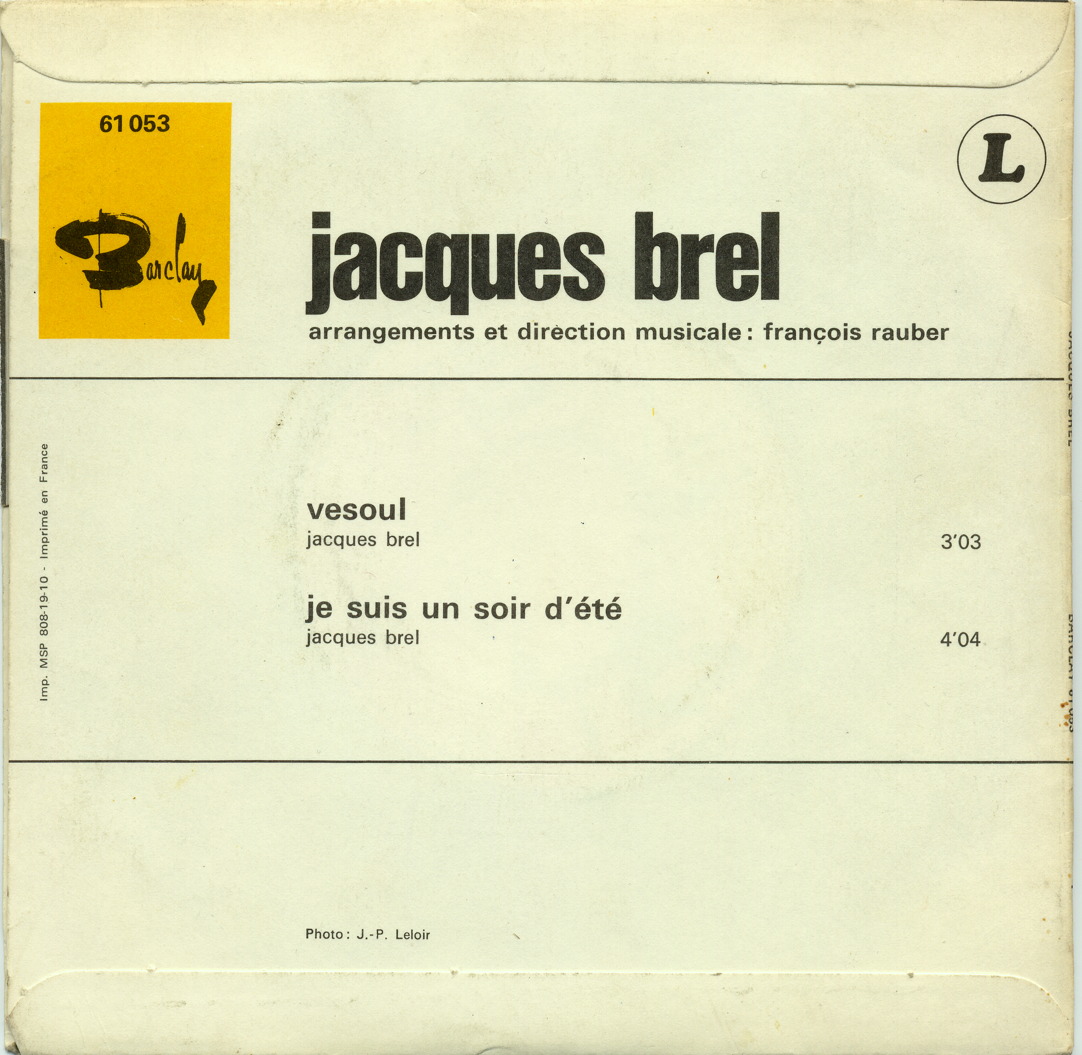 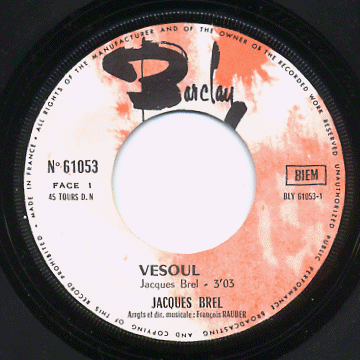 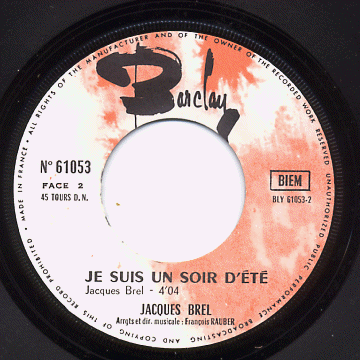 |
50 Barclay 61058, 1969
A. La quête 2:38 |
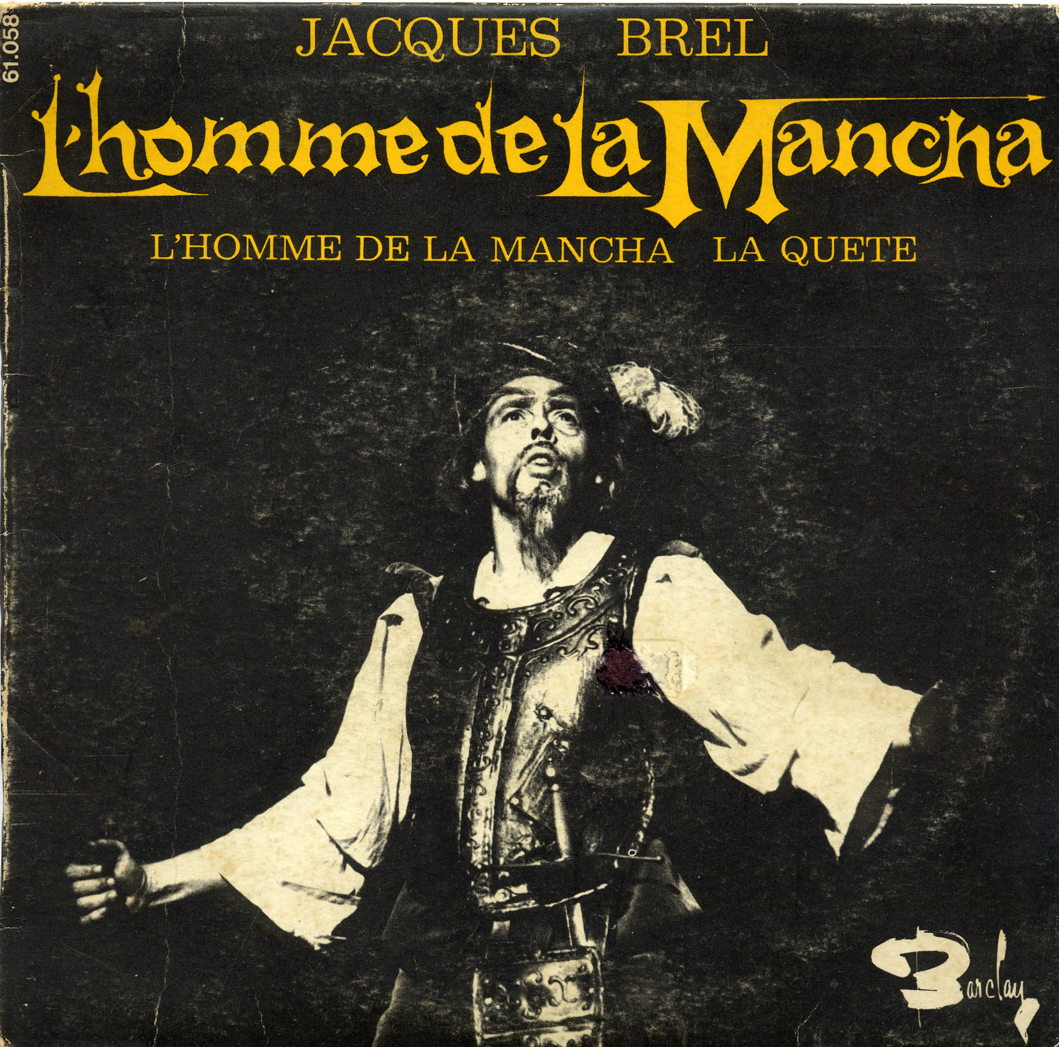 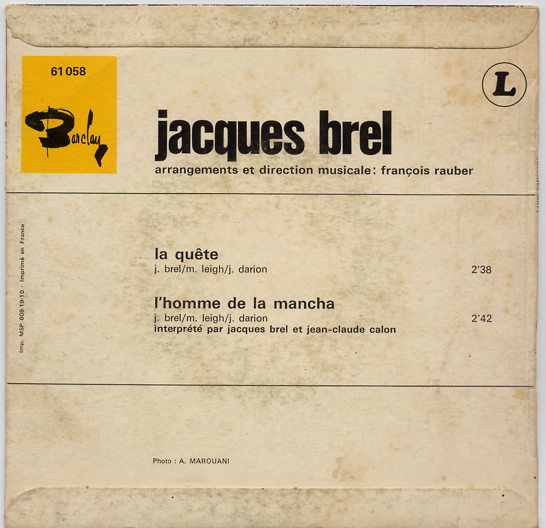 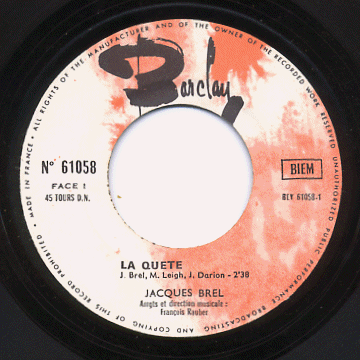 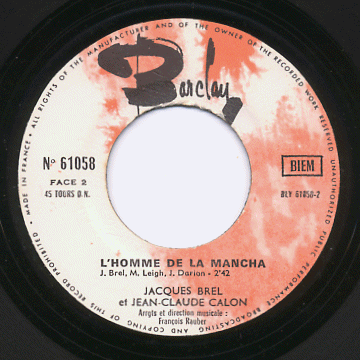 |
51 Barclay 61103, 1970
A. Le plat pays 2:37 #2 |
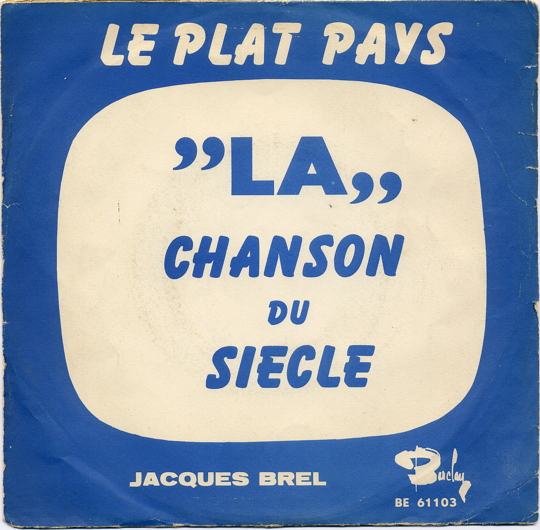 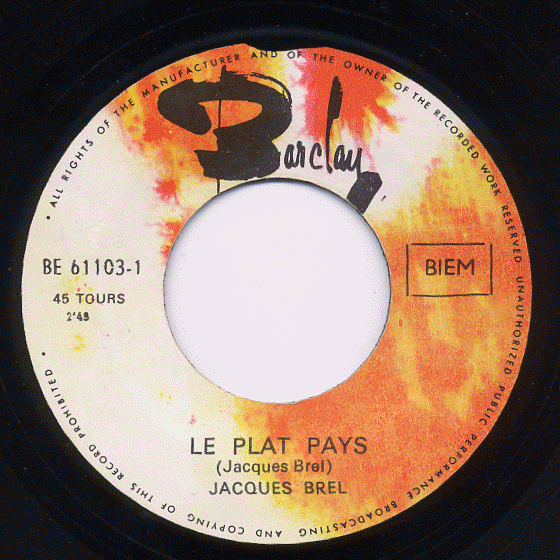 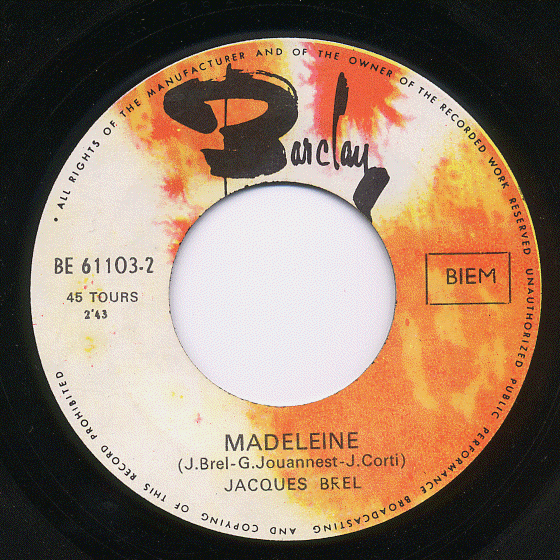
Well, for the third Le plat pays single the folks at Barclay should have got tired to pair the Flanders' anthem to a little unknown song. This time they used Madeleine as B-side. After all, they can be understood: the terror for a plunge in revenues due to Brel's retirement from music must have been huge. Two years have passed from his last studio album, one year from L'homme de La Mancha, yet in 1970 Jacky was thinking only to movies, although he was still under contract to Barclay. |
52 FRANZ Barclay 61567, 1972
A. Franz valse (Joué au limonaire Hooghuis) 2:16 |
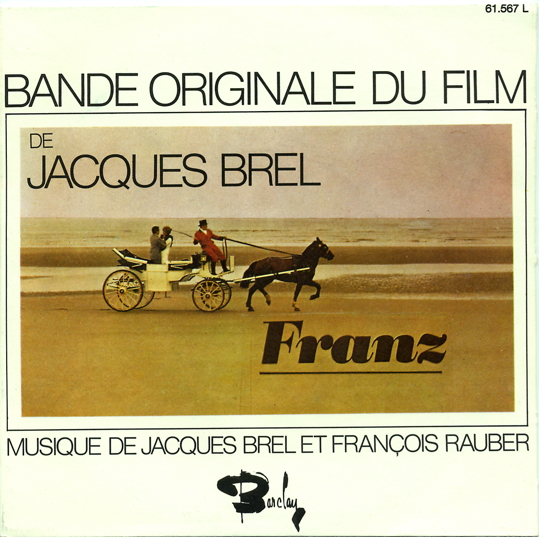 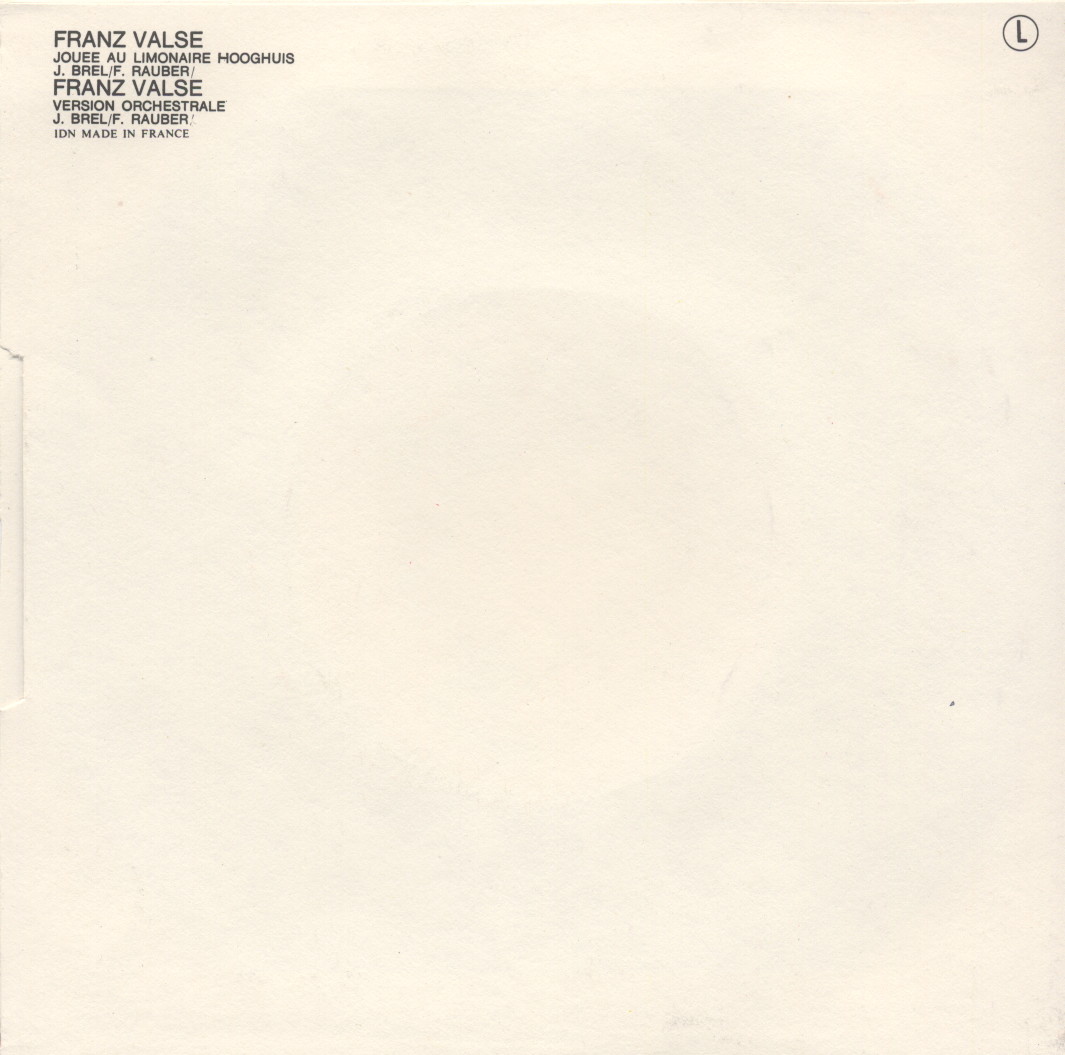 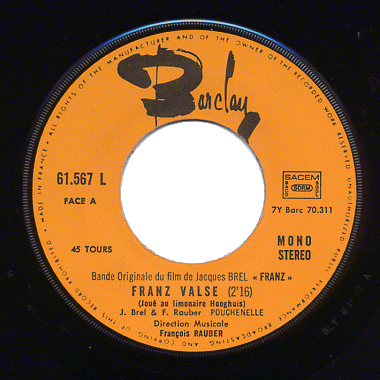 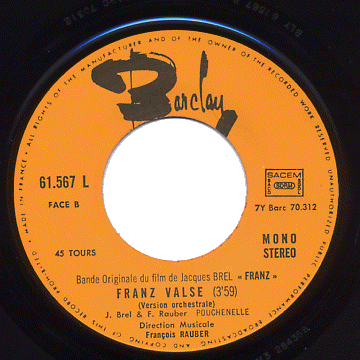
For the first (and beautiful) movie he directed, Brel's original score was published by Barclay. But this time he was involved in the production. |
53 Barclay 61676 (and 61676J), 1972
A. Ne me quitte pas 4:13 #4 |
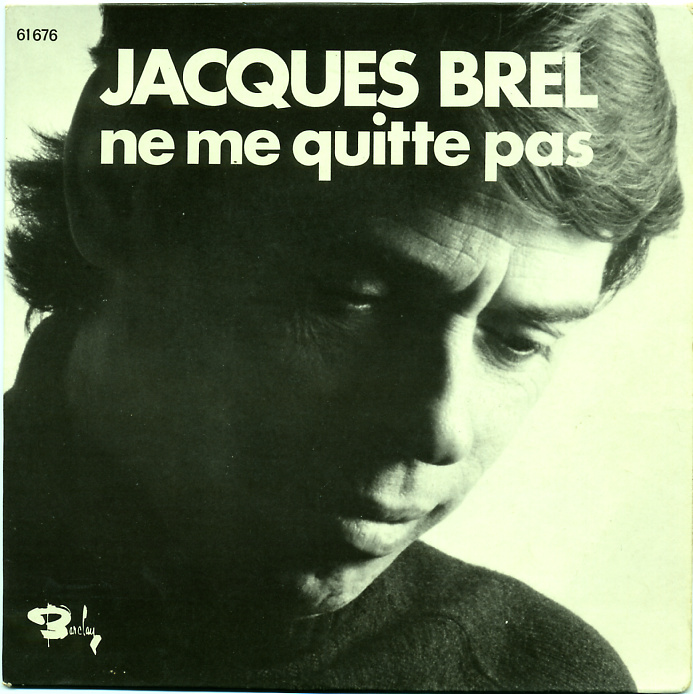 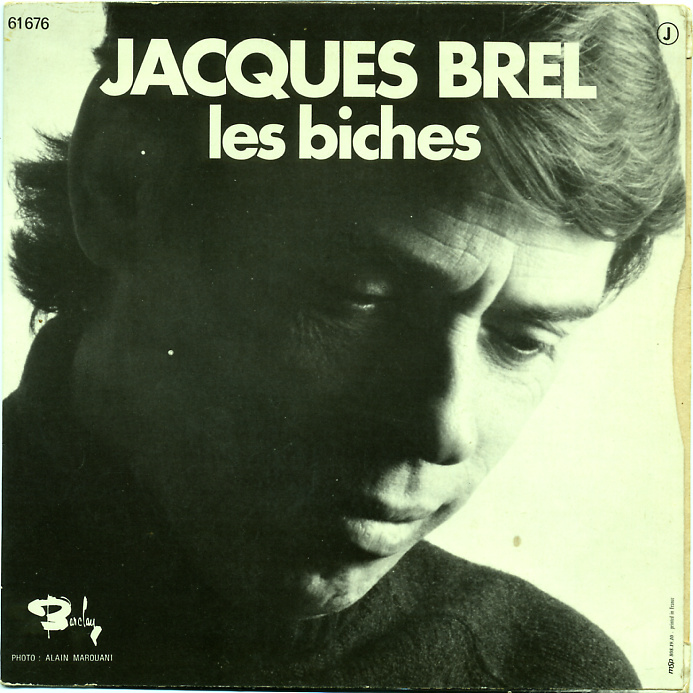 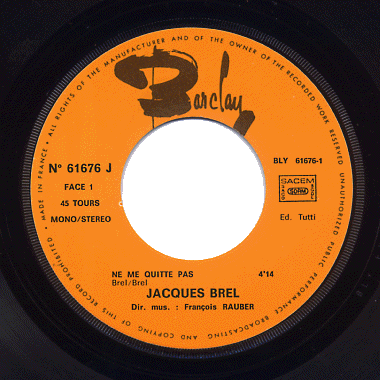 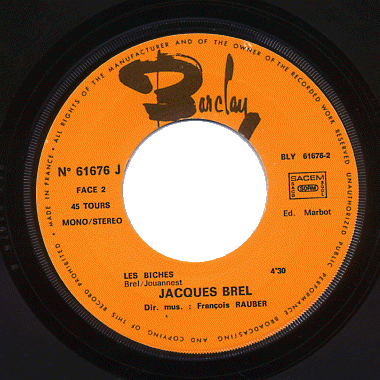
In 1972 Jacques Brel returned to the Barclay studio to accomplish his duties with M.Barclay, and having no new song in his bag, he remade some of his old hits (all published under Philips) with new, "modern" arrangements. Musically, the result was very disappointing, nonetheless Barclay was eager and ready to fill record stores with the new LP and with a bunch of singles, most of which nonetheless included only songs in the old well-known versions. |
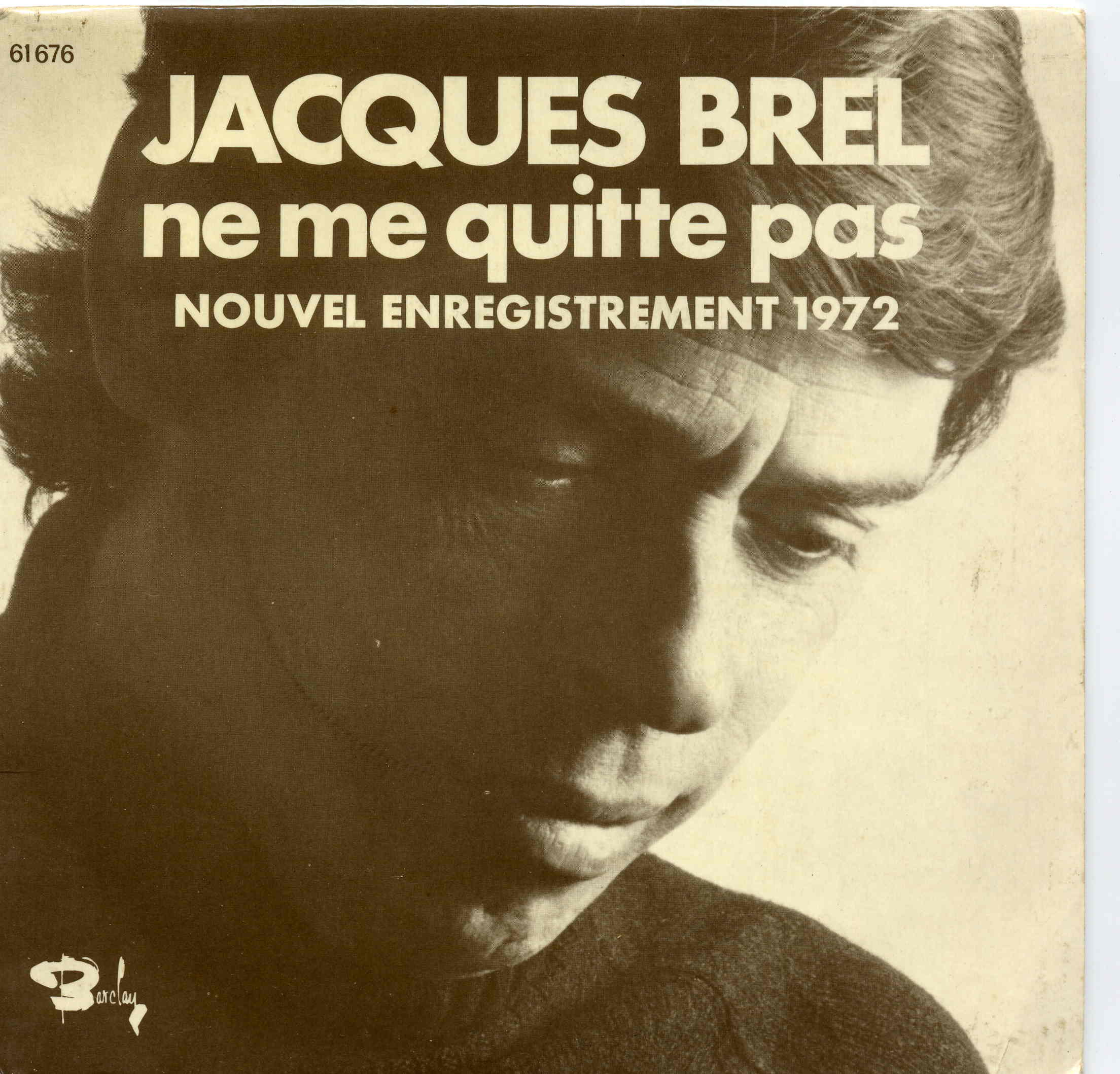 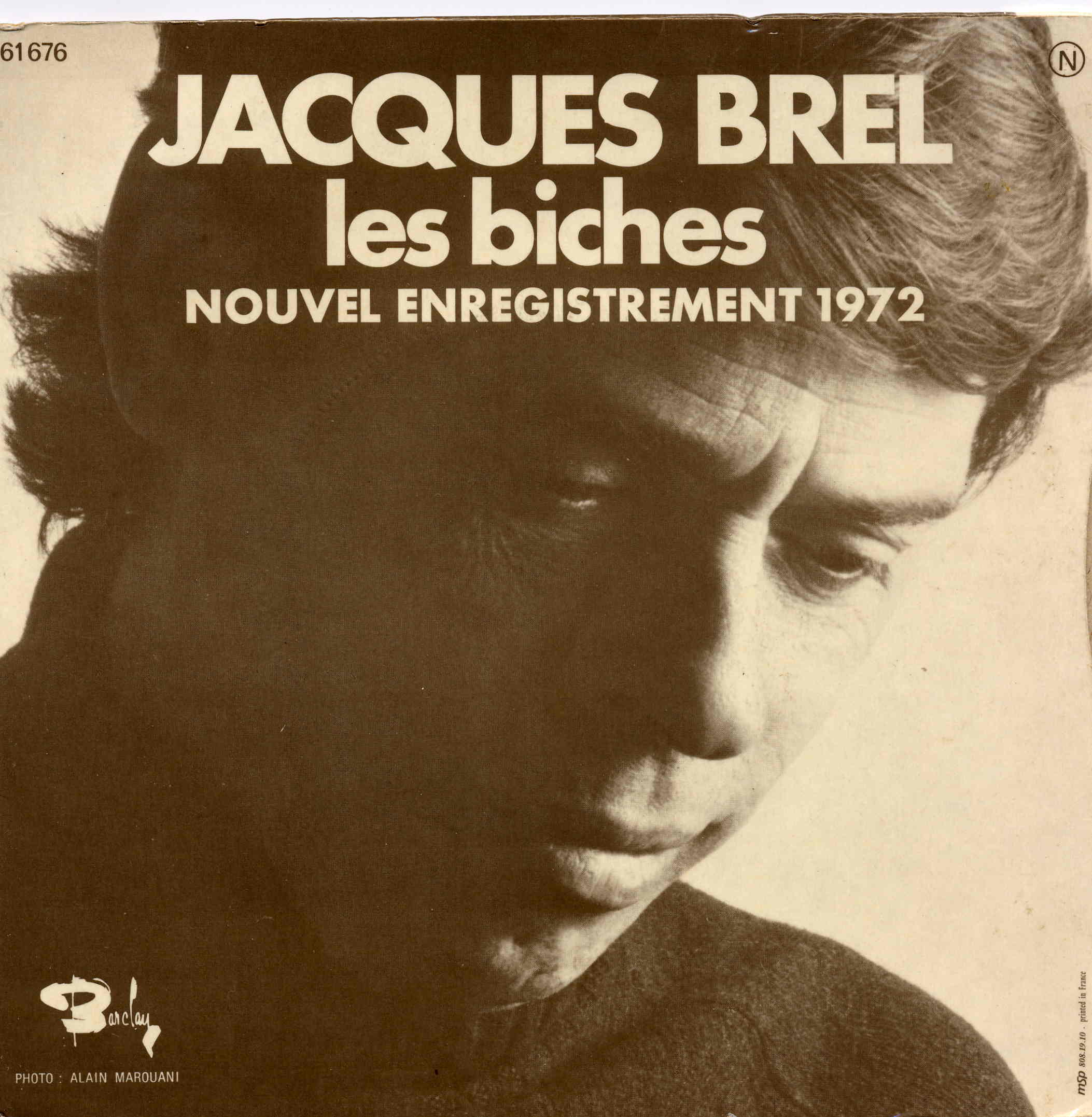 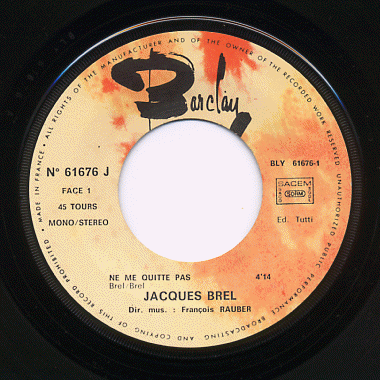 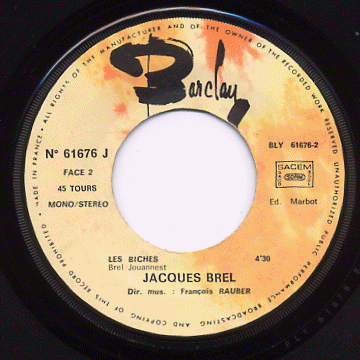
The first of the lot of singles that followed had two different releases, one of them showing clearly to the buyer that it was the new recording of 1972. I don't know which of the two is the original issue and which is the reissue. However, all but one of the following singles included old recordings, thus no indication was provided anymore. Likely, everybody at Barclay agreed that the good old songs were better than the new ones. |
|
54 Barclay 61789, 1973
A. L'enfance 2:40 |
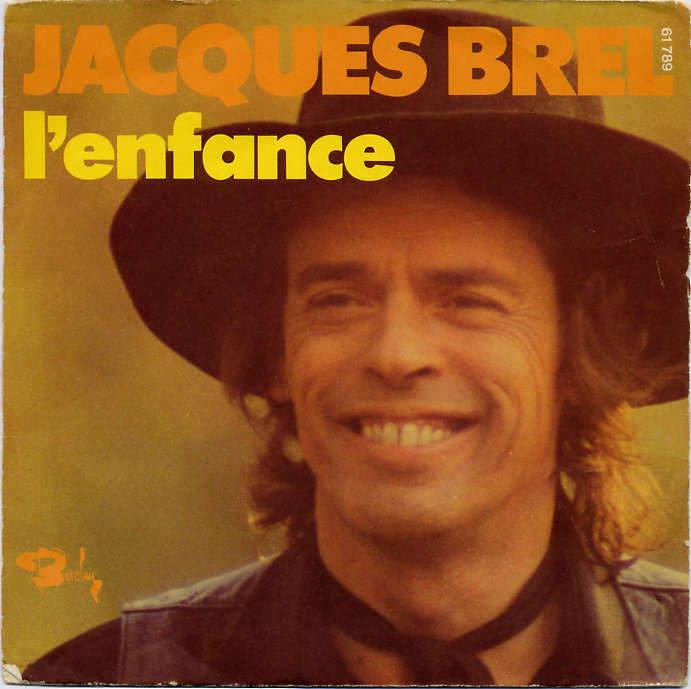 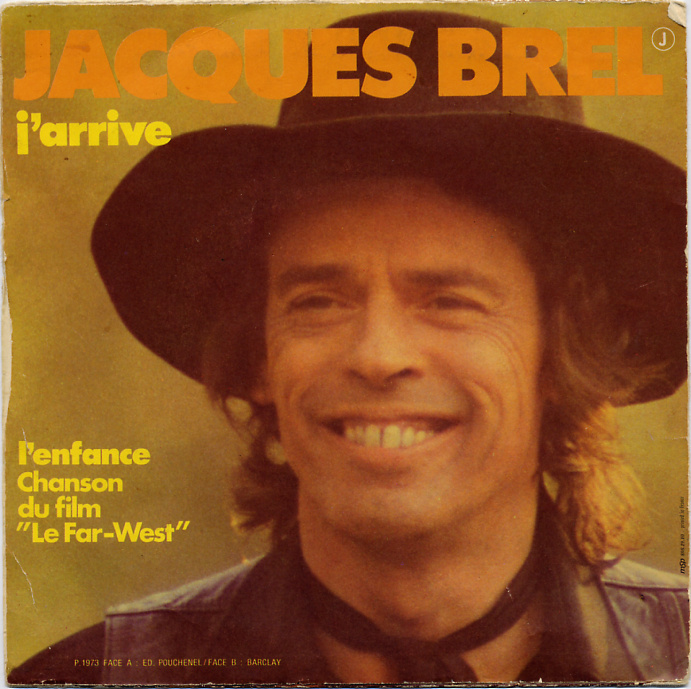 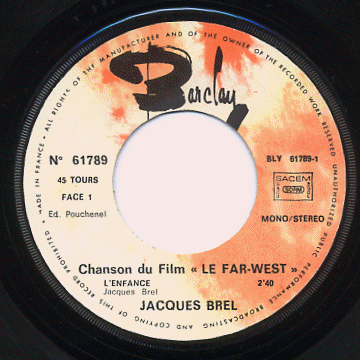 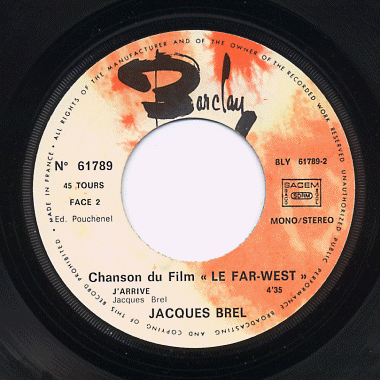 |
55 CAM SAG 41132, 1973 A. L'emmerdeuse 2:20 |
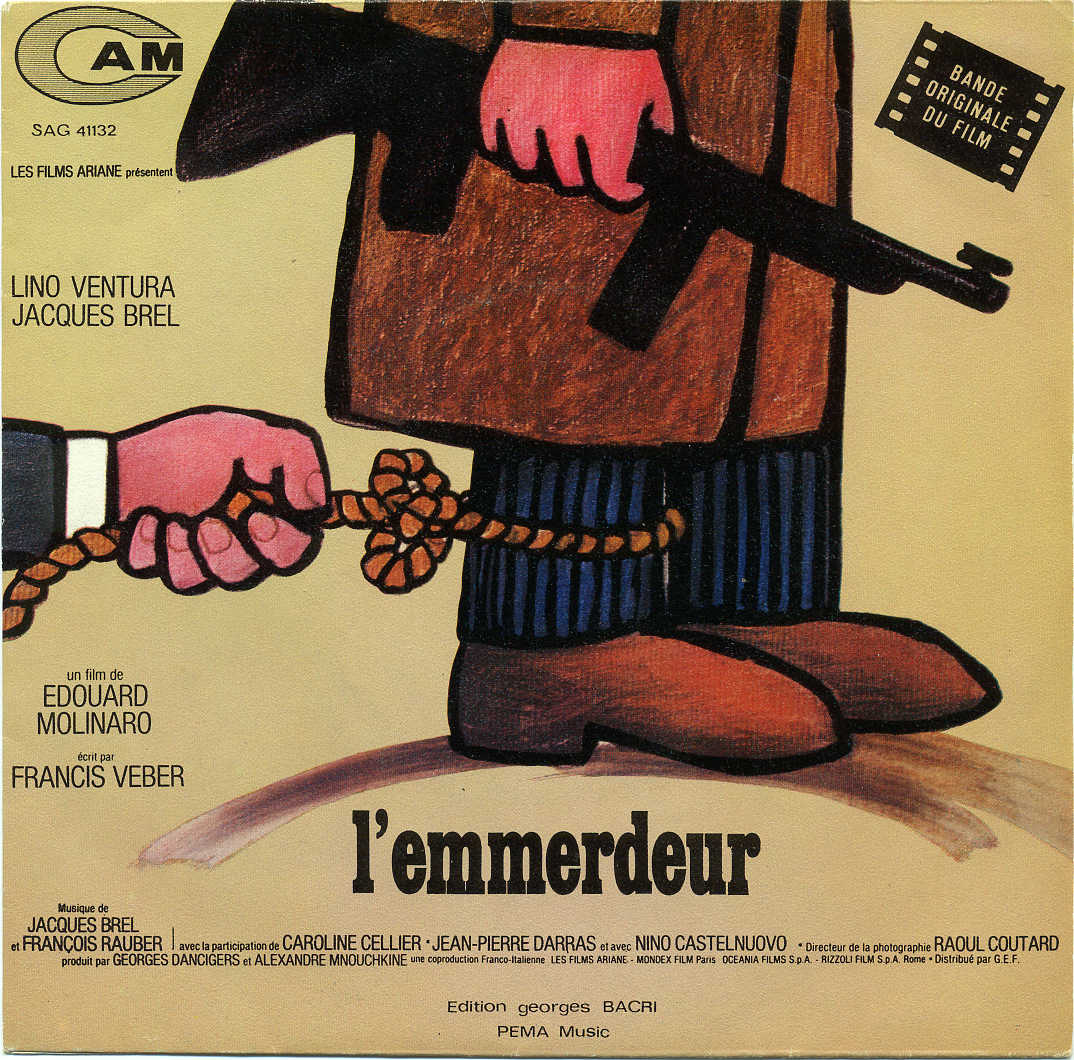 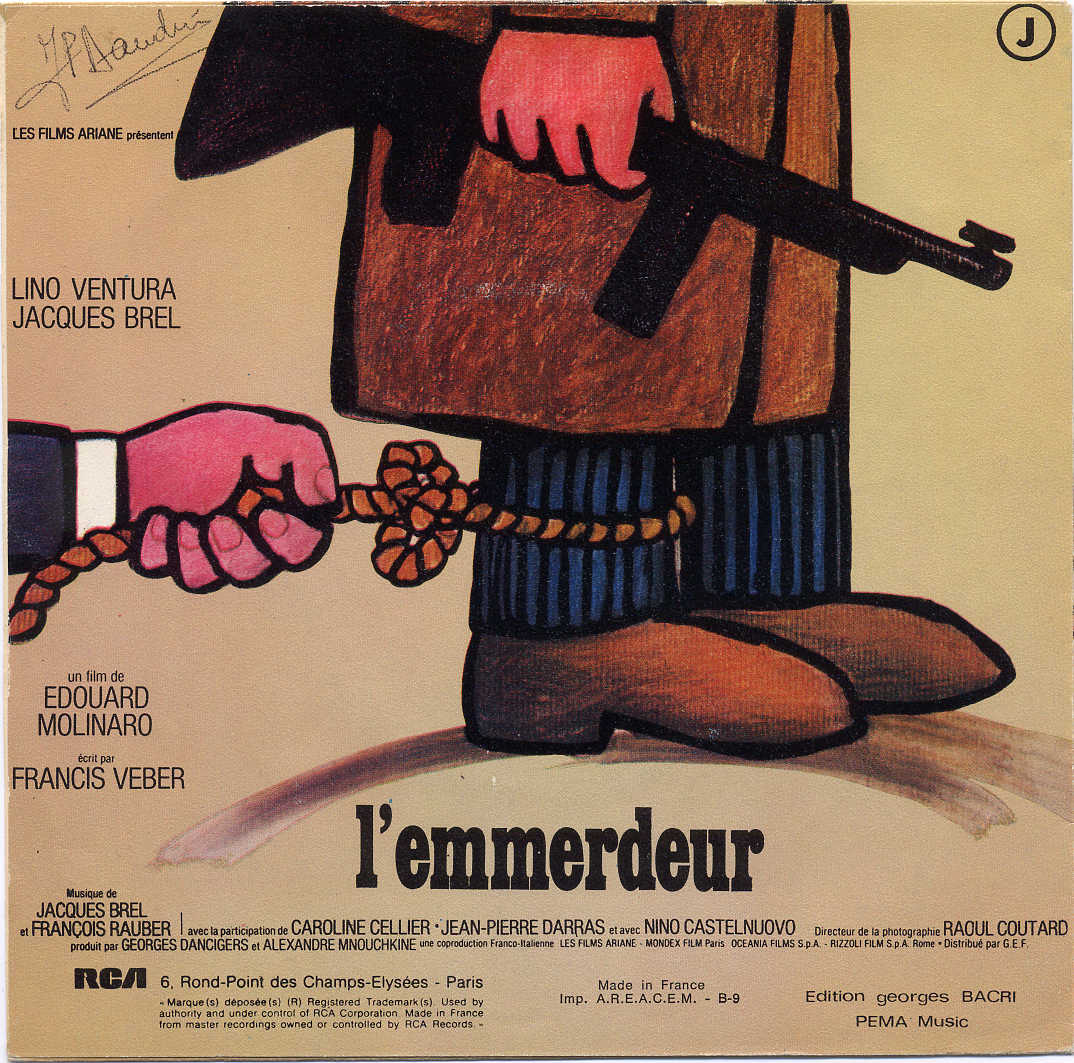 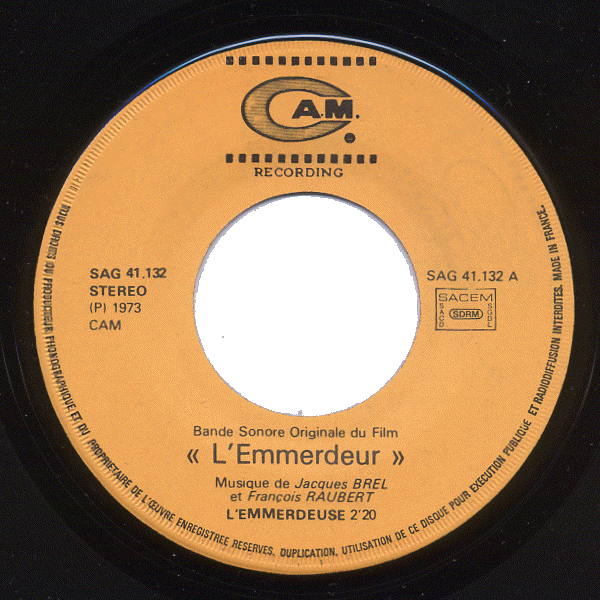 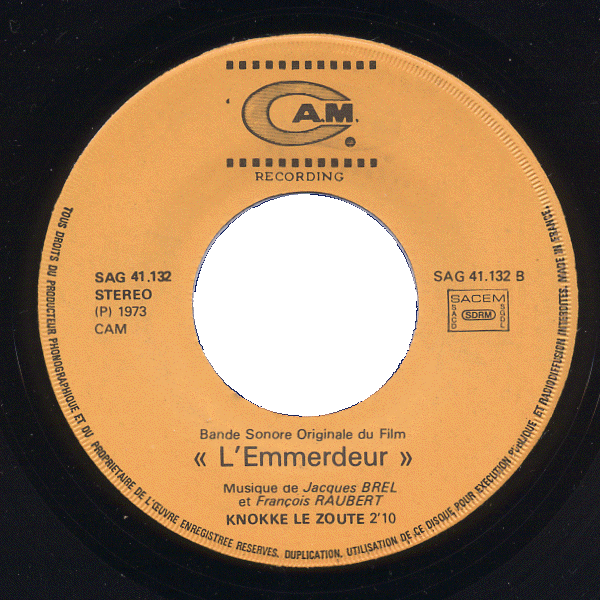 |
56 Barclay 61 837, 1973 A. Madeleine 2:39 #2
|
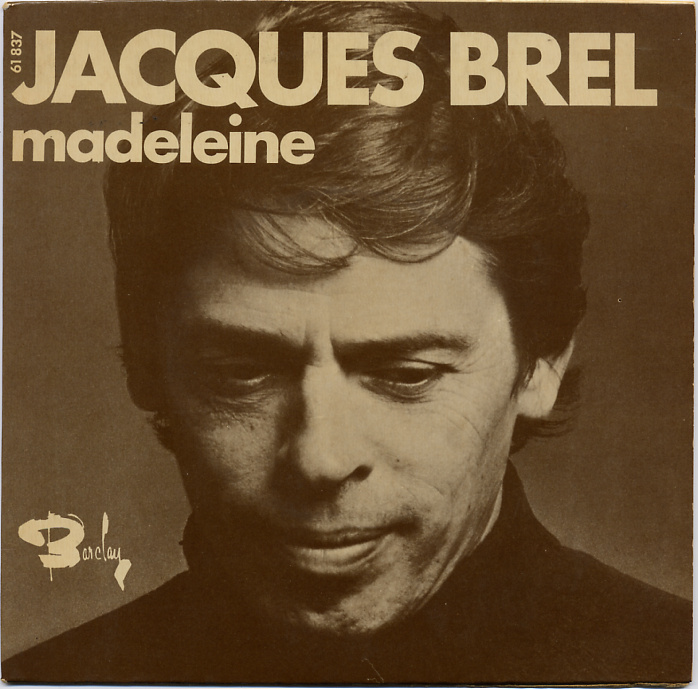 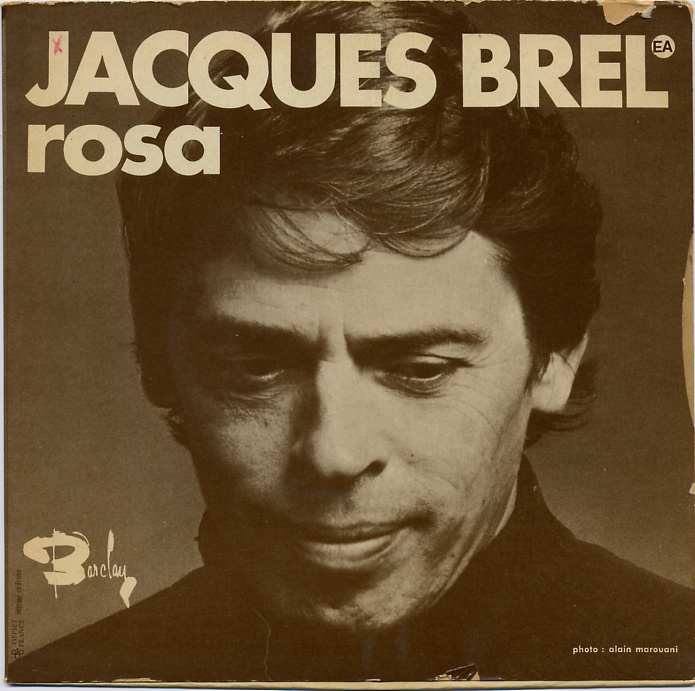 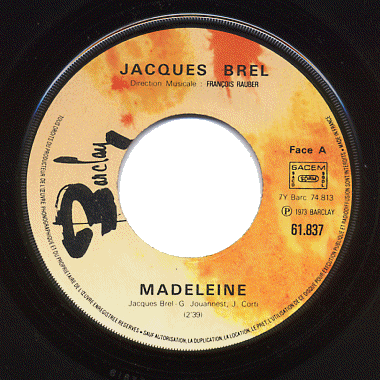 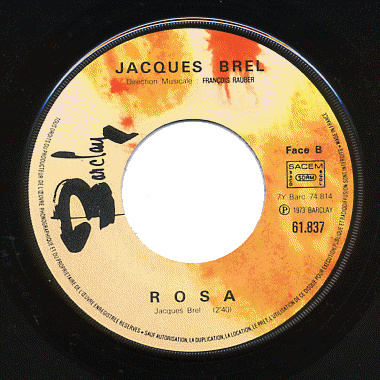
Second and biggest wave of reprints (10 singles) of songs issued in 1962-68 by Barclay, timely for Christmas 1973. Reprint of songs issued in 1962 |
57 Barclay 61 838, 1973
A. Les bourgeois 2:52 #2
|
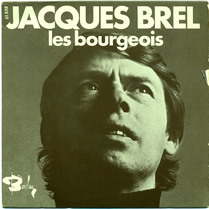 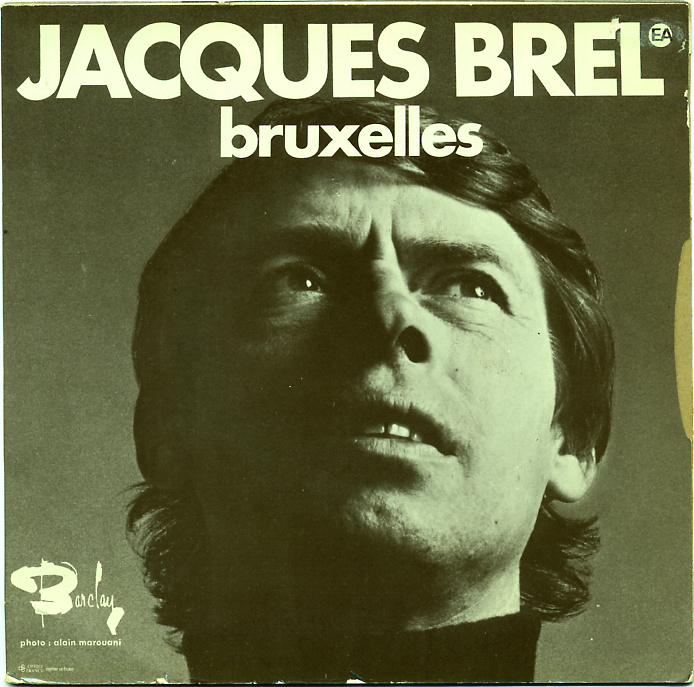 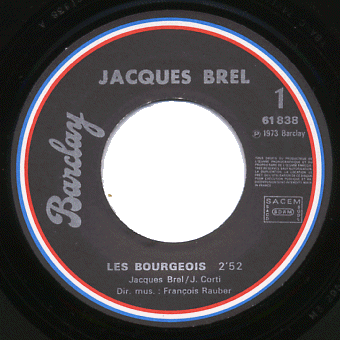 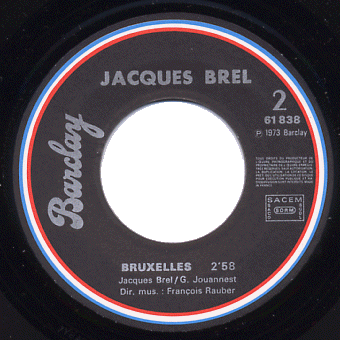
Reprint of the songs issued in 1962. The sleeves of all these singles have a picture of Jacques Brel, shot in 1972, him wearing a turtleneck sweater. The picture is in b/w and is the same on front and back, with only the track title changing. Every single had a different picture. |
58 Barclay 61 839, 1973 A. Le plat pays 2:37 #2
|
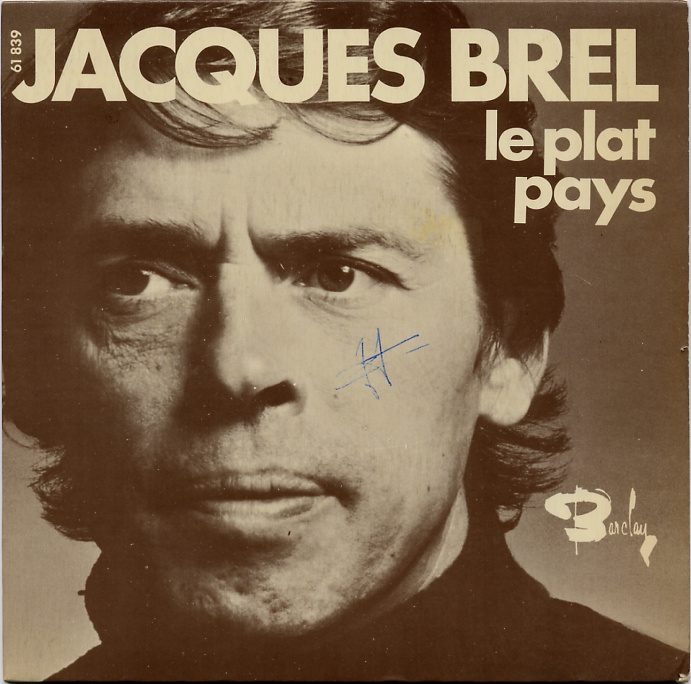 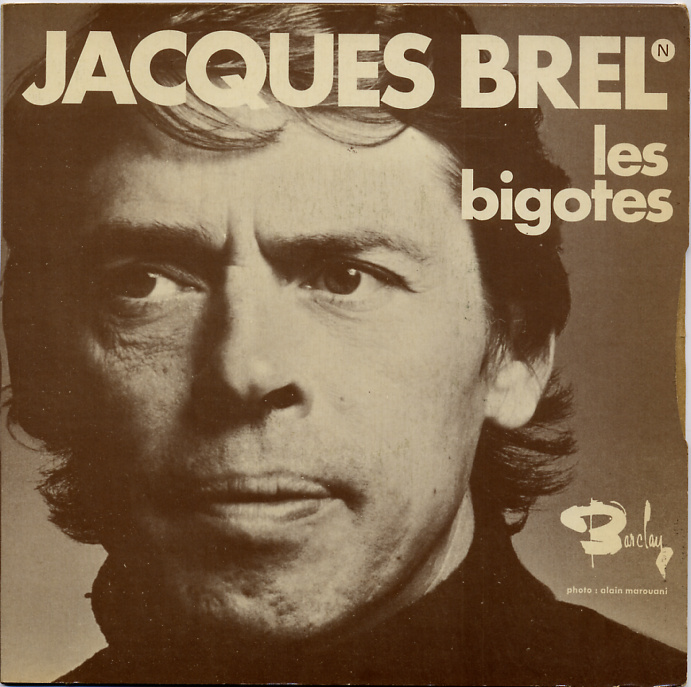 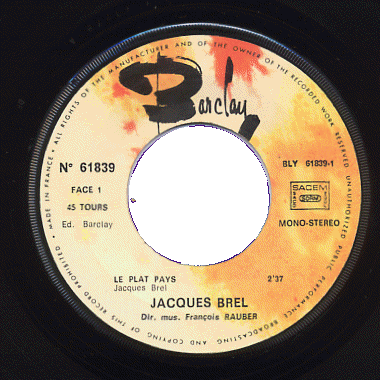 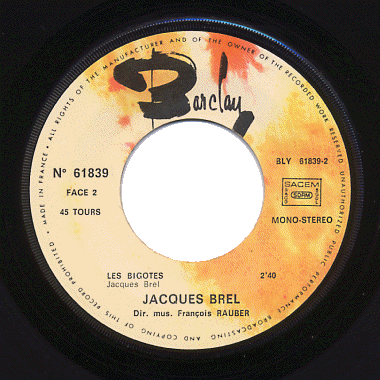
Reprint of the songs issued in 1962-63. The different record labels witness that different releases were printed. The black ones should be later releases, of the second half of the '70s. But frankly, these singles don't deserve to be extensively collected over their different reprints. |
59 Barclay 61 840, 1973 A. Les vieux 4:06 #1
|
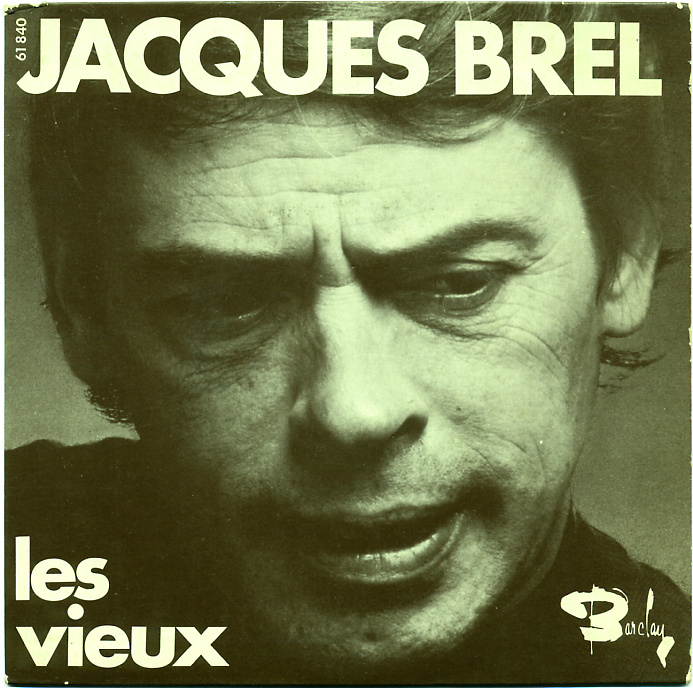 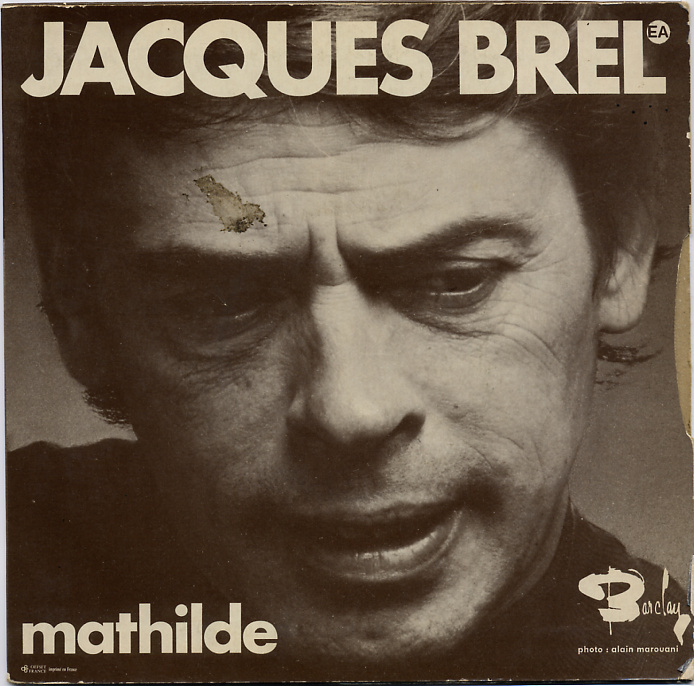 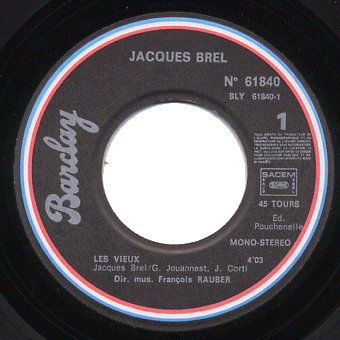 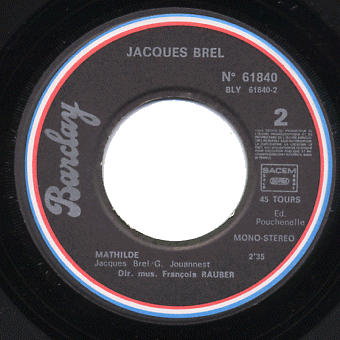
Reprint of the songs issued in 1963-64 |
60 Barclay 61 841, 1973 A. La Fanette 4:04 #2
|
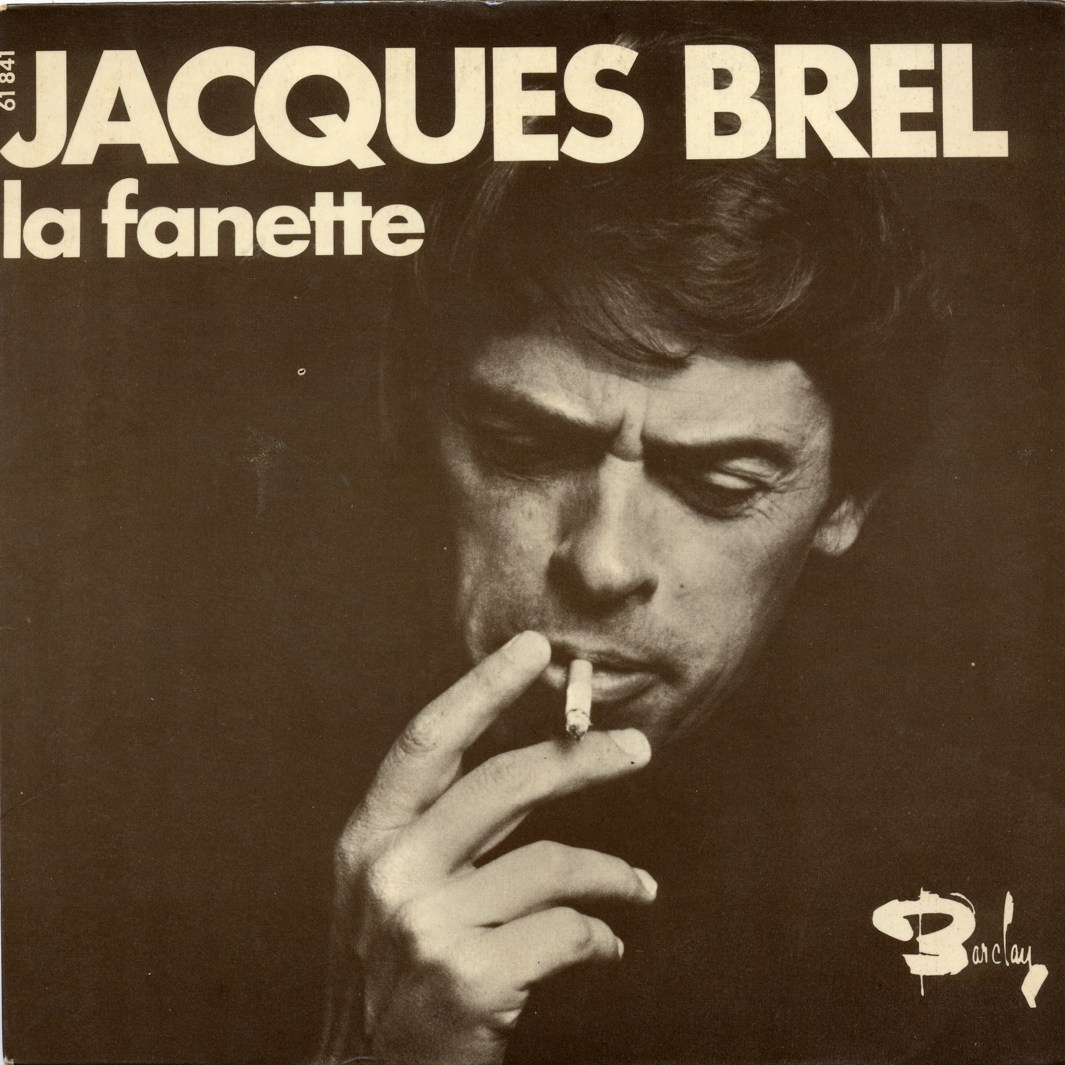 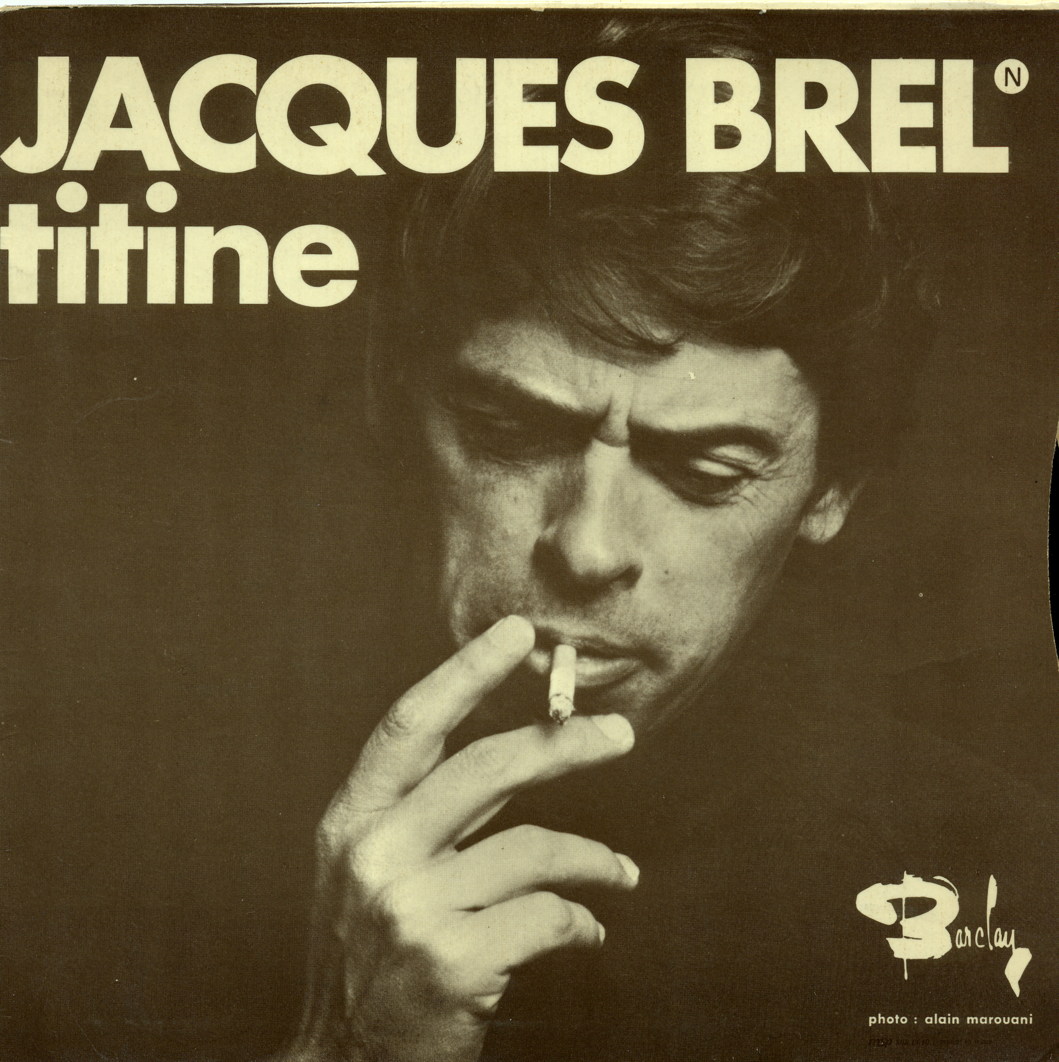 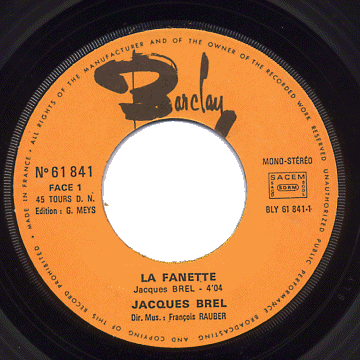 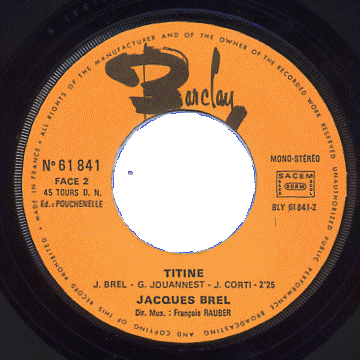
Reprint of the songs issued in 1963-64 |
61 Barclay 61 842, 1973
A. Jef 3:35 #1
|
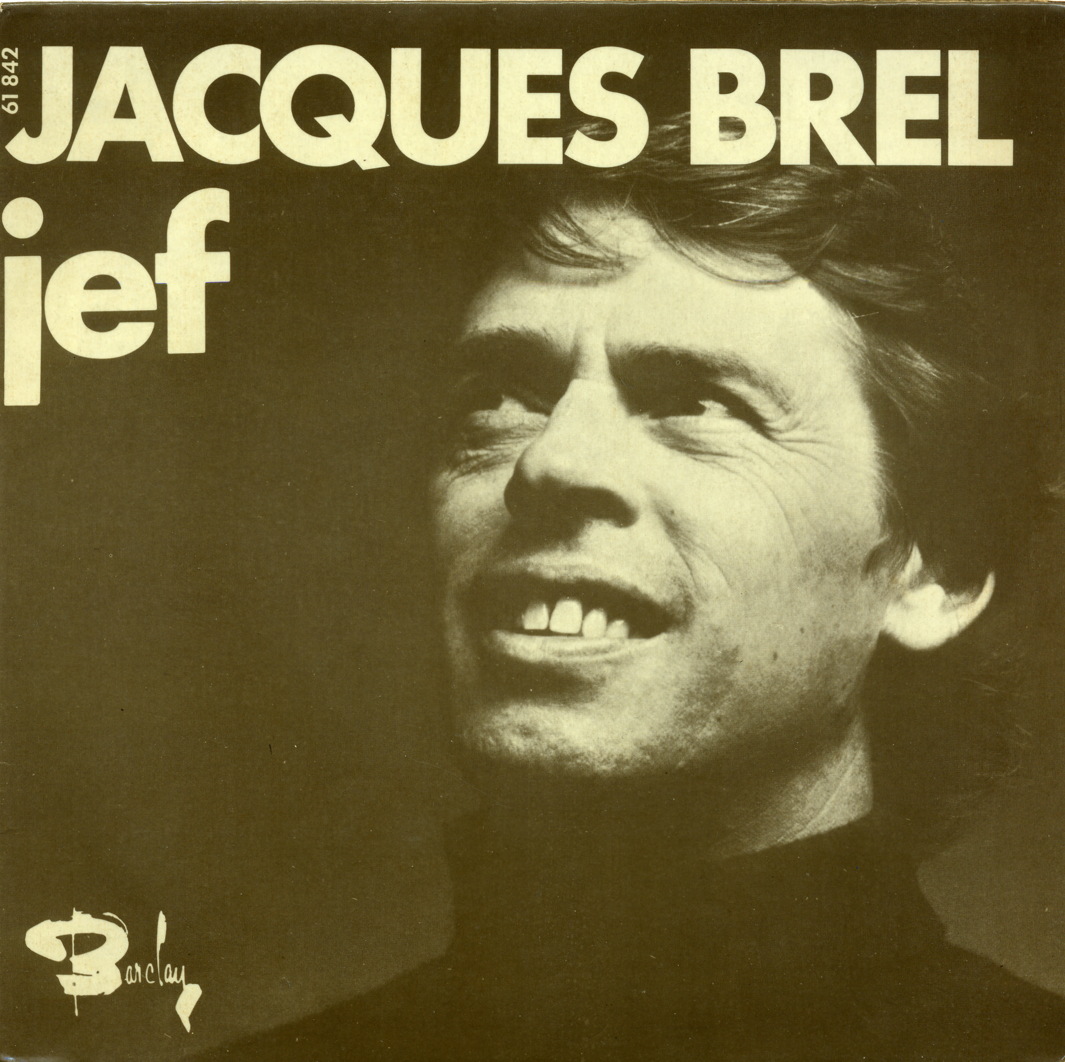 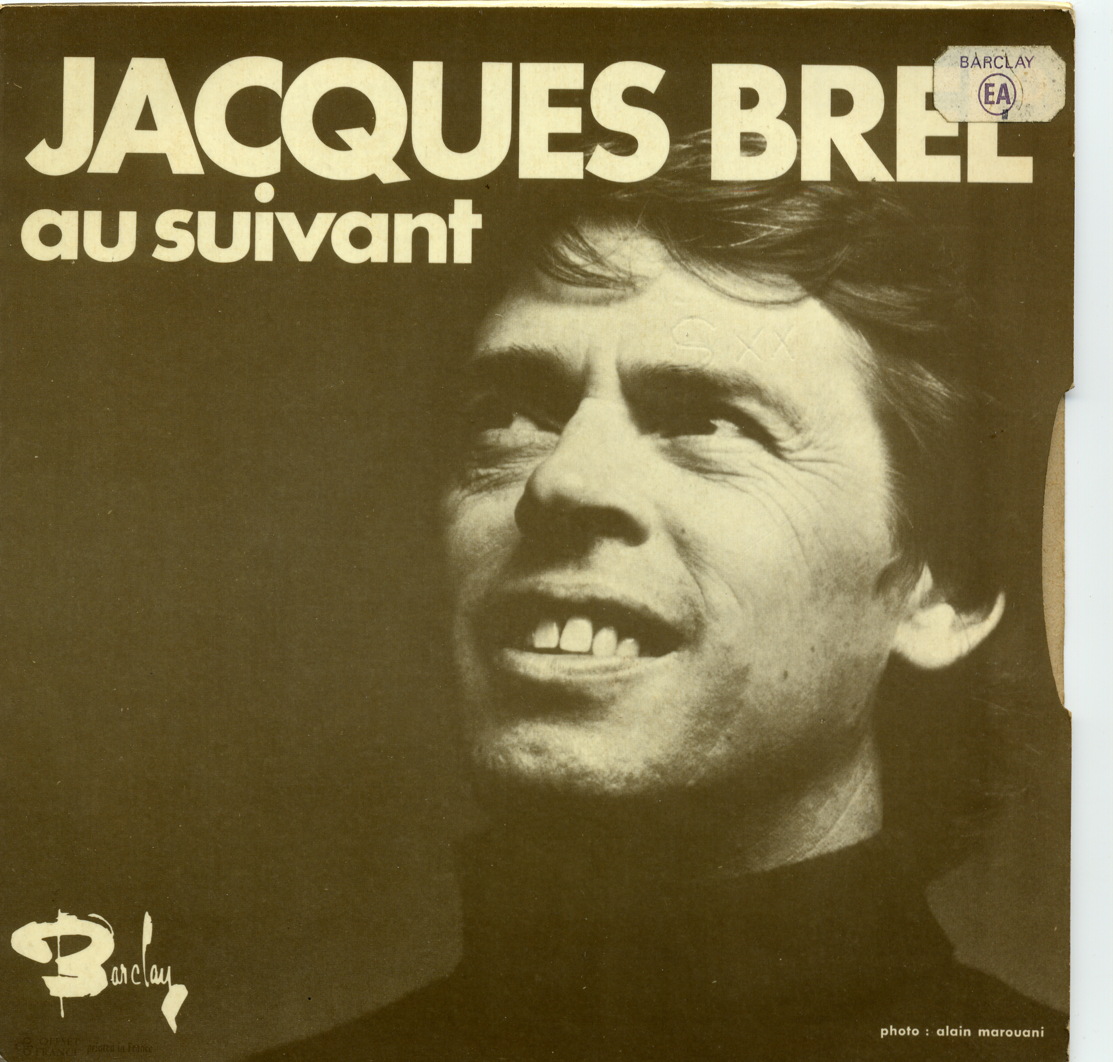 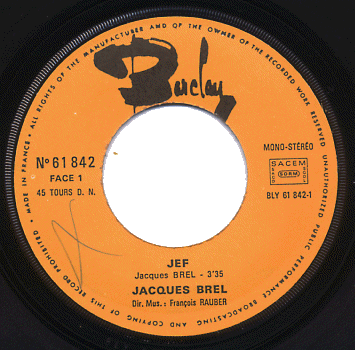 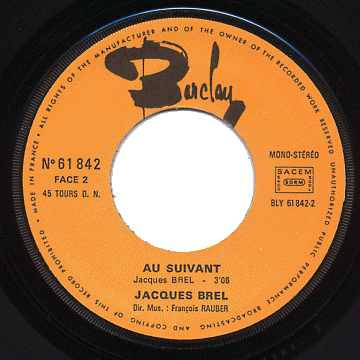
Reprint of the songs issued in 1964 |
62 Barclay 61 843, 1973 A. Les bonbons 3:29 #1
|
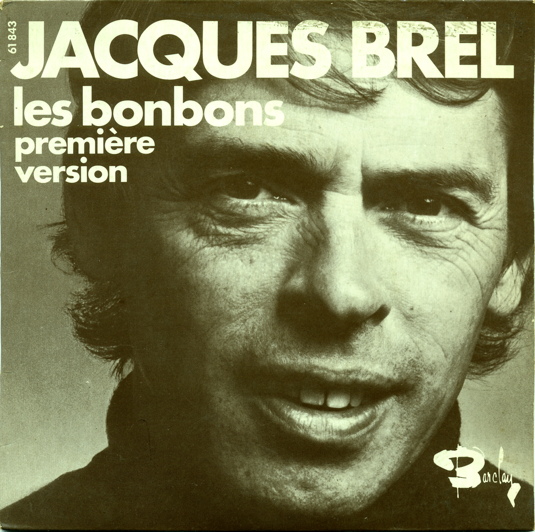 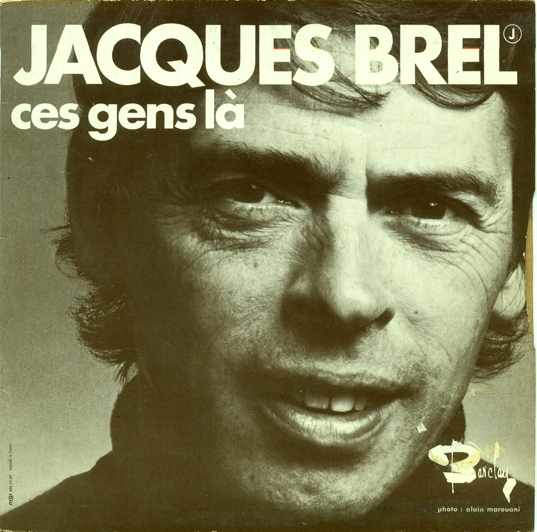 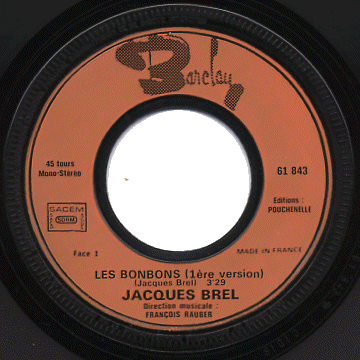 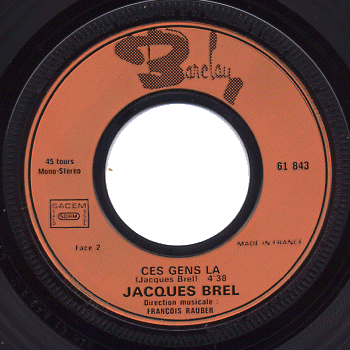
Reprint of the songs issued in 1964-65 |
63 Barclay 61 844, 1973 A. Amsterdam 3:06 #1
|
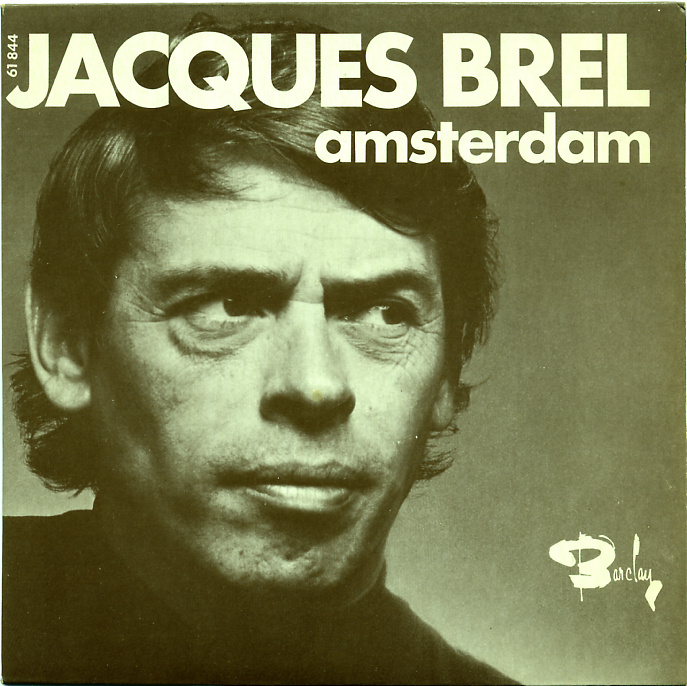 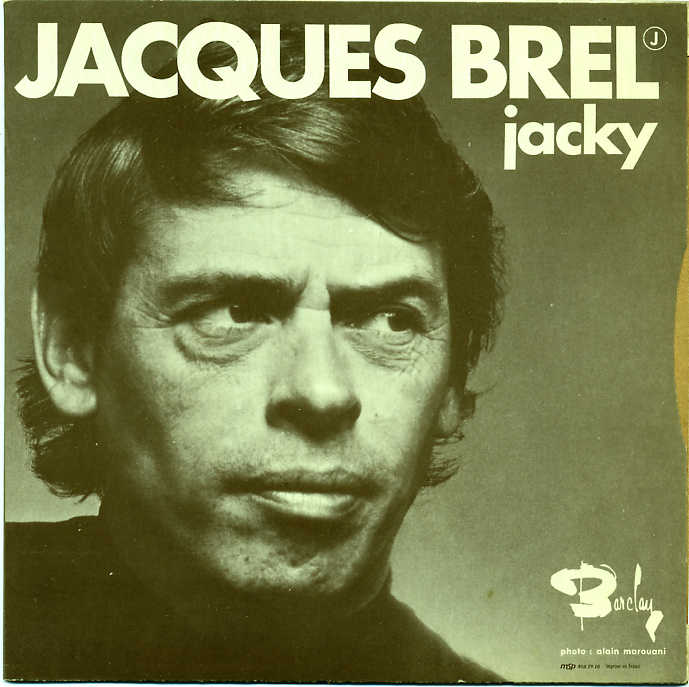 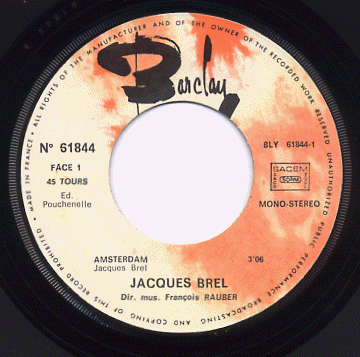 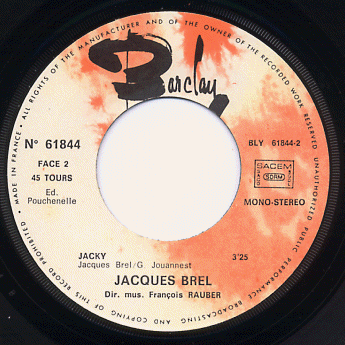
Reprint of the songs issued in 1964-65 |
64 Barclay 61 845, 1973 A. La chanson des vieux amants 4:31
|
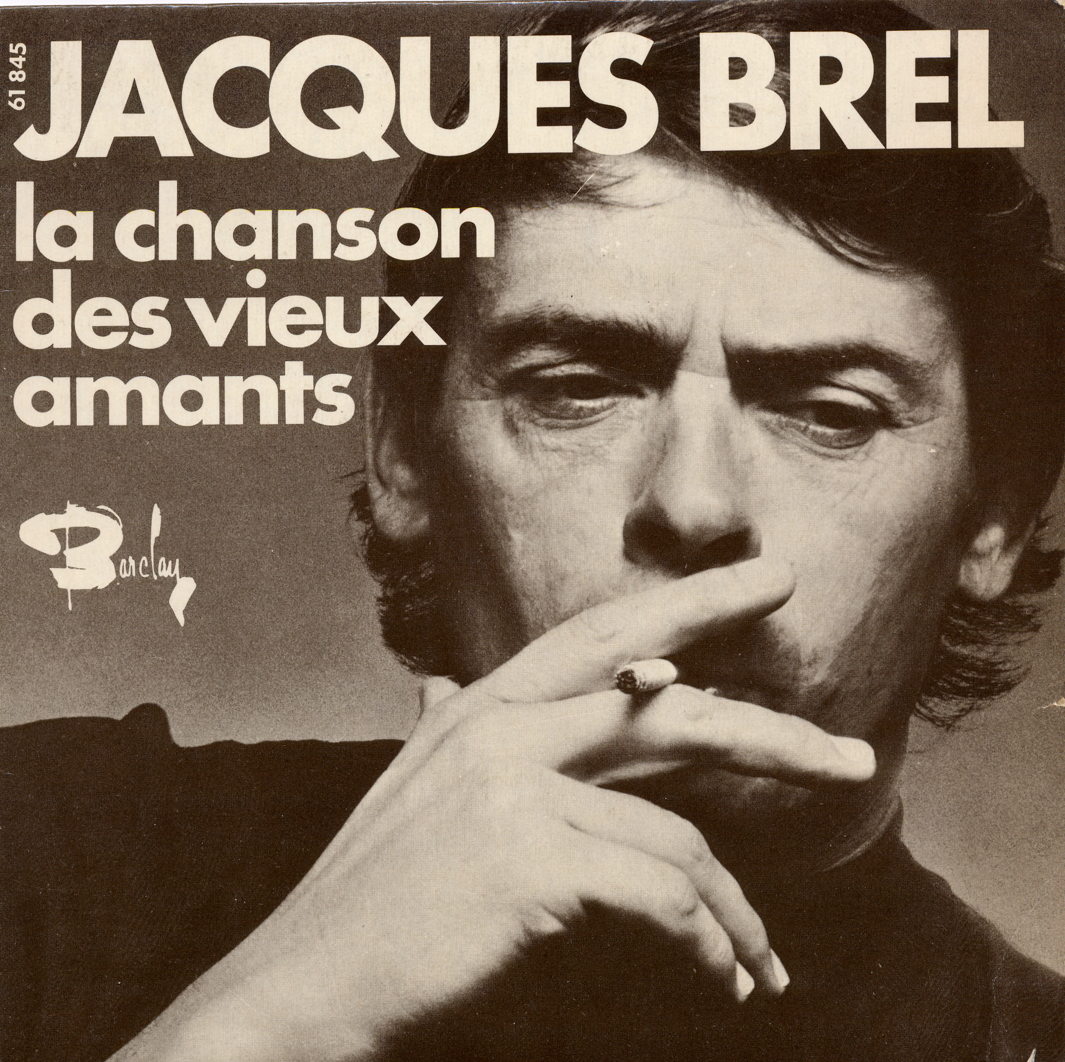 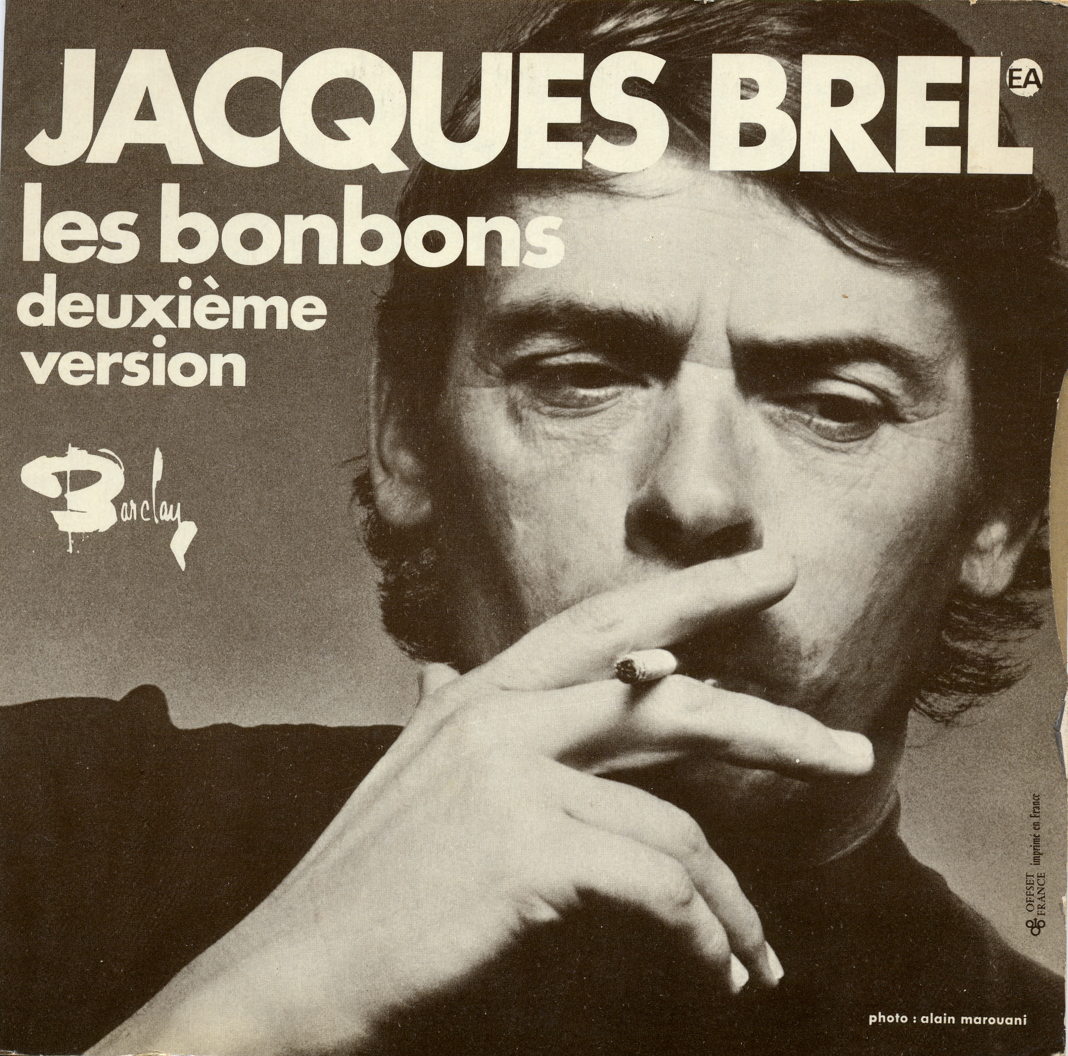 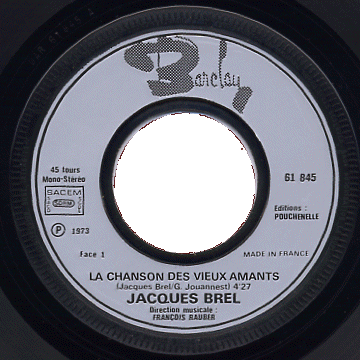 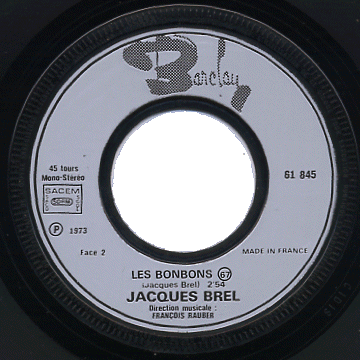
Reprint of songs issued in 1967 Reissue of 1977 |
65 Barclay 61 846, 1973 A. Vesoul 3:03
|
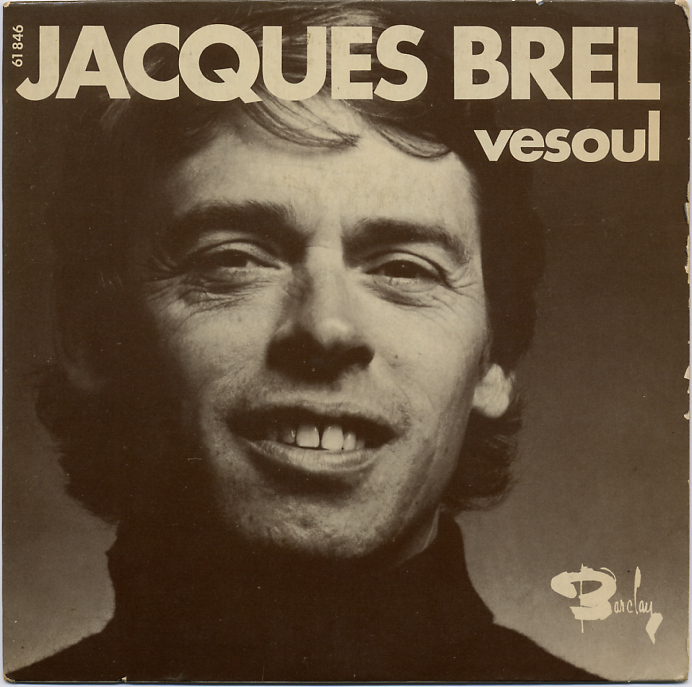 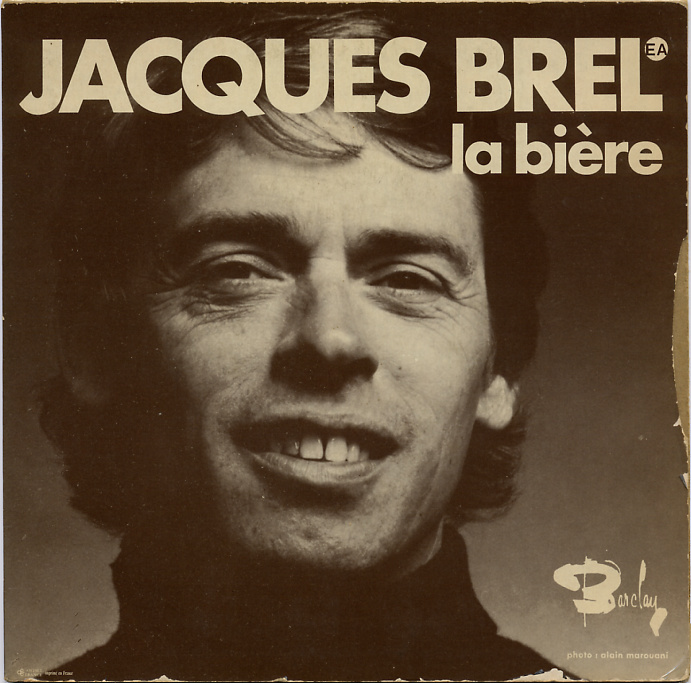 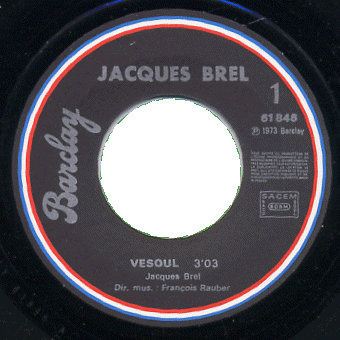 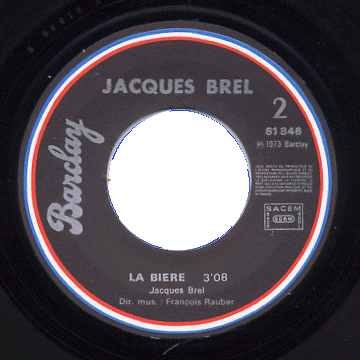
Reprint of songs issued in 1968 |
66 Barclay 62 023, 1974
A. Le moribond 3:23 #5 |
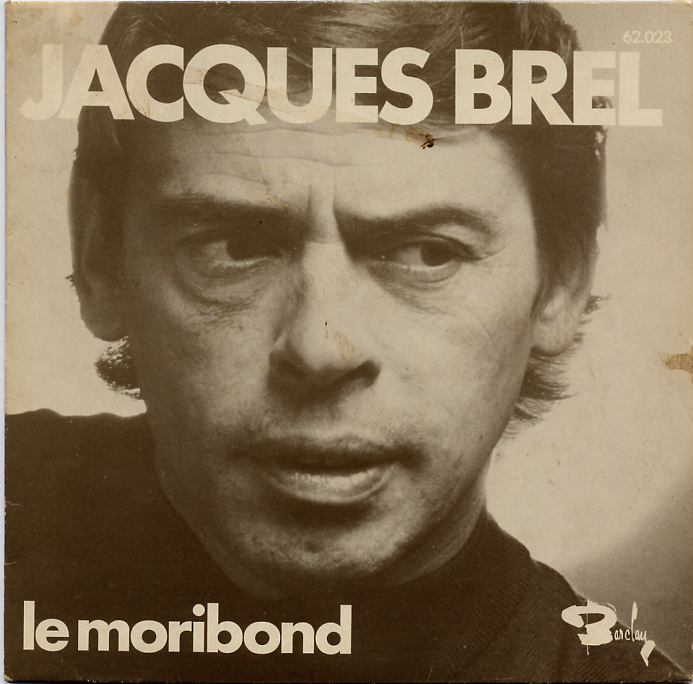 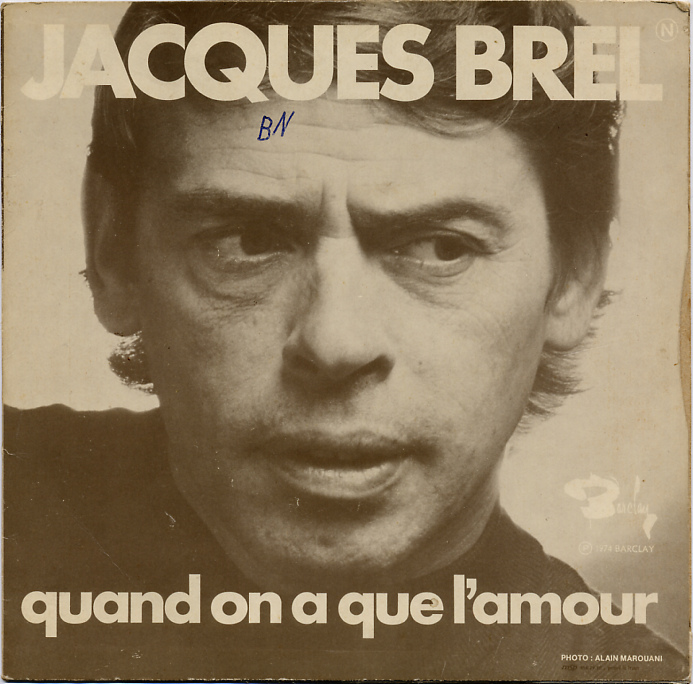 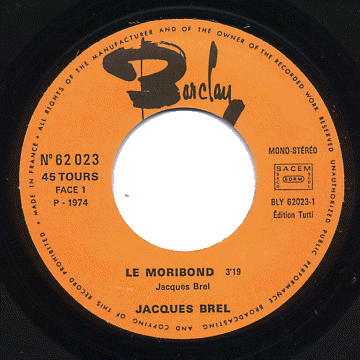 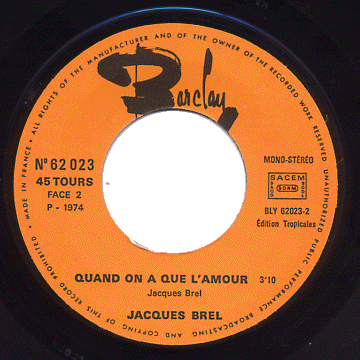
One year later, a single with two of the new versions of 1972 was finally released, which presented a badly mistaken title Quand on a que l'amour, both on cover and on the disc label. Sure enough, the lyrics hadn't changed... |
67 Philips 6009 481, 1974
A. Le moribond 3:07 #1 |
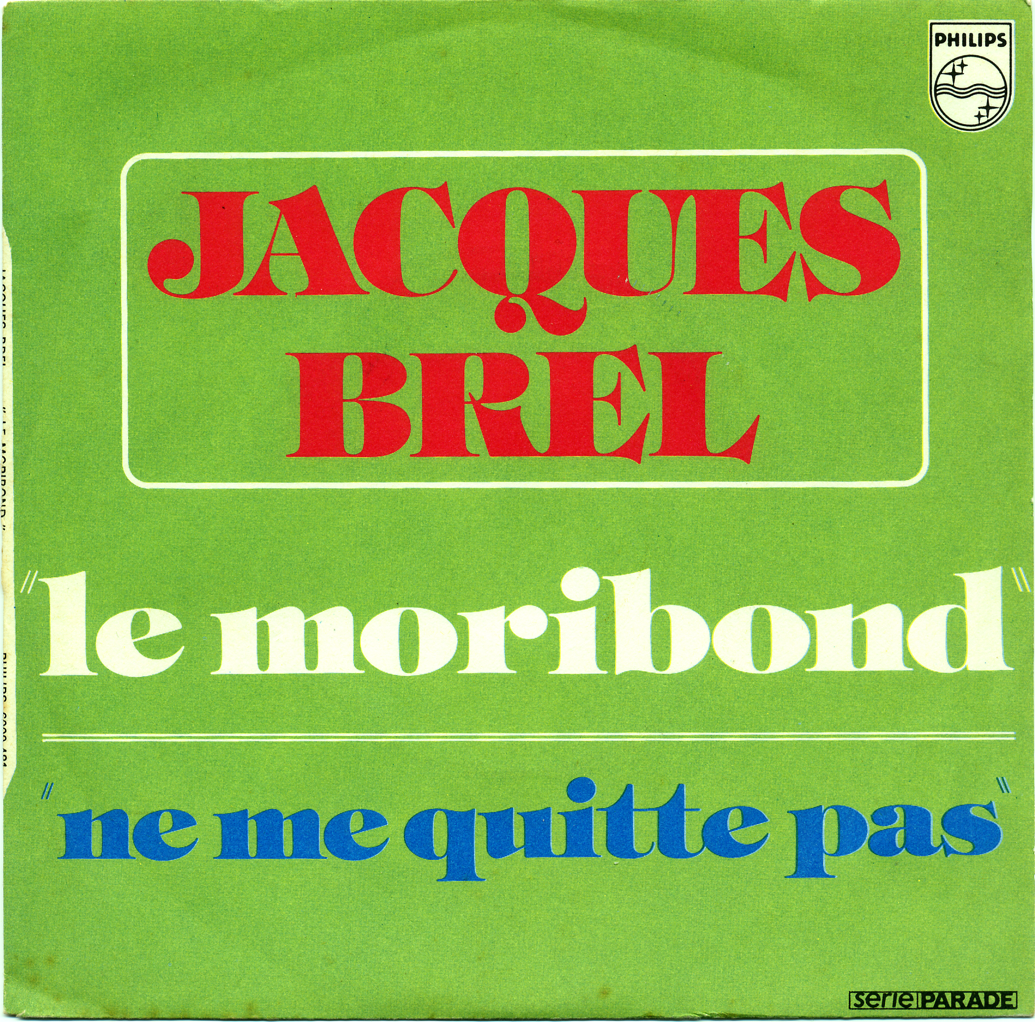 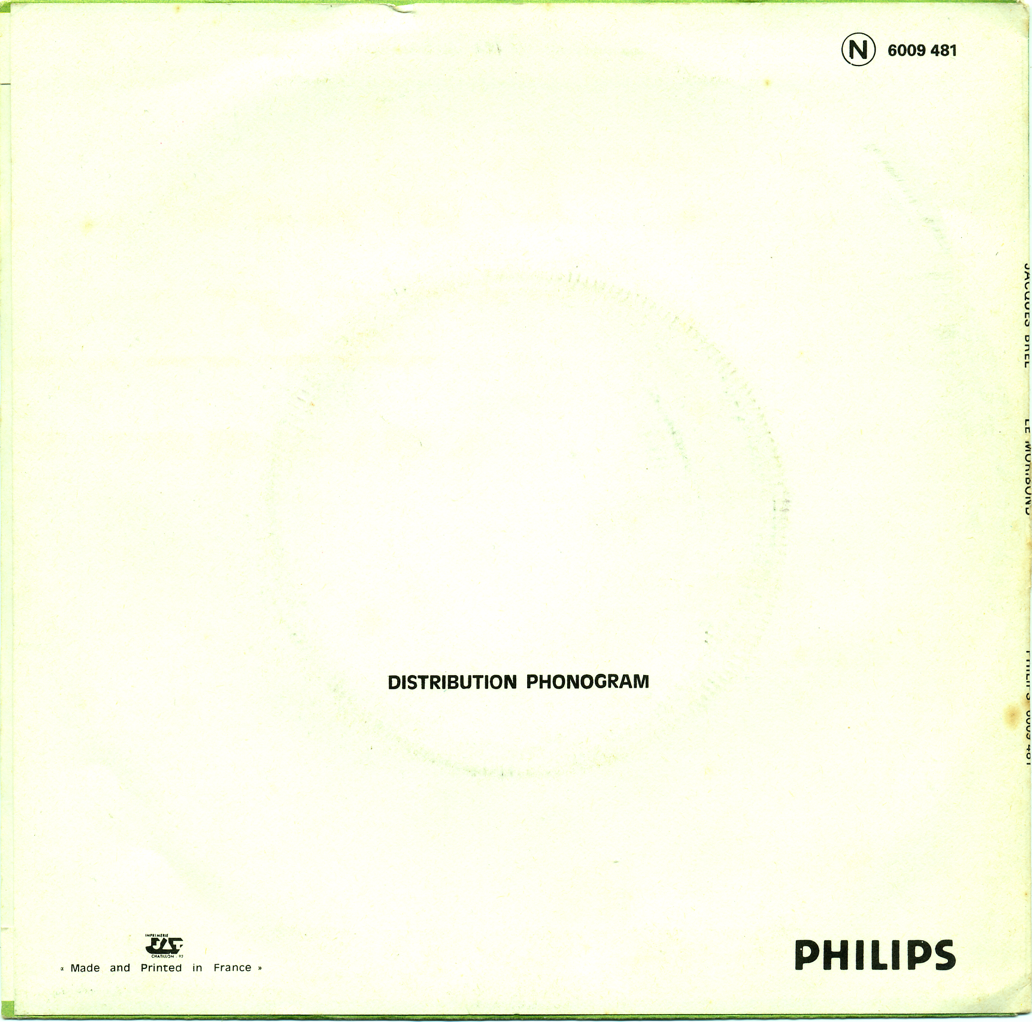 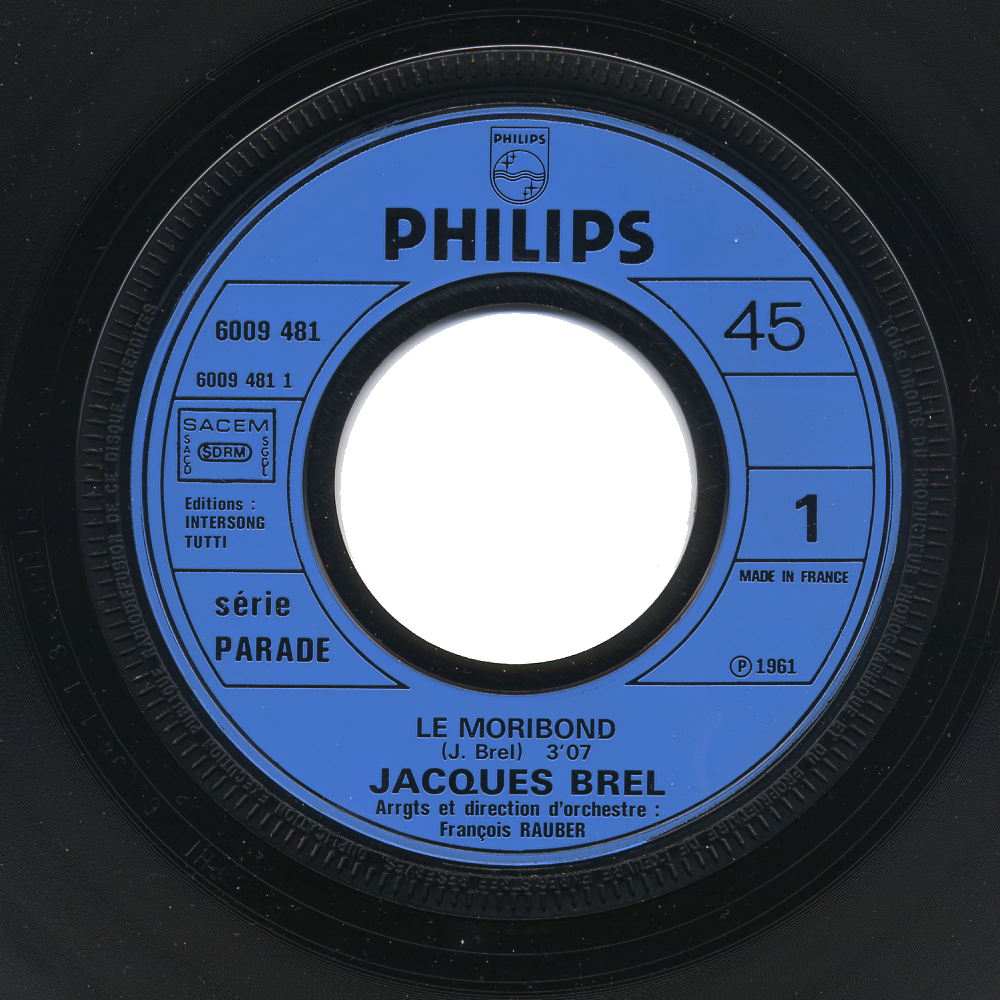 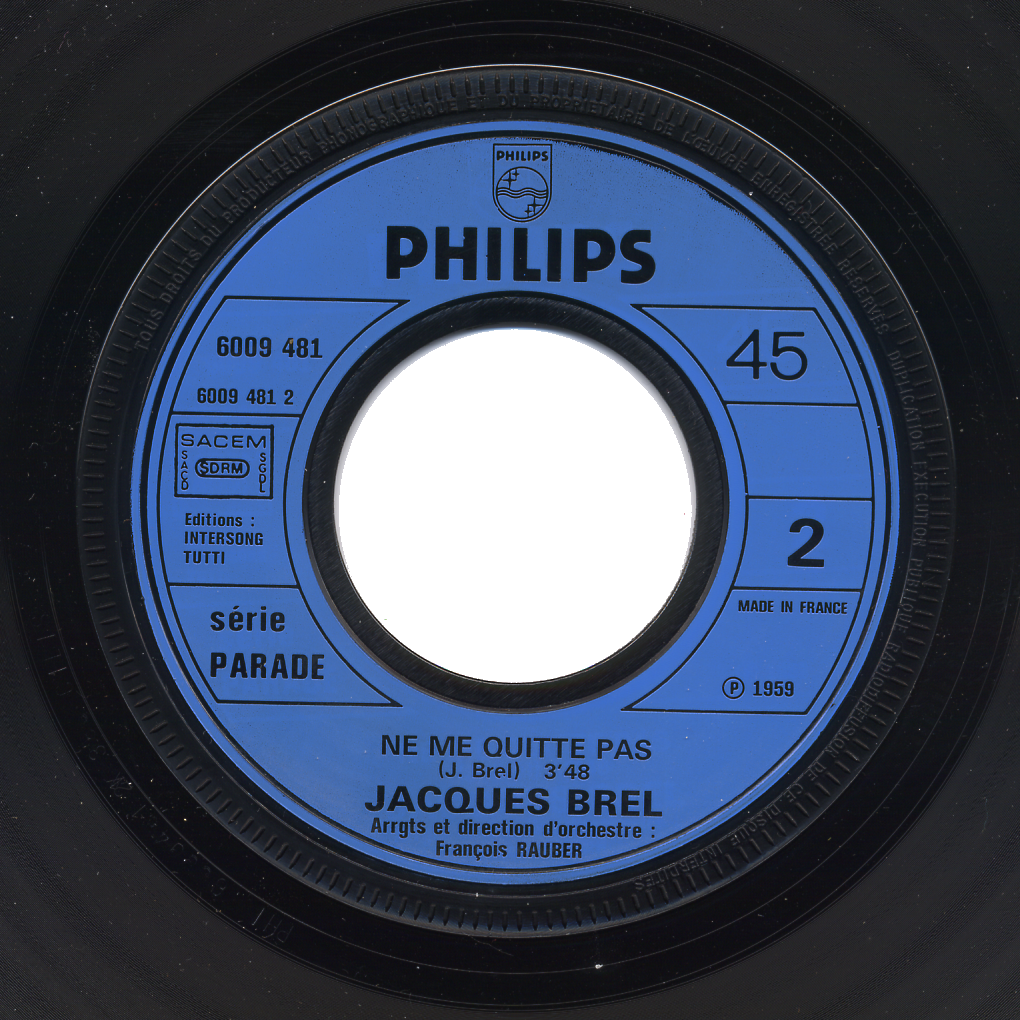
Certainly not incidentally, in the year of the planetary success of Terry Jacks' Seasons in the sun, Philips resurfaced with this single including the original versions of Le moribond on face A and Ne me quitte pas on face B. |
68 Barclay 62.341, 1977
A. Vieillir 3:42 |
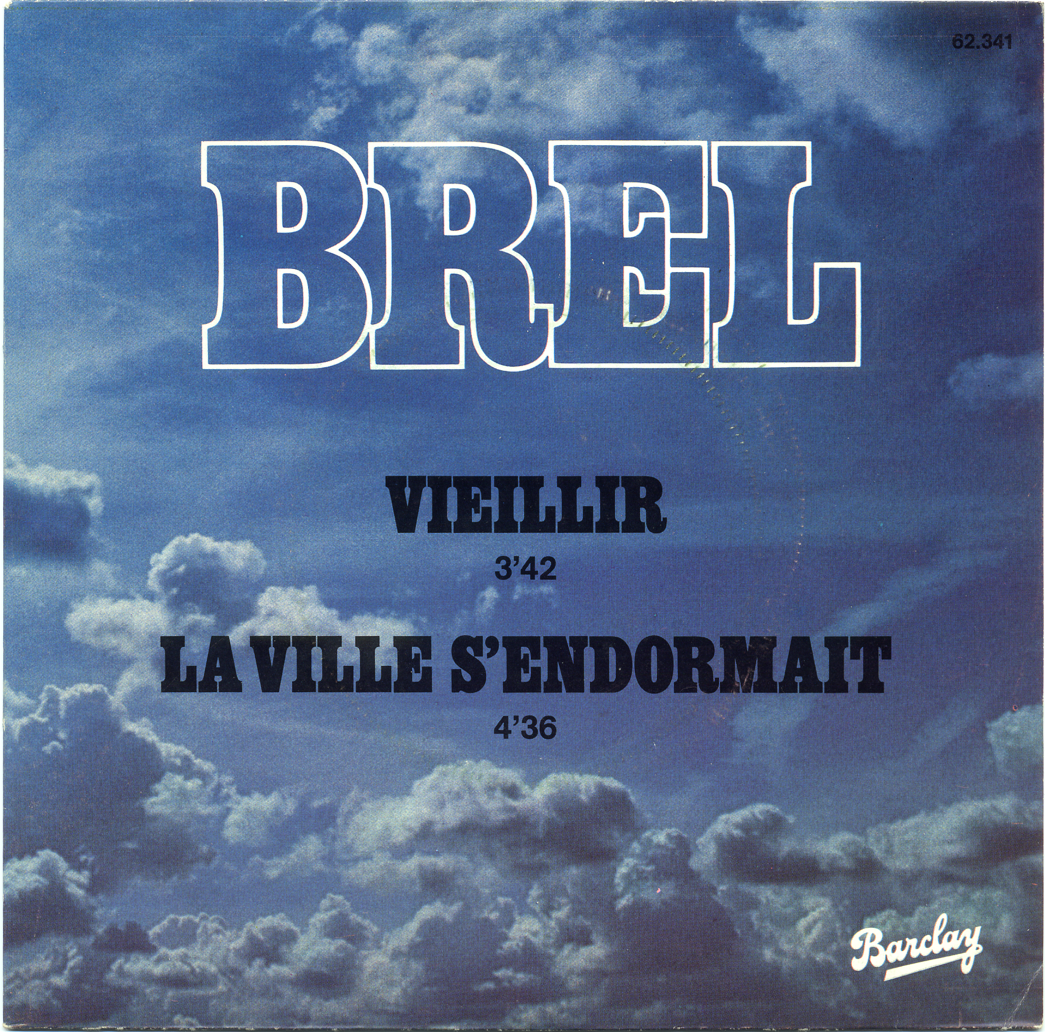 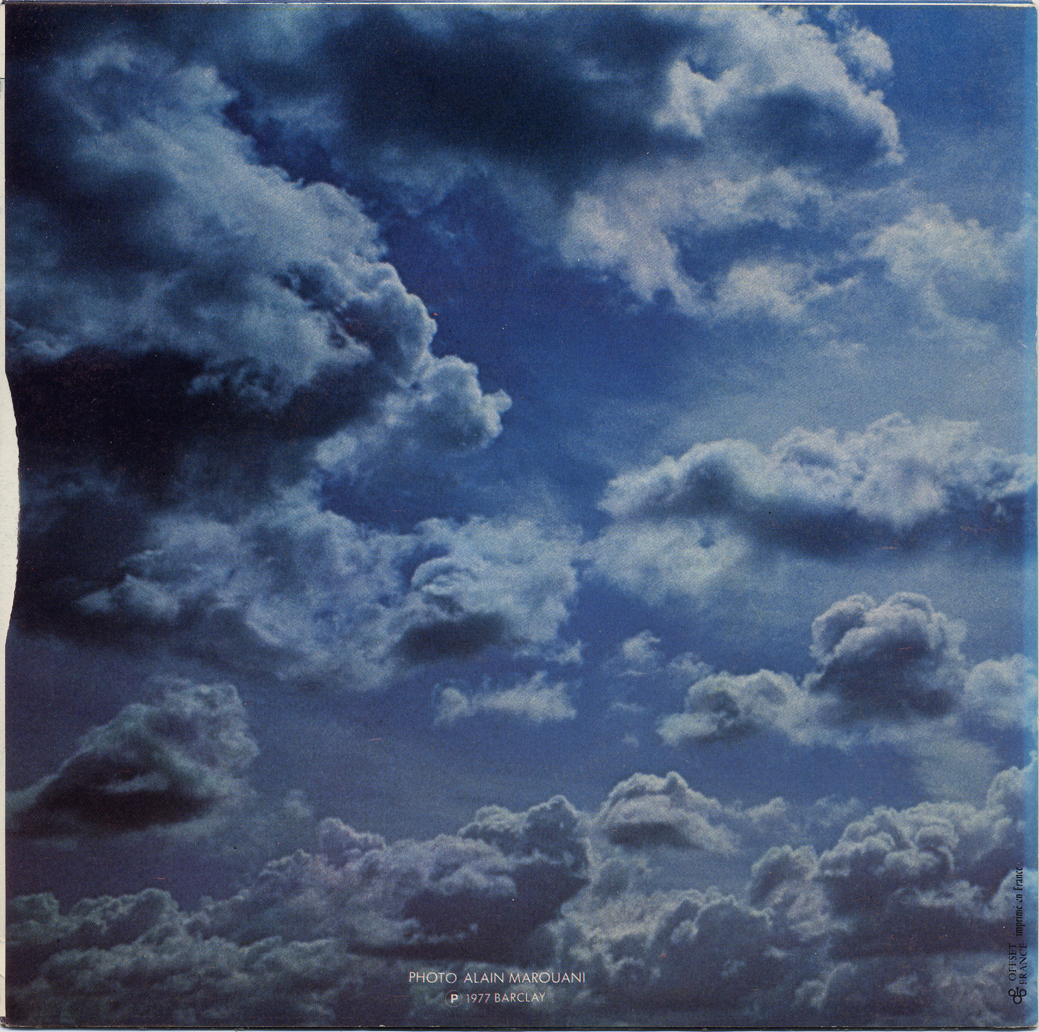 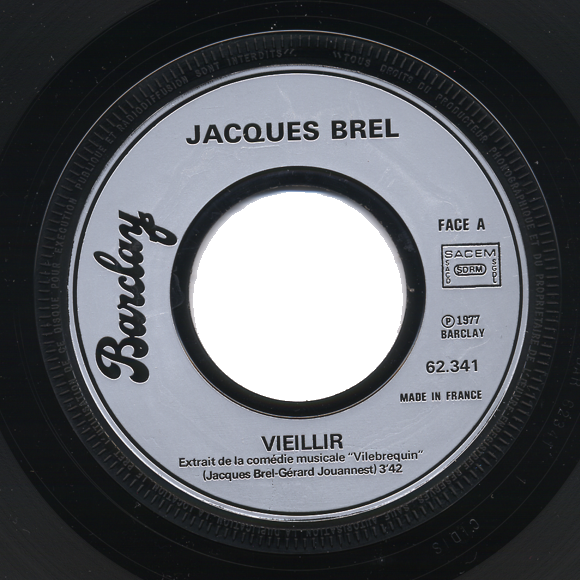 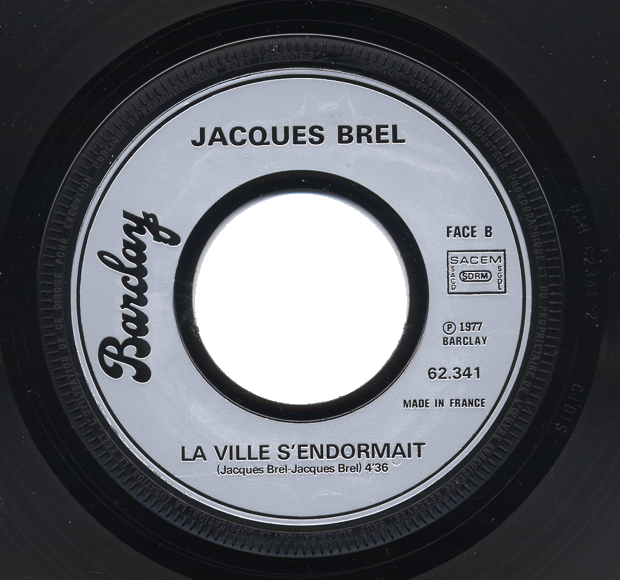
The first four singles taken from the last Brel album are incredibly hard to find nowadays. I have to think that, because of the huge sales of the LP, these singles had a very limited release. |
69 Barclay 62.342, 1977
A. Jojo 3:11 |
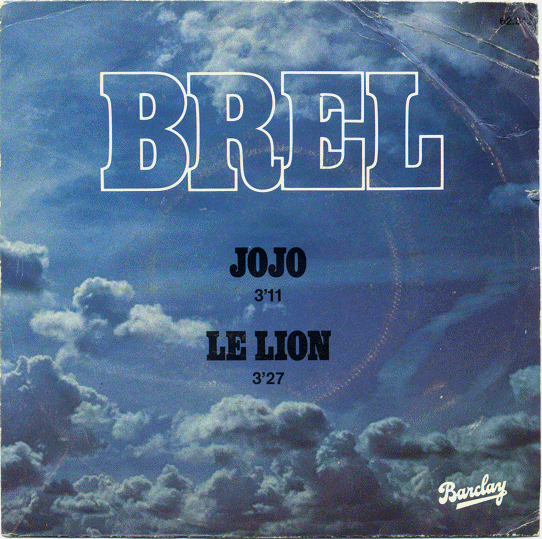 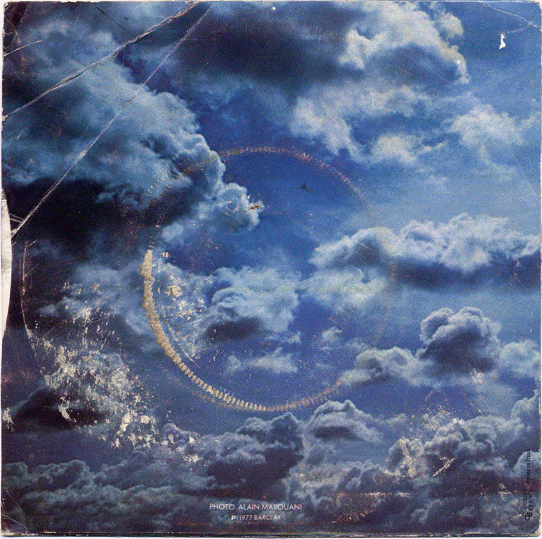 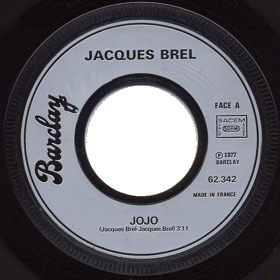 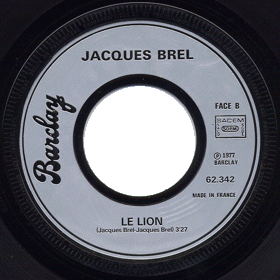
This is the only one that I have found by now, with a very crumpled sleeve. I could accept that the disc was treated badly because of Le lion, which ranks amongst the very worst songs of Jacques Brel... however it is paired with one of his more touching song, the ode to his beloved, lifelong friend Jojo (Georges Pasquier). |
70 Barclay 62.343, 1977
A. Jaurès 3:37 |
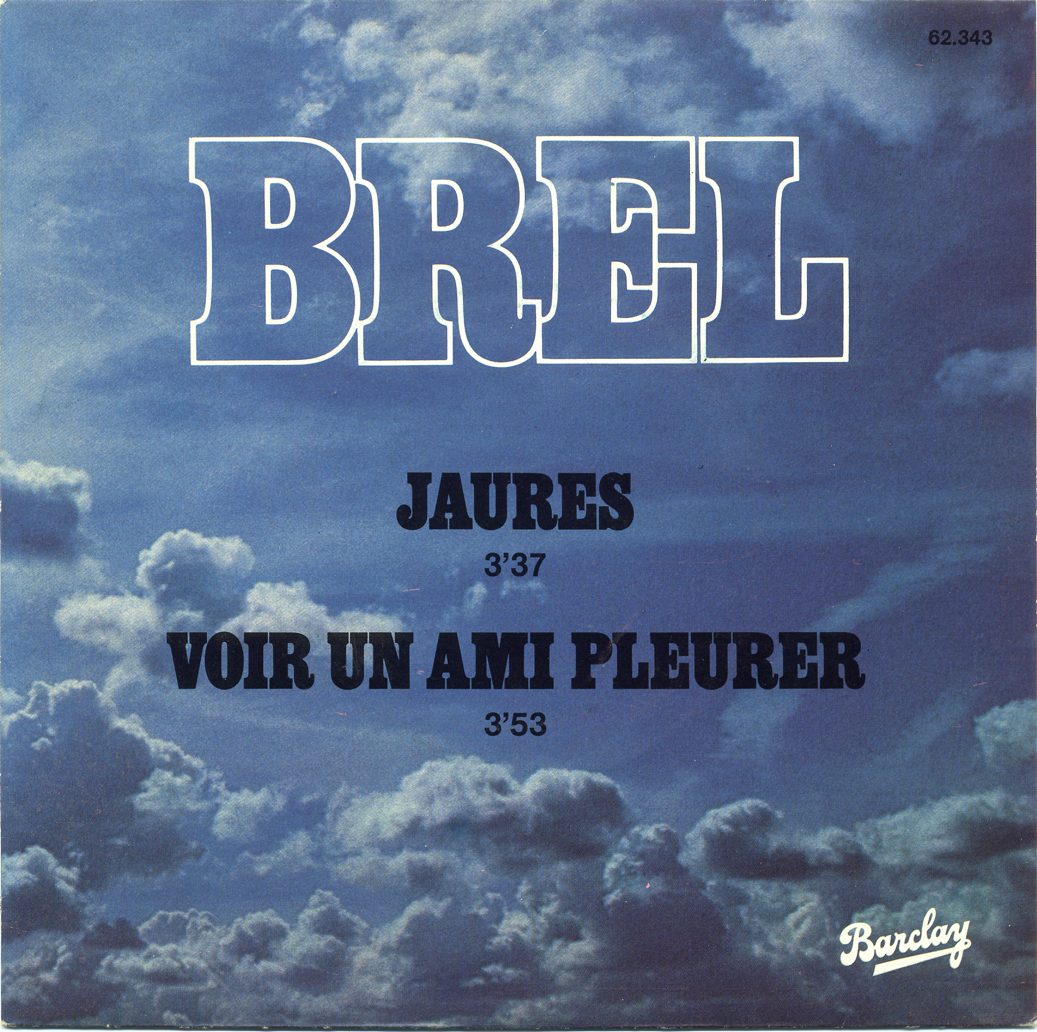 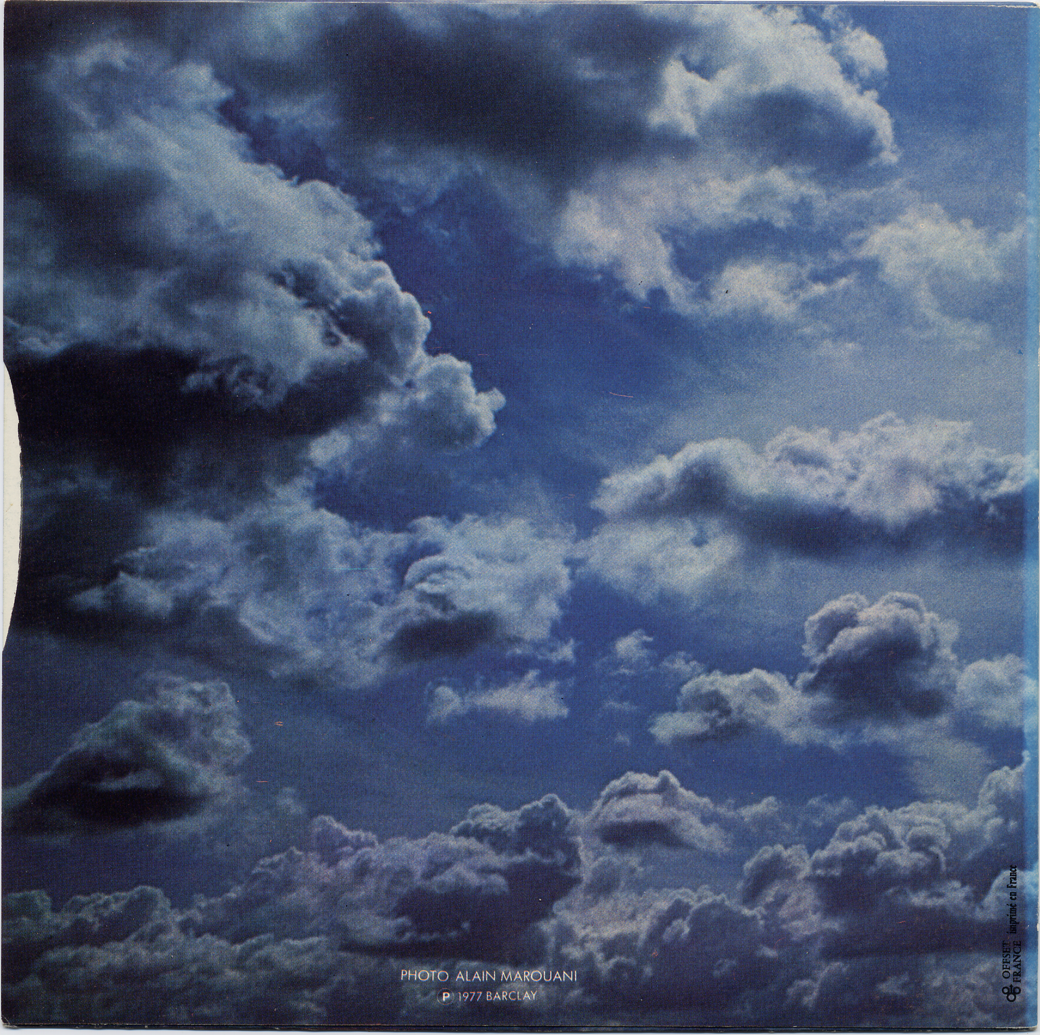 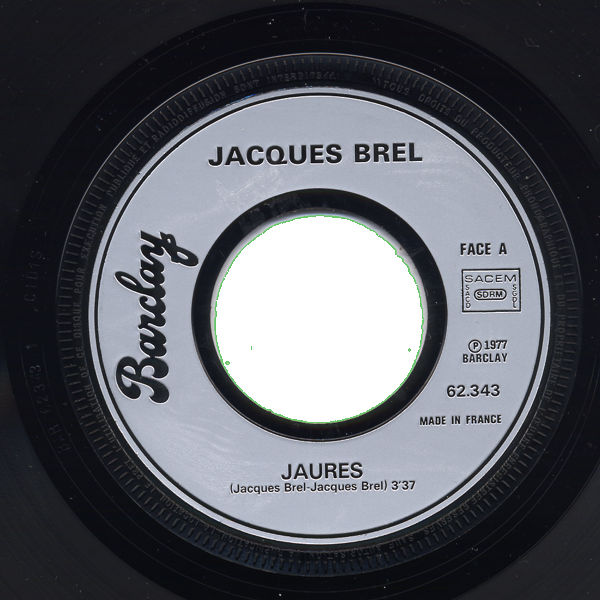 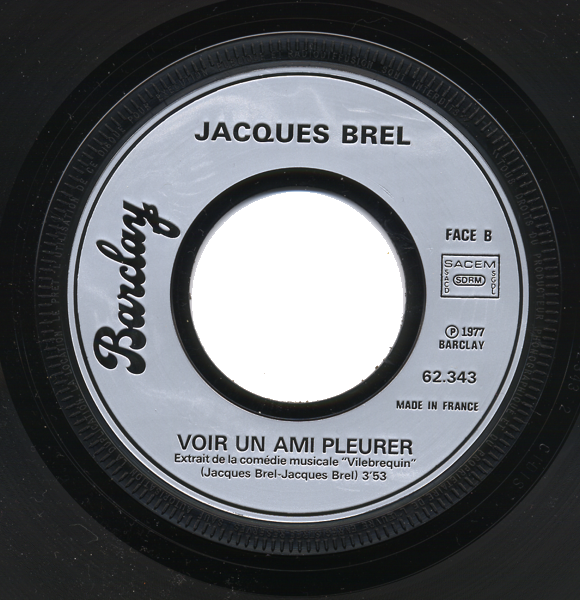 |
71 Barclay 62.344, 1977
A. Knokke-le-Zoute tango 5:10 |
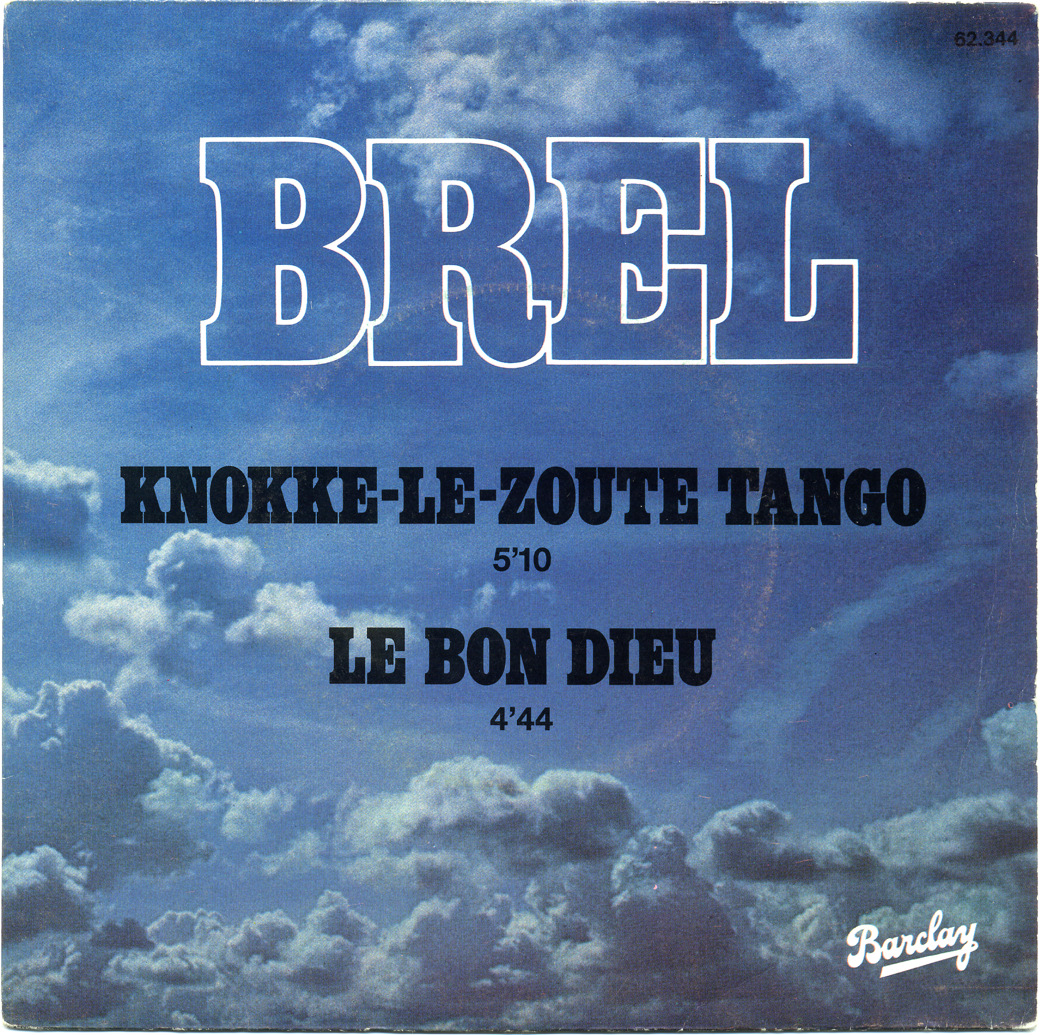 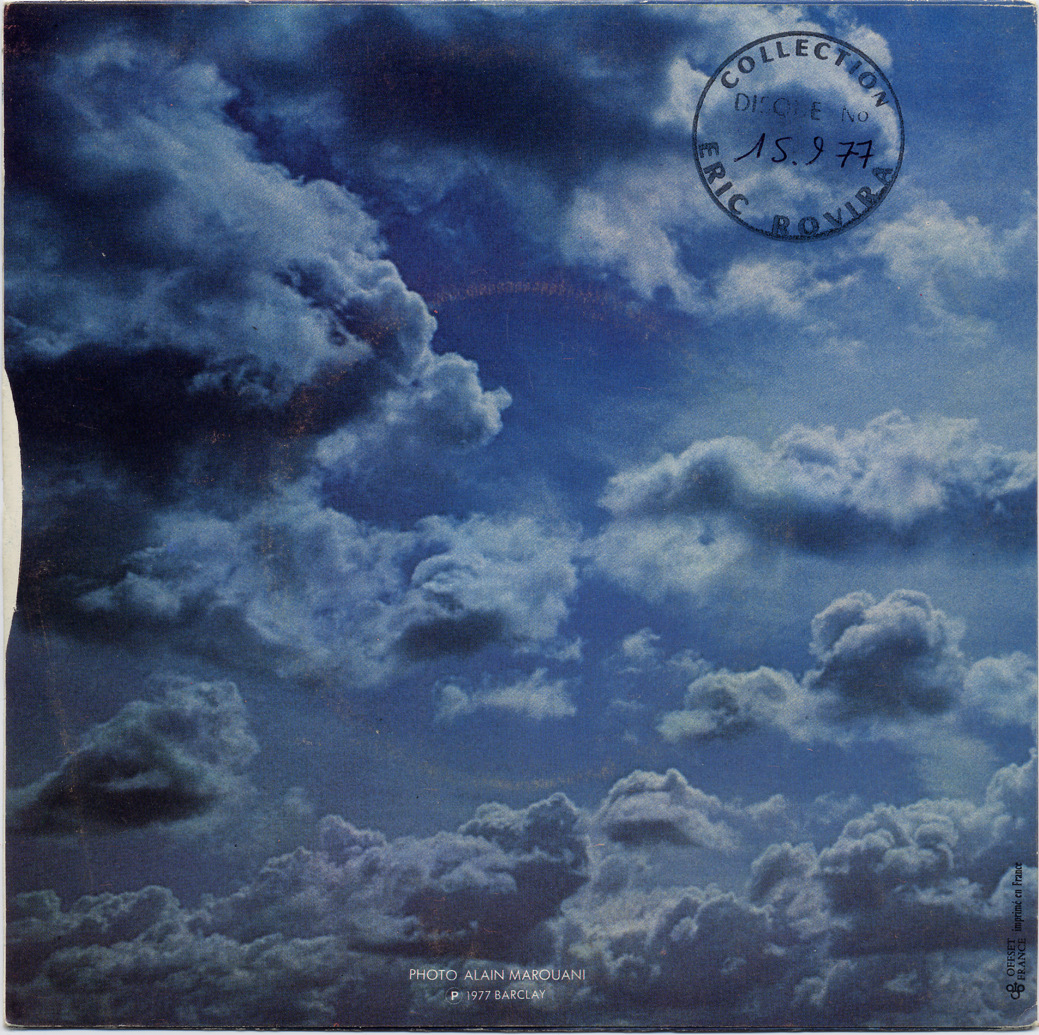 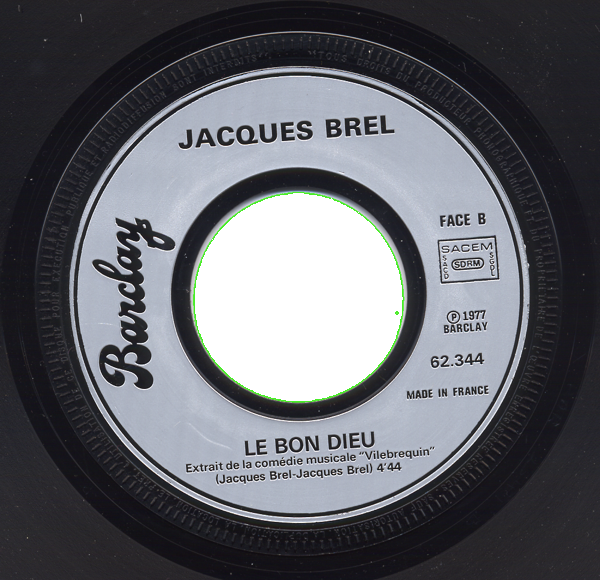 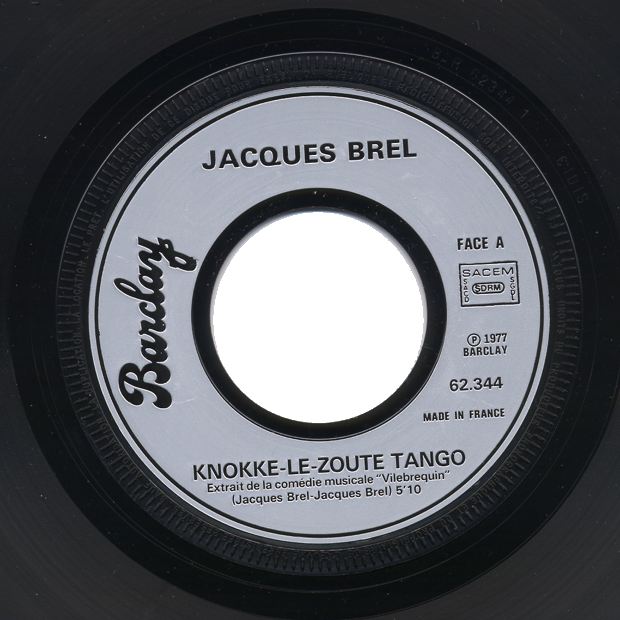 |
72 Barclay 62.345, 1977
A. Les remparts de Varsovie 4:06 |
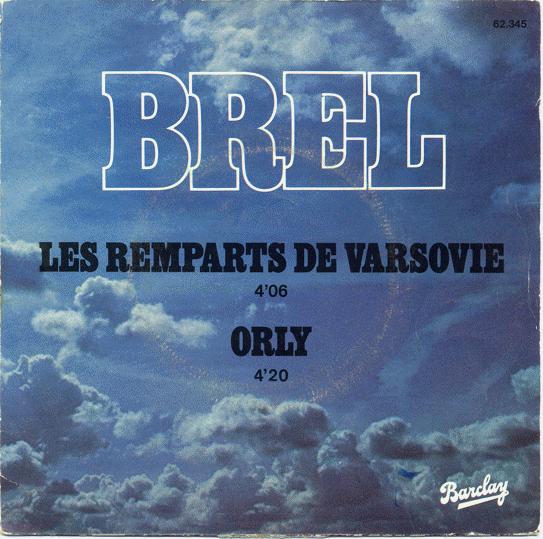 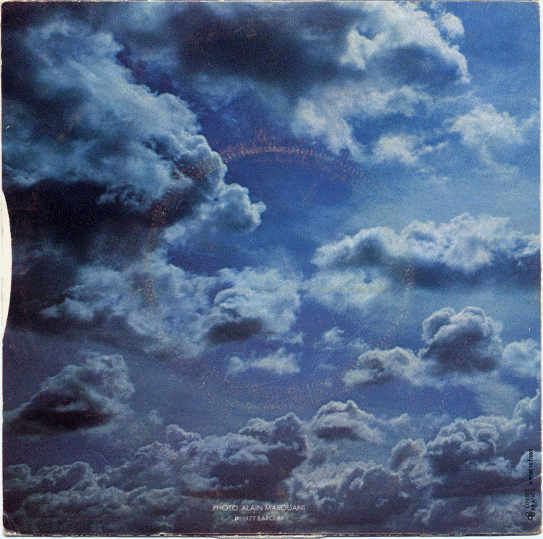 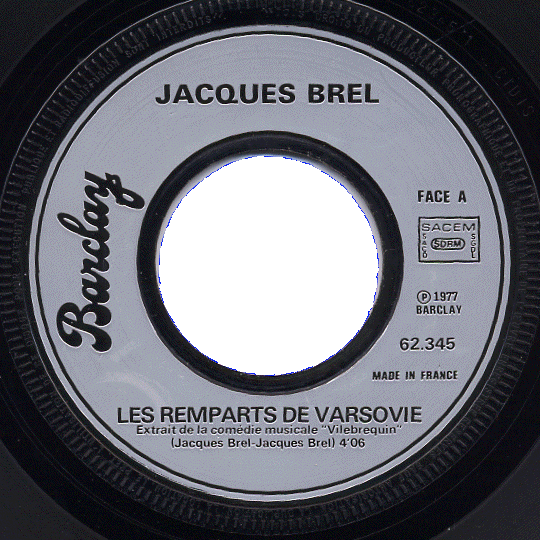 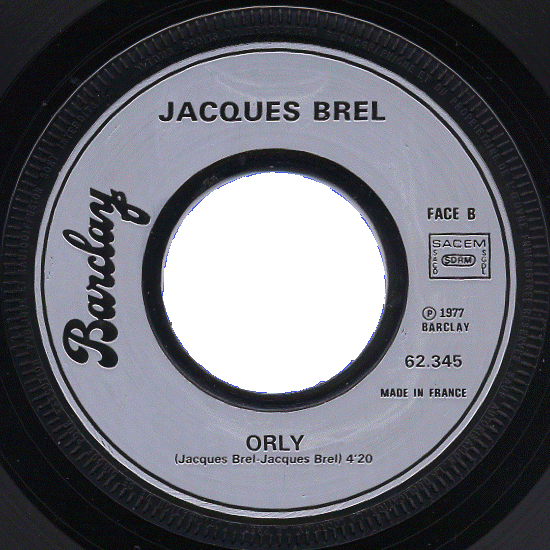 |
73 Barclay 62.346, 1977
A. Les Marquises 3:53 |
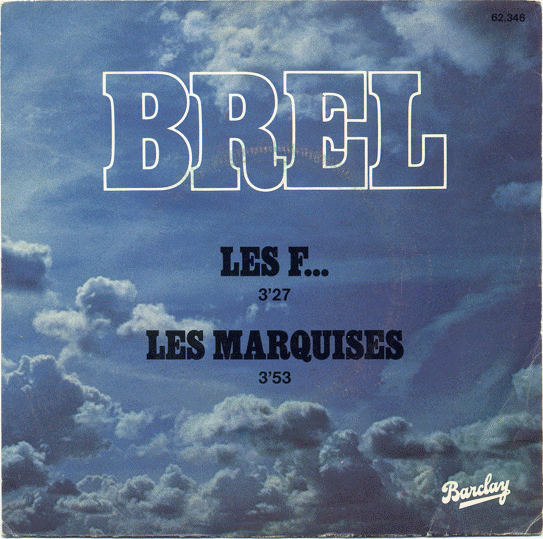 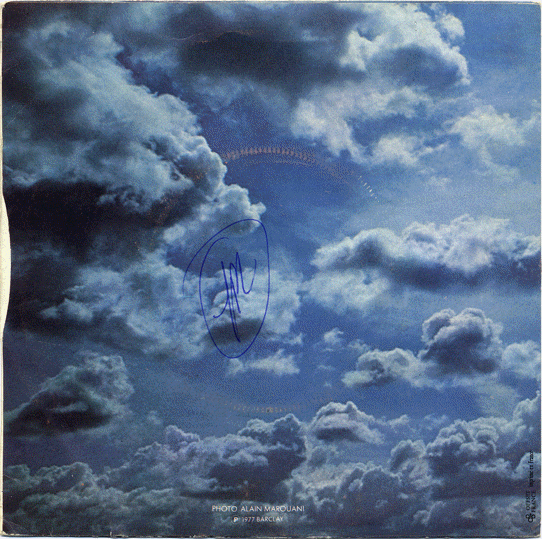 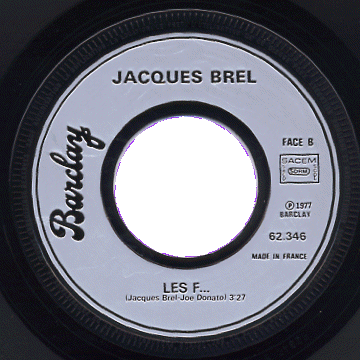 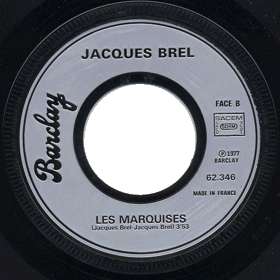 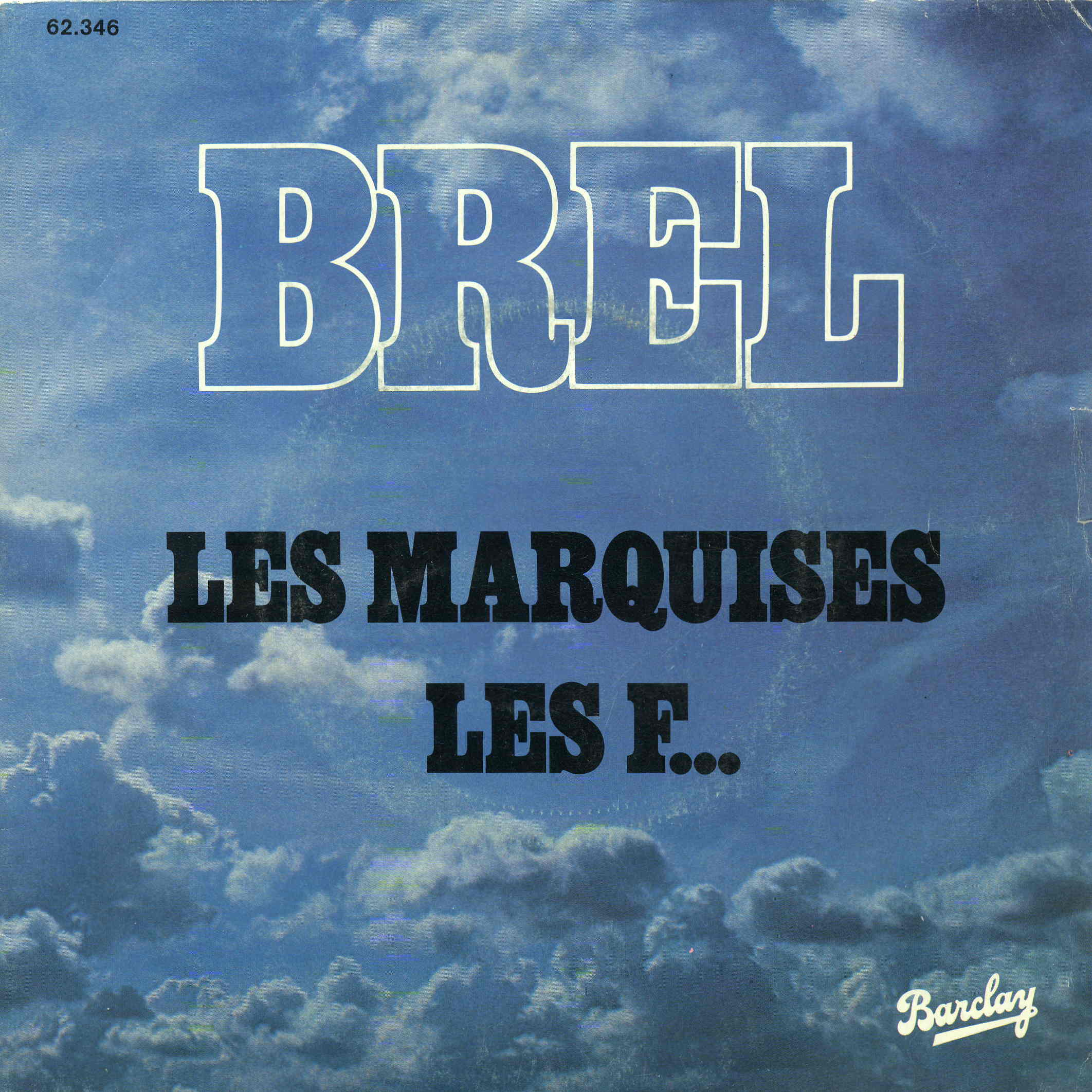 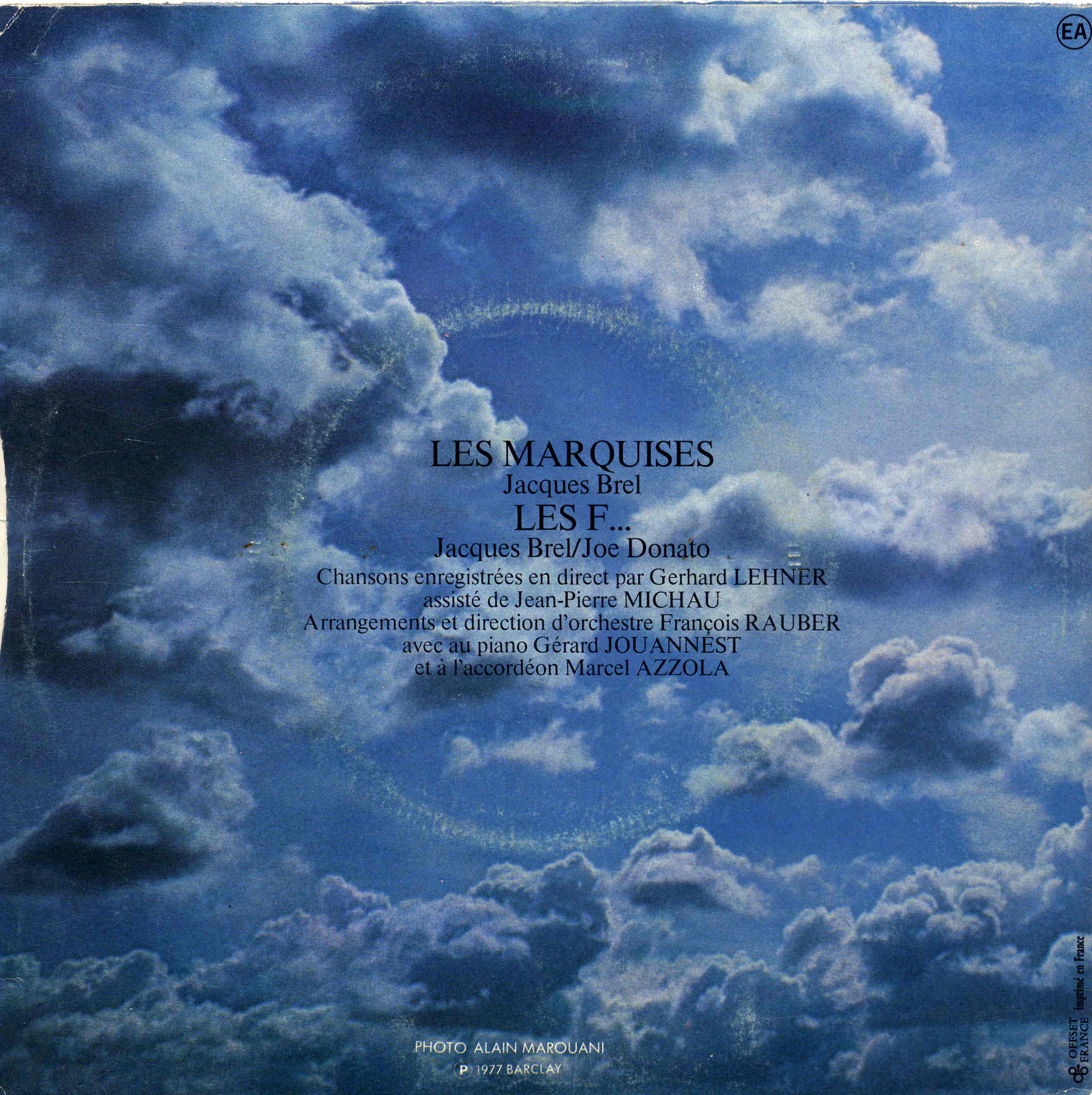 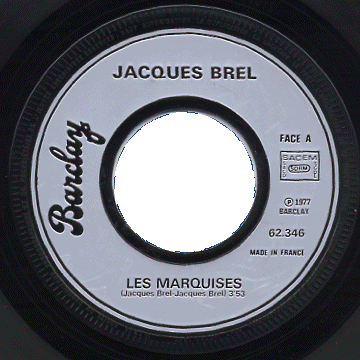 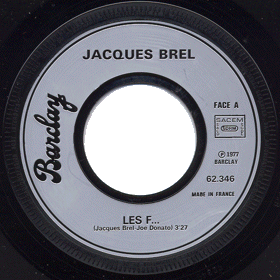
This is representative of the confusion that must have reigned in Barclay in those frantic days of 1977. The last Brel album sold more than one million copies in France alone, and singles had to be reprinted too. You can see that the first sleeve had in the front side only the song titles, while the second one had titles in smaller font along with their durations and, above all, the order of titles was inverted. On the back side, the first sleeve reported titles and credits, the second one only the cloudy blue sky that Brel hated. Now let me make another inference: singles 62.346, 62.369 and 62.505 are the easiest to find and they have both sleeves or only the one without durations. The other singles taken from the Brel album have titles and durations, are extremely hard to find and have smaller catalogue numbers. Could it be that at the beginning Barclay printed only a limited number of copies of the first six singles and then, starting from 62.346, they delivered a larger print of the last three singles? That could also explain why some songs (Orly, Jojo, Le lion) are repeated in different singles. |
74 Barclay 62.369, 1977
A. Les remparts de Varsovie 4:06 |
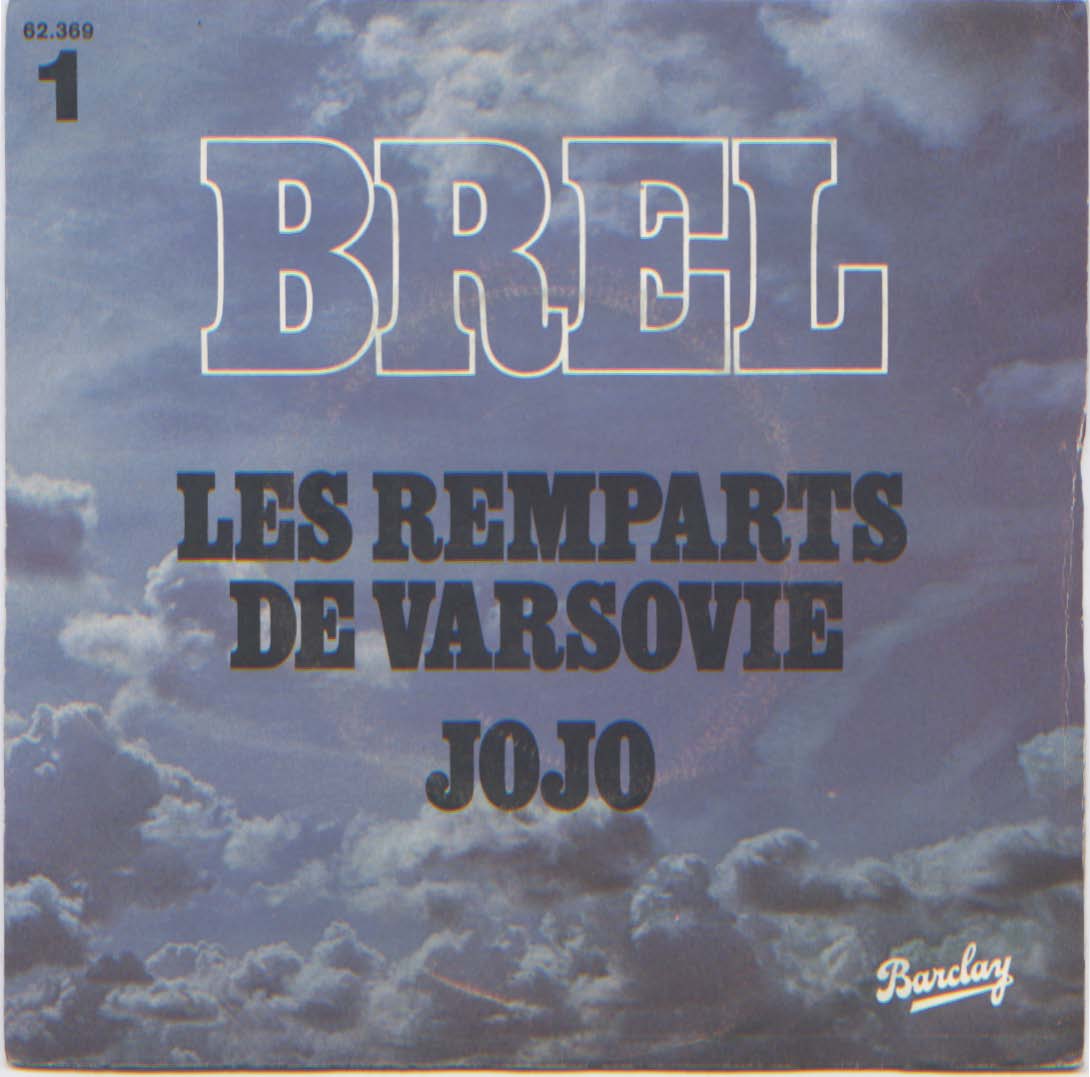 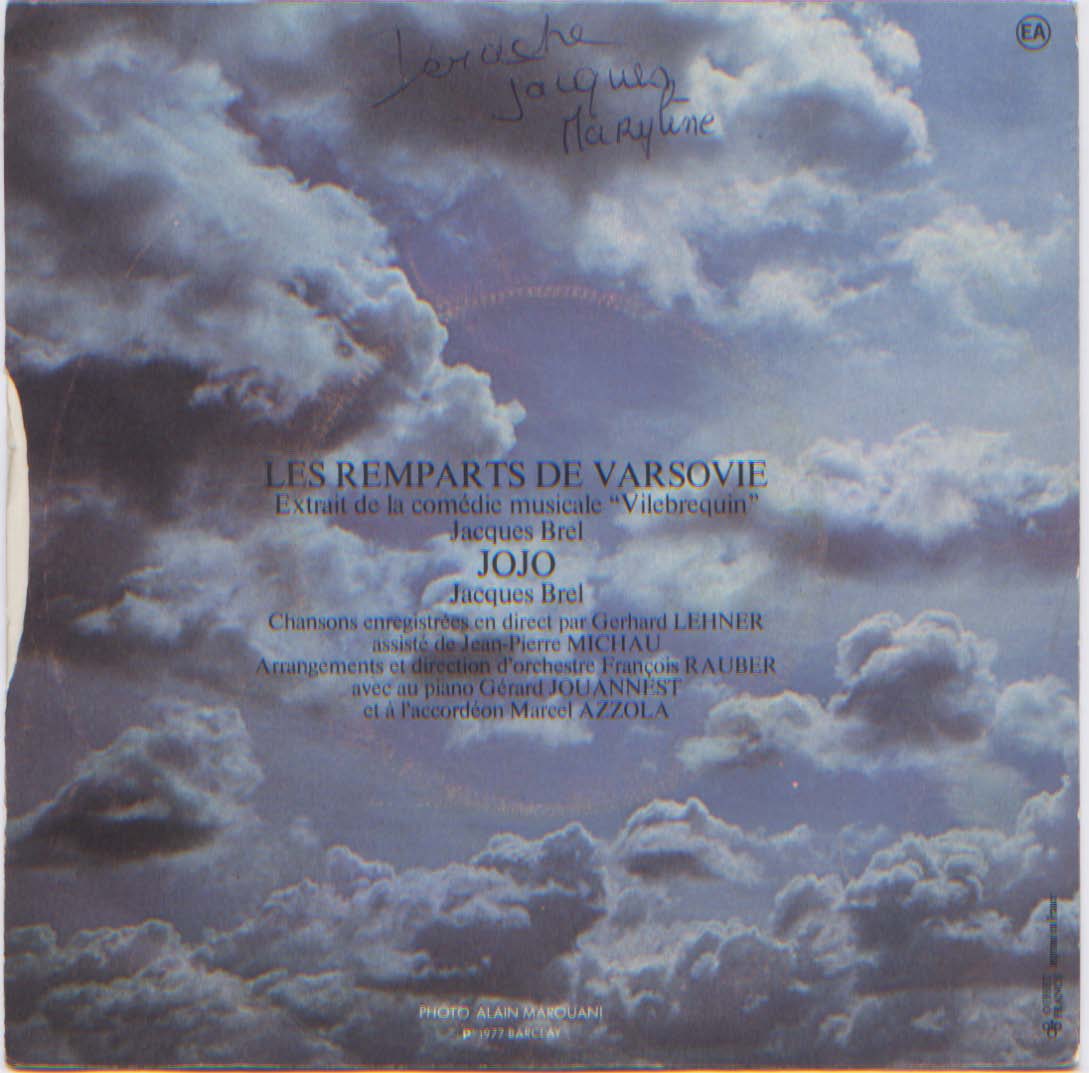 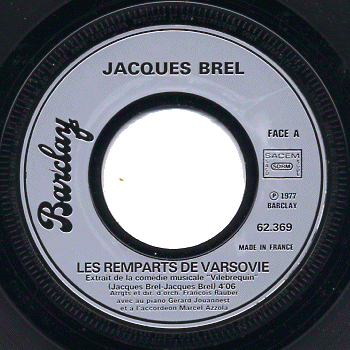 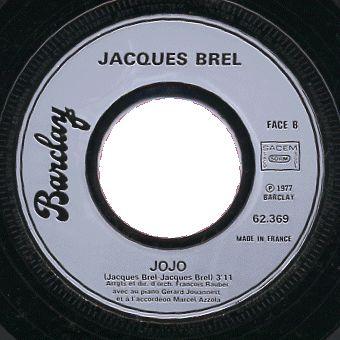 |
75 Barclay 62.376, 1977
A. Mijn vlakke Land 2:56 |
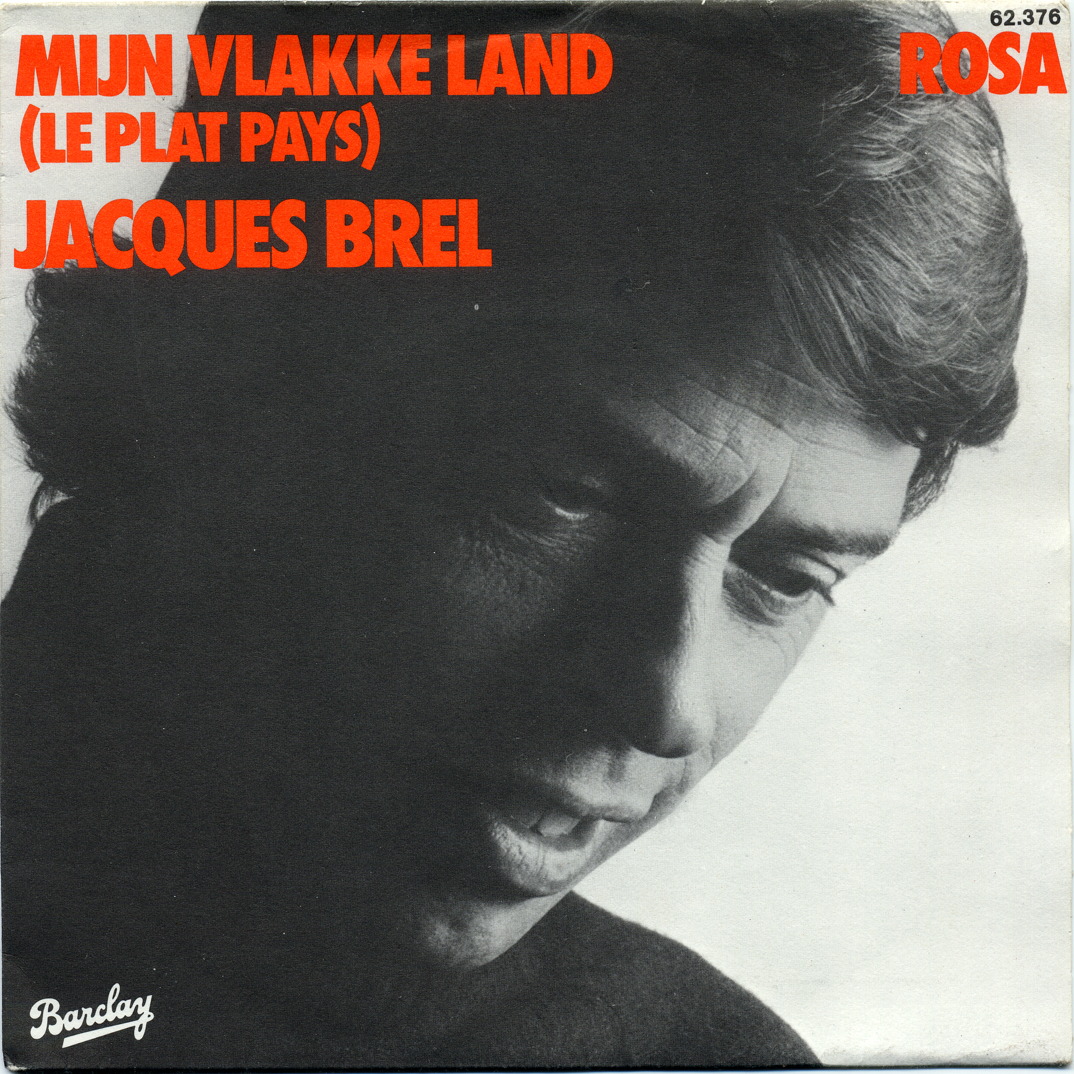 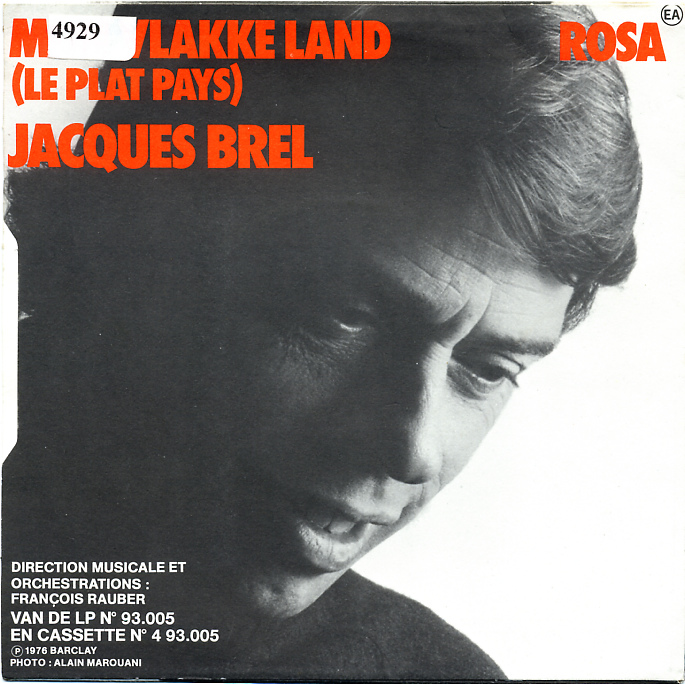 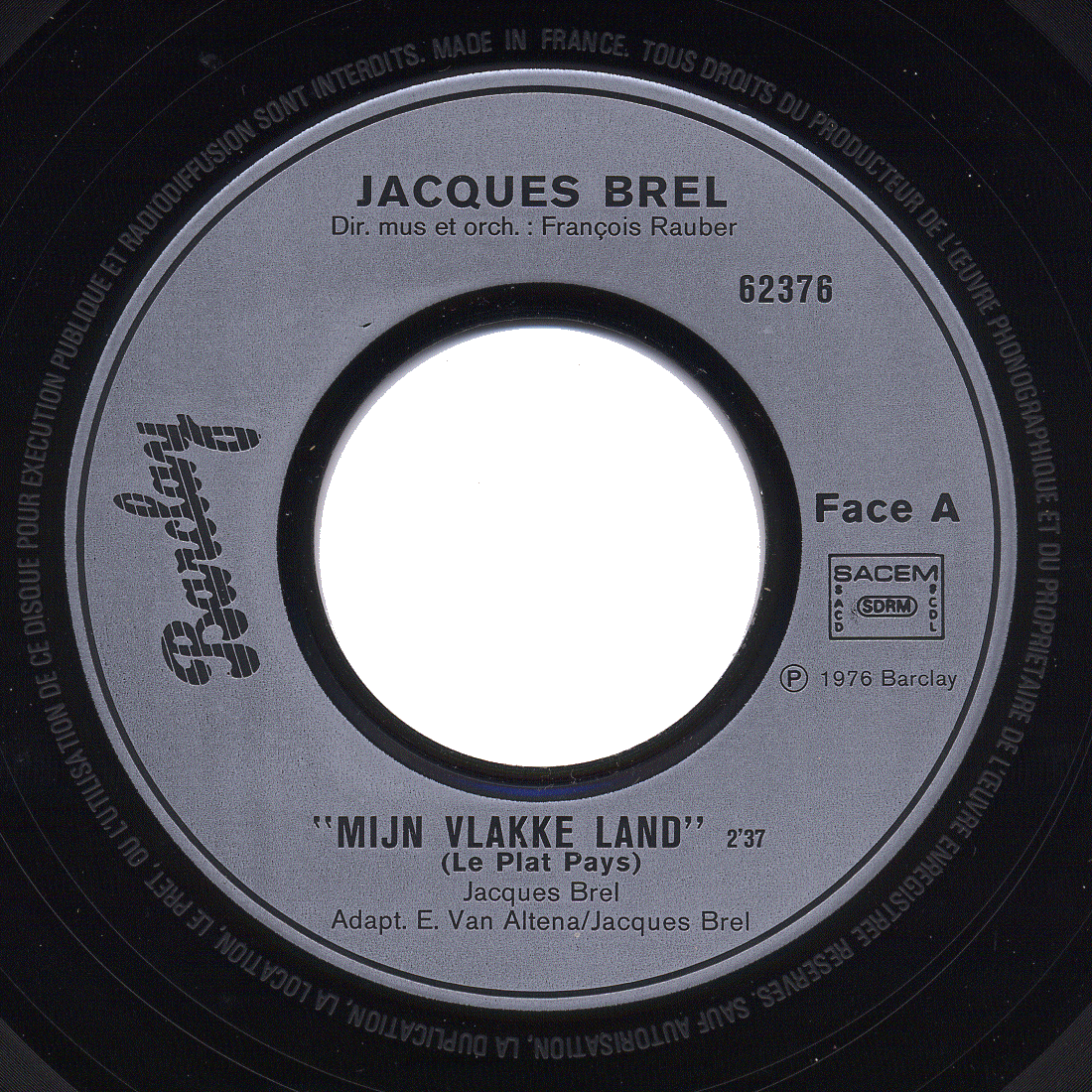 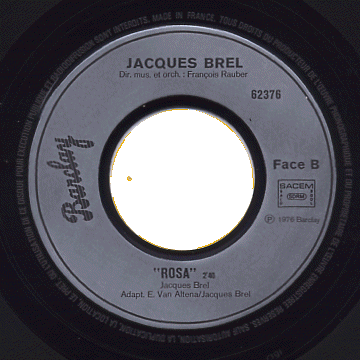
Finally, with this late release of 1977, Barclay succeeded in coupling Mijn vlakke Land in a single with all the other three songs translated in Dutch that Brel recorded in March 1962. The previous singles were 60547 and 60976. This was only a small part of the big marketing campaign that accompanied the release of Brel's last album. |
76 Barclay 62.505, 1978
A. Orly 4:20 |
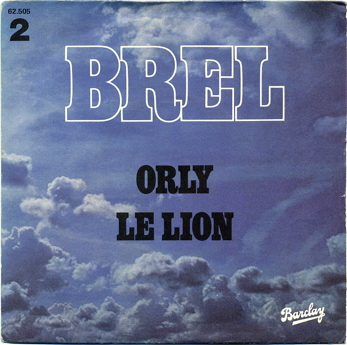 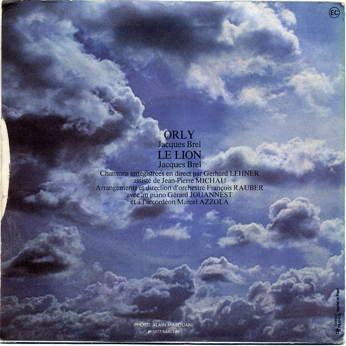 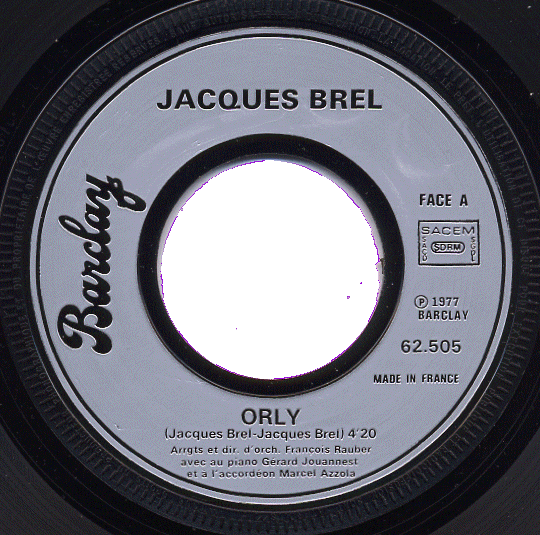 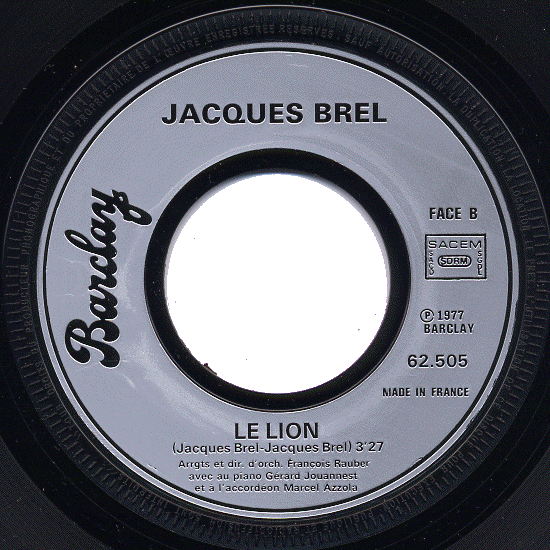 |
77 Barclay 887 824-7, 1988
A. Ne me quitte pas 4:13 #4 |
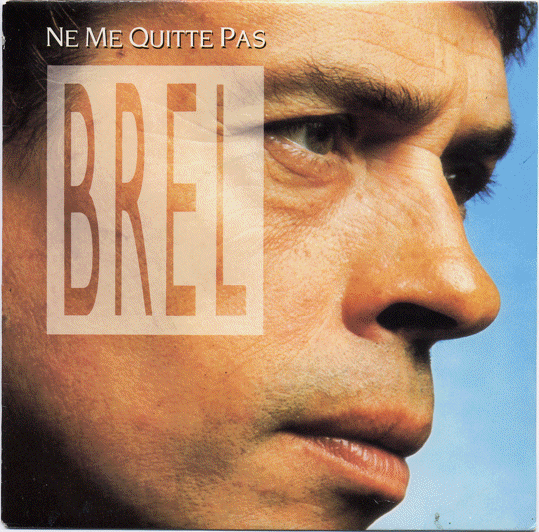 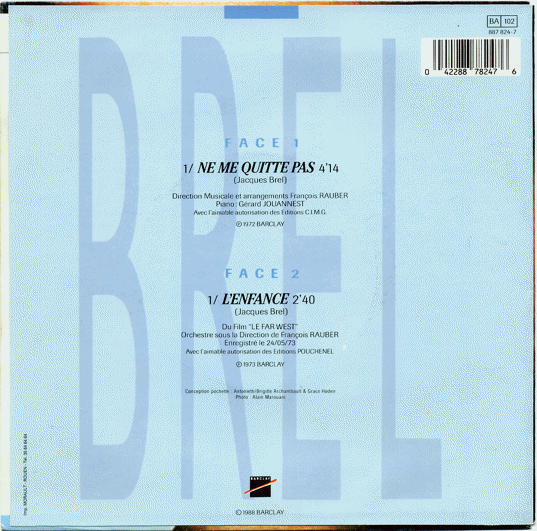 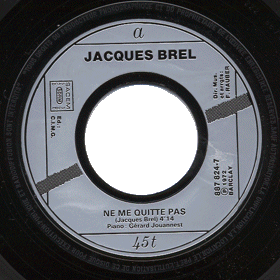 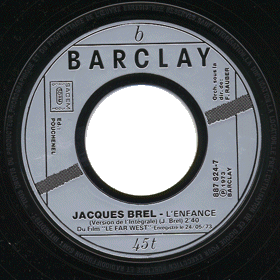
In 1988, probably to commemorate the ten years since Brel's premature departure, Barclay released this single which includes the 1972 version of Ne me quitte pas and L'enfance. A typical non-fascinating object from the dusk of the vinyl era. |
